Ismail Haniyeh
Chief of Political Bureau, former deputy leader of Hamas, Hamas’s former prime minister of Gaza, former prime minister of the Palestinian Authority (deceased)
Hamas is a U.S.-designated terrorist organization which has killed hundreds of Israeli citizens, as well as Americans, in suicide bombings and other terrorist attacks. Hamas has governed the Gaza Strip since it violently expelled the Palestinian Authority in 2007.
March 25, 2024: Hamas launches eight rockets toward Ashdod and Ashkelon in southern Israel. Israel intercepts two of the rockets while the other two fall in open areas. There are no reported injuries or damage. It is the first rocket attack on Ashdod since January 14.“Hamas fires first rocket barrage at Ashdod in more than two months,” Jewish News Syndicate, March 25, 2024, https://www.jns.org/hamas-fires-first-rocket-barrage-at-ashdod-in-over-two-months/; Seth Frantzman, “Hamas launches rockets at major Israeli cities,” Long War Journal, March 25, 2024, https://www.longwarjournal.org/archives/2024/03/hamas-launches-rockets-at-major-israeli-cities.php.
Hamas is an offshoot of the Muslim Brotherhood that emerged in the Gaza Strip in the late 1980s, during the first Palestinian intifada (uprising) against Israel. The group’s ideology blends Islamism and Palestinian nationalism and seeks the destruction of Israel and the creation of an Islamic state between the Mediterranean Sea and the Jordan River.Since 2017, Hamas claims to have severed its ties to the Brotherhood. The group also receives financial and military support from Iran. Qatar has also provided significant funding for the group.
Hamas uses its provision of social services to build support amongst grassroots Palestinians, helping it to win the 2006 Palestinian legislative elections. However, the group’s engagement in politics and welfare has not tempered its commitment to terrorism. Hamas’s preferred methods include suicide bombings, rocket and mortar attacks, shootings, and kidnappings. Hamas as a whole or its armed faction have been labeled terrorist organizations by the United States, Israel, the United Kingdom, the European Union, New Zealand, Australia, and Japan.
Although Hamas formed a Palestinian Authority unity government with its rival Fatah in early 2006, the two groups continued to clash, often violently, leading Hamas to forcibly expel Fatah from the Gaza Strip in 2007. The terror group has ruled Gaza since, surviving on Iranian and Qatari aid, as well as income from the smuggling tunnels it has built beneath the Gaza-Egypt border. In 2013, the Egyptian army sealed off most of the tunnels, throwing Hamas and Gaza into a financial crisis.
Governance did not moderate Hamas. The group has been responsible for thousands of Qassam rockets fired at Israeli towns, a 2006 cross-border raid resulting in the five-year captivity of Israeli soldier Gilad Shalit, and three wars with Israel, most recently in the summer of 2014. In May 2017, Hamas unveiled a new guiding political document that seemingly accepted a Palestinian state in the West Bank, Gaza Strip, and east Jerusalem. In the same document, however, Hamas reaffirmed its refusal to recognize Israel, as well as its commitments to violence and the creation of a Palestinian state in the entirety of the land between the Mediterranean Sea and the Jordan River. In October 2017, Hamas and Fatah agreed to allow the PA to reassert its authority in Gaza, but the two sides have stalled on discussions over Hamas’s weapons.
Hamas has thus far refused to disarm and its leaders have remained committed to the group’s strategy of so-called armed resistance. Despite the new political document and reconciliation agreement with Fatah, Hamas shows no signs of renouncing its dedication to violence or the creation of an Islamist state.
Hamas, the Palestinian offshoot of the Muslim Brotherhood, seeks to create an Islamist state of Palestine between the Mediterranean Sea and the Jordan River, replacing Israel, which Hamas does not recognize. Like its parent organization, the Muslim Brotherhood (and unlike the secular, nationalist PLO), Hamas strives to create an Islamist state based on the principles of sharia (Islamic law). Hamas views the entirety of the land of Mandate Palestine—excluding the 80 percent of Palestine that became modern-day Jordan—as an Islamic birthright that has been usurped. To that end, Hamas does not recognize Israel’s right to exist and has dedicated itself to violently seeking Israel’s destruction. Hamas’s slogan, spelled out in Article 8 of the organization’s 1988 charter, sums up the terror group’s belief system: “Allah is [our] target, the Prophet is [our] model, the Koran [our] constitution: Jihad is [our] path and death for the sake of Allah is the loftiest of [our] wishes."“The Covenant of the Islamic Resistance Movement,” Avalon Project, Yale Law School, August 18, 1988, http://avalon.law.yale.edu/20th_century/hamas.asp.
On May 1, 2017, Hamas unveiled a new political program to supplement its 1988 charter. The so-called Document of General Principles & Policies excised all references to the Muslim Brotherhood and Hamas’s origins in the movement. Hamas accepted in principle the idea of a Palestinian state along the pre-1967 boundaries if approved by a Palestinian national referendum. However, Hamas at the same time reaffirmed its refusal to recognize Israel’s right to exist, and repeated its call for a Palestinian state “from the river to the sea.”“Document of General Principles & Policies,” Hamas, May 1, 2017, http://hamas.ps/en/post/678/a-document-of-general-principles-and-policies. The document also reaffirmed Hamas’s dedication to “armed resistance” as the “strategic choice for protecting the principles and the rights of the Palestinian people.”“Document of General Principles & Policies,” Hamas, May 1, 2017, http://hamas.ps/en/post/678/a-document-of-general-principles-and-policies.
1988 Charter
Hamas’s 1988 charter outlines four important themes crucial to Hamas’s doctrine:
Theme One: Relationship to the Muslim Brotherhood
Hamas is a direct descendent of the Muslim Brotherhood, growing out of the Brotherhood’s activities in Gaza, where it began setting up charitable organizations in the 1960s. Article 2 of the charter describes the Muslim Brotherhood as “a universal organization…. the largest Islamic Movement in modern times.“The Covenant of the Islamic Resistance Movement,” Avalon Project, Yale Law School, August 18, 1988, http://avalon.law.yale.edu/20th_century/hamas.asp. Hamas is “one of the wings of the Moslem Brotherhood in Palestine.”“The Covenant of the Islamic Resistance Movement,” Avalon Project, Yale Law School, August 18, 1988, http://avalon.law.yale.edu/20th_century/hamas.asp. As such, Hamas adheres to an ideology in which Islam dominates all areas of life such as “culture, creed, politics, economics, education, society, justice and judgment, the spreading of Islam, education, art, information, science of the occult and conversion to Islam.”“The Covenant of the Islamic Resistance Movement,” Avalon Project, Yale Law School, August 18, 1988, http://avalon.law.yale.edu/20th_century/hamas.asp.
Theme Two: Palestine
According to Article 11 of the charter, Hamas declares the entirety of pre-1948 Palestine as “an Islamic Waqf [religious endowment] consecrated for future Moslem generations until Judgement Day. It, or any part of it, should not be squandered: it, or any part of it, should not be given up. Neither a single Arab country nor all Arab countries, neither any king or president, nor all the kings and presidents, neither any organization nor all of them, be they Palestinian or Arab, possess the right to do that. Palestine is an Islamic Waqf land consecrated for Moslem generations until Judgement Day.”“The Covenant of the Islamic Resistance Movement,” Avalon Project, Yale Law School, August 18, 1988, http://avalon.law.yale.edu/20th_century/hamas.asp.
Theme Three: Nationalism
For Hamas, nationalism is part of its raison d'être, and it has intertwined nationalism with religious ideology, making it “part of the religious creed.” According to Article 12 of the charter, no need to fight is “more significant or deeper than in the case when an enemy should tread Moslem land.” The resistance and “quelling [of] the enemy become the individual duty of every Moslem, male or female.” The charter even allows for “a woman…. to fight the enemy without her husband's permission, [as well as] the slave: without his master's permission.”“The Covenant of the Islamic Resistance Movement,” Avalon Project, Yale Law School, August 18, 1988, http://avalon.law.yale.edu/20th_century/hamas.asp. Hamas has elevated its actions in support of its nationalist agenda—violent and non-violent alike—to the level of religious obligations. Along these lines, Hamas views its struggle against Israel as a cosmic battle of good (Islam) versus evil (Israel). Hamas’s charter is filled with language defining its mission in religious terms, casting Israel as an enemy of God. Article 28, for example, specifies: “Israel, Judaism and Jews challenge Islam and the Moslem people. ‘May the cowards never sleep.’”“The Covenant of the Islamic Resistance Movement,” Avalon Project, Yale Law School, August 18, 1988, http://avalon.law.yale.edu/20th_century/hamas.asp.
Theme Four: Israel and “armed resistance”
Hamas recognizes the fact that Israel exists, but does not recognize its legitimacy or right to exist. The introduction to the charter quotes Muslim Brotherhood founder Hassan al-Banna as saying “Israel will exist and will continue to exist until Islam will obliterate it, just as it obliterated others before it.”“The Covenant of the Islamic Resistance Movement,” Avalon Project, Yale Law School, August 18, 1988, http://avalon.law.yale.edu/20th_century/hamas.asp. Hamas upholds “armed resistance” as the only method to liberate Palestine. In Article 13 of the charter, Hamas renounces all peace plans or negotiations to resolve the issue of Palestine. Negotiations are a “contradiction to the principles of the Islamic Resistance Movement. Abusing any part of Palestine is abuse directed against [Islam]….”“The Covenant of the Islamic Resistance Movement,” Avalon Project, Yale Law School, August 18, 1988, http://avalon.law.yale.edu/20th_century/hamas.asp.
Hamas’s Changing Strategies
Since Hamas joined the Palestinian Authority in 2006—and subsequently formed an independent government after its violent expulsion of the PA from Gaza – the international community has demanded that in order to gain international recognition, Hamas must renounce violence, recognize Israel, and recognize past agreements signed by the PLO. In a 2007 op-ed in the Los Angeles Times, Hamas’s deputy politburo chief Mousa Abu Marzouk rebuked international demands, asking, “[W]hy should any Palestinian ‘recognize’ the monstrous crime carried out by Israel's founders and continued by its deformed modern apartheid state, while he or she lives 10 to a room in a cinderblock, tin-roof United Nations hut?”Mousa Abu Marzook, “Hamas’ Stand,” Los Angeles Times, July 10, 2007, http://www.latimes.com/la-oe-marzook10jul10,0,4334205.story#axzz2wYFiHYTy. Hamas has remained rigid in its core beliefs, but has demonstrated some flexibility in its positions and strategies.
Hamas’s adherence to its 1988 charter
In his 2007 Los Angeles Times op-ed, Abu Marzouk struck a conciliatory tone regarding Hamas’s charter, referring to it as a revolutionary document that must be looked at in the context of the time when it was written. “If every state or movement were to be judged solely by its foundational, revolutionary documents or the ideas of its progenitors, there would be a good deal to answer for on all sides,” he penned.Mousa Abu Marzook, “Hamas’ Stand,” Los Angeles Times, July 10, 2007, http://www.latimes.com/la-oe-marzook10jul10,0,4334205.story#axzz2wYFiHYTy. While Marzouk’s statement does not entirely annul the charter, it suggests the possibility of a pragmatic path toward moderation in which Hamas is not bound by inflexible dogma.
However, just a year before Marzouk made this remark, Mahmoud Zahar, a co-founder of Hamas, declared that the group would “not change a single word in its covenant.”“Hamas in Their Own Words,” Anti-Defamation League, May 2, 2011, http://www.adl.org/anti-semitism/muslim-arab-world/c/hamas-in-their-own-words.html. Similarly, a senior Hamas leader, Sami Abu Zuhri, stated that the Palestinian legislative council, in preparing for the 2006 elections, would “[adhere] to the constants and strategies outlined in the [Hamas] charter.”“Hamas in Their Own Words,” Anti-Defamation League, May 2, 2011, http://www.adl.org/anti-semitism/muslim-arab-world/c/hamas-in-their-own-words.html.
Hamas’s 2017 political document
On May 1, 2017, Hamas convened a press conference in Qatar to unveil a new policy document, the first since the release of its organizational charter in 1988. The document—a supplement to Hamas’s 1988 charter—omits the original charter’s references to Jews and frames the Palestinian struggle as a nationalistic rather than religious one. Though the document accepts the idea of a Palestinian state along the pre-1967 lines, the charter continues to withhold recognition of the State of Israel. As the document outlines, Hamas continues to embrace “armed resistance” against Israel in its pursuit of the “liberation” of Palestine “from the river to the sea.”“A Document of General Principles & Policies,” Hamas Media Office, accessed May 2, 2017, http://hamas.ps/ar/uploads/documents/06c77206ce934064ab5a901fa8bfef44.pdf;
“New Hamas policy document ‘aims to soften image,’” BBC News, May 1, 2017, http://www.bbc.com/news/world-middle-east-39744551. The document also makes no mention of Hamas’s origins within the Muslim Brotherhood, which the group’s leaders have claimed to disavow. In March 2016, Hamas spokesman Sami Abu Zuhri denied any links between Hamas and the Muslim Brotherhood.Jack Khoury, “Hamas Denies Links With Muslim Brotherhood in Egypt and Elsewhere,” Haaretz, March 23, 2016, http://www.haaretz.com/middle-east-news/.premium-1.710423. Ahead of the document’s release, Hamas leaders said the new document does not replace the original 1988 charter, which remains in effect with its linkage to the Brotherhood.“New Hamas policy document ‘aims to soften image,’” BBC News, May 1, 2017, http://www.bbc.com/news/world-middle-east-39744551.
The potential acceptance of pre-1967 lines
Hamas leaders have suggested that they may be willing to accept a state of Palestine within the areas captured by Israel in 1967 (the Gaza Strip, the West Bank, and East Jerusalem), but without the recognition of Israel. In 2006, Hamas’s Prime Minister Ismail Haniyeh stated that Hamas would accept a temporary Palestinian state within the pre-1967 areas and a 20-year truce with Israel.“Haniyeh Calls for Formation of Palestinian State on 1967 Lines,” Haaretz, December 19, 2006, http://www.haaretz.com/news/haniyeh-calls-for-formation-of-palestinian-state-on-1967-lines-1.207641.
Hamas leaders have alluded to their potential participation in and acceptance of a PLO-Israel peace accord, but only if it were approved by a popular referendum of the Palestinian people. As Hamas and the PLO negotiated their unity deal in June 2014, Hamas spokesman Sami Abu Zuhri declared that while Hamas would continue to not recognize Israel, the group would not “obstruct” any future negotiations between Israel and the PLO.Elhanan Miller, “Hamas: We Will Never Recognize Israel,” Times of Israel, April 27, 2014, http://www.timesofisrael.com/hamas-official-denies-group-could-recognize-israel/.
Hamas’s offers of a temporary truce, or hudna, however, demonstrate that it remains committed to the long-term goal of destroying Israel, and that Hamas sees a Palestinian state as a step in that direction.
Hudna
Hudna is an Arabic word for “truce” or “quiet.” Hamas co-founder Sheikh Ahmed Yassin stated in 2003 that a hudna does not only signify the cessation of terrorist attacks; Israel would also be expected to “release prisoners, stop killing and dismantle settlements.”Saud Abu Ramadan, “Interview: Hamas Head Sheikh Ahmed Yassin,” UPI, June 16, 2003, http://www.upi.com/Business_News/Security-Industry/2003/06/16/Interview-Hamas-head-Sheikh-Ahmed-Yassin/UPI-87751055774665/.
In 2004, Hamas co-founder Abdel Azziz al-Rantisi offered a 10-year hudna in exchange for Israel withdrawing from all the territories captured in 1967, including east Jerusalem, saying: “we accept a state in the West Bank, including Jerusalem, and the Gaza Strip. We propose a 10-year truce in return for (Israeli) withdrawal and the establishment of a state.”Matthew Tostevin, “Israel Scorns Hamas 10-Year Truce Plan,” Reuters, January 26, 2004, http://web.archive.org/web/20040306192510/http://ads.eircom.net/hserver/acc_random=1408048099911/site=eircom/area=news/aamsz=135x57/pos=15. Israel rejected the offer, fearing that Hamas would use the 10-year lull to rearm and Israel, having given up all of the disputed territories, would find itself a victim of renewed Hamas terrorism. Indeed, Rantisi clarified that the hudna offer did not signify an end to the conflict.Matthew Tostevin, “Israel Scorns Hamas 10-Year Truce Plan,” Reuters, January 26, 2004, http://web.archive.org/web/20040306192510/http://ads.eircom.net/hserver/acc_random=1408048099911/site=eircom/area=news/aamsz=135x57/pos=15.
Hamas offered Israel a hudna twice after that: in 2006 then-Prime Minister Ismail Haniyeh offered a 20-year truce for a temporary state in the territories,“Haniyeh Calls for Formation of Palestinian State on 1967 Lines,” Haaretz, December 19, 2006, http://www.haaretz.com/news/haniyeh-calls-for-formation-of-palestinian-state-on-1967-lines-1.207641. and in 2008 then-politburo leader Khaled Meshaal called for a 10-year hudna in exchange for Israel’s evacuation from the territories. Meshaal told former U.S. President Jimmy Carter, that the offer of a 10-year hudna was “proof” of Hamas’s tacit recognition of Israel, while still avoiding any formal recognition of the Jewish state.Associated Press, “Hamas Offers Truce in Return for 1967 Borders,” NBC News, April 21, 2008, http://www.nbcnews.com/id/24235665/ns/world_news-mideast_n_africa/t/hamas-offers-truce-return-borders/#.U-0eFYBdV5w. Despite Israel’s dismissal of the offer as a re-arming strategy for Hamas, Carter accepted the hudna as proof that Hamas had begun to accept Israel’s right to “live as a neighbor next door in peace.”Associated Press, “Hamas Offers Truce in Return for 1967 Borders,” NBC News, April 21, 2008, http://www.nbcnews.com/id/24235665/ns/world_news-mideast_n_africa/t/hamas-offers-truce-return-borders/#.U-0eFYBdV5w.
During the summer of 2015, Hamas and Israel reportedly discussed a long-term ceasefire of 10 to 15 years, according to various reports. Israeli Prime Minister Benjamin Netanyahu denied direct or indirect contacts with Hamas. Former British Prime Minister Tony Blair was reportedly meeting with Hamas to discuss a long-term truce.Khaled Abu Toameh, “Hamas, Fatah spar over peace talks with Tony Blair,” Jerusalem Post, August 13, 2015, http://www.jpost.com/Arab-Israeli-Conflict/Hamas-holds-talks-with-Fatah-on-recent-efforts-to-reach-truce-with-Israel-412048. Fatah condemned Blair’s rumored role and said Hamas should coordinate its ceasefire talks through the PLO.Khaled Abu Toameh, “Hamas, Fatah spar over peace talks with Tony Blair,” Jerusalem Post, August 13, 2015, http://www.jpost.com/Arab-Israeli-Conflict/Hamas-holds-talks-with-Fatah-on-recent-efforts-to-reach-truce-with-Israel-412048.
In September 2017, Hamas co-founder Hassan Yousef told the Jerusalem Post that Hamas was “prepared to make a long-term cease-fire” with Israel in exchange for lifting the blockade of Gaza instituted in 2007.Adam Rasgon, “Hamas Leader to JPost: We’re Ready For Long-Term Ceasefire With Israel,” Jerusalem Post, September 6, 2017, http://www.jpost.com/Arab-Israeli-Conflict/Hamas-leader-to-JPost-Were-ready-for-long-term-cease-fire-with-Israel-504435.
The gun is the ‘only response’
Despite what may be cracks in Hamas’s rigidity, the group remains committed to its foundational goals and the role in which it has cast Israel. In 2013, Haniyeh reaffirmed Hamas’s refusal to compromise or renounce violence, declaring the “gun” the “only response” to Israel.“Haniyeh: No Compromise, Only Armed Resistance,” Jerusalem Post, February 13, 2012, http://www.jpost.com/Middle-East/Haniyeh-No-compromise-only-armed-resistance. He argued that Hamas would obtain its goals “only through fighting and armed resistance,” and that “no compromise should be made with the enemy.”“Haniyeh: No Compromise, Only Armed Resistance,” Jerusalem Post, February 13, 2012, http://www.jpost.com/Middle-East/Haniyeh-No-compromise-only-armed-resistance. In May 2014, just weeks after Hamas and the PLO announced their intention to form a unity government, Abu Marzouk referred to the recognition of Israel as “a red line” that Hamas would never cross.Adnan Abu Amer, “Hamas’ Abu Marzouk Says Recognizing Israel a ‘Red Line,’” Al-Monitor, May 5, 2014, http://www.al-monitor.com/pulseen/originals/2014/05/interview-abu-marzouk-hamas-israel-fatah-reconciliation.html.
Hamas and Fatah signed a reconciliation agreement in October 2017 to allow the PA to reassert its control over Gaza. But the sides delayed negotiation on Hamas’s armed wing. Abbas had demanded that Hamas disarm, while Hamas has insisted it will maintain its weapons.Hamza Hendaqi and Fares Akram, “Palestinian rivals reach preliminary deal on governing Gaza,” Associated Press, October 12, 2017, https://apnews.com/28b183dff81c41cc9e2bbd1e62361b26/Palestinian-rivals-reach-preliminary-deal-on-governing-Gaza;
Dov Lieber, “Translation of leaked Hamas-Fatah agreement,” Times of Israel, October 13, 2017, https://www.timesofisrael.com/translation-of-leaked-hamas-fatah-agreement/;
Dov Lieber, “In deal with Fatah, Hamas said to agree to halt attacks from West Bank,” Times of Israel, October 15, 2017, https://www.timesofisrael.com/in-deal-with-fatah-hamas-said-to-agree-to-halt-attacks-from-west-bank/.
Hamas maintains “all types of legitimate resistance” are acceptable against Israel, including “armed resistance” as a means to an end—the liberation of Palestine.“About Hamas,” Hamas website, accessed August 3, 2021, https://hamas.ps/en/page/5/About-Hamas.
Antisemitism
Hamas asserts its conflict is with the State of Israel, not because they are Jews but because they are occupiers. Hamas claims it “has no problem with anyone because of their religion, race, sect or idea; its key contradiction, however, is with the occupiers and aggressors.”“About Hamas,” Hamas website, accessed August 3, 2021, https://hamas.ps/en/page/5/About-Hamas. Nonetheless, Hamas has a history of embracing and promoting antisemitism. Its 1988 charter reiterates a Quranic call for Muslims to “fight the Jews (killing the Jews)” before the arrival of Judgment Day.“The Covenant of the Islamic Resistance Movement,” Avalon Project, Yale Law School, accessed December 26, 2014, http://avalon.law.yale.edu/20th_century/hamas.asp.
Hamas members have used “Jews” and “Israel” interchangeably. When Hamas unveiled a new dirt road near the Gaza-Israel border in August 2015, Qassam Brigades member Abu Almajd declared, “We built this road in spite of the Jews. Now we are closer to the Jews, only meters between. The Jews’ road is straight, and the Jakar road is straight. We can watch each other during cease-fires and during wars.”Jodi Rudoren, “A Dirt Road in Gaza, Devised by Hamas as a Message to Israel,” New York Times, August 4, 2015, http://www.nytimes.com/2015/08/05/world/middleeast/a-dirt-road-in-gaza-intended-to-send-a-message.html. In July 2014, Hamas’s representative in Lebanon, Osama Hamdan, recalled “how the Jews used to slaughter Christians, in order to mix their blood in their holy matzot. This is not a figment of imagination or something taken from a film. It is a fact, acknowledged by their own books and by historical evidence. It happened everywhere, here and there.”“Top Hamas Official Osama Hamdan: Jews Use Blood for Passover Matzos,” MEMRI, July 28, 2014, https://www.memri.org/tv/top-hamas-official-osama-hamdan-jews-use-blood-passover-matzos. Hamdan later defended his use of the antisemitic blood libel by declaring he had Jewish friends.Sarah Smith, “Hamas aide: ‘I have Jewish friends,’” Politico, August 4, 2014, https://www.politico.com/story/2014/08/hamas-spokesman-osama-hamdan-i-have-jewish-friends-109708. Also that month, a sermon in Gaza’s Deir al-Balah Mosque airing on Hamas’s al-Aqsa TV stated flatly Hamas’s “doctrine in fighting you [the Jews] is that we will totally exterminate you. We will not leave a single one of you alive, because you are alien usurpers of the land and eternal mercenaries. Research the history, my brothers. Wherever the Jews lived, they spread corruption.”Ariel Ben Solomon, “Hamas Invites Hezbollah to Join in Fighting against Israel,” Jerusalem Post, July 30, 2014, http://www.jpost.com/Operation-Protective-Edge/Hamas-invites-Hezbollah-to-join-in-fighting-against-Israel-369379.
When Hamas unveiled its new political document in 2017, it purposely removed all references to Jews from its charter to promote the message that it opposes Israel specifically, not Jews themselves. Hamas spokesman Fawzi Barhoum said the group’s message was it is “a pragmatic and civilized movement. We do not hate the Jews. We only fight who occupies our lands and kills our people.”“New Hamas policy document ‘aims to soften image,’” BBC News, May 1, 2017, https://www.bbc.com/news/world-middle-east-39744551. However, Hamas members continue to include blatant antisemitism in their propaganda. In February 2018, for example, former Hamas official Mustafa al-Lidawi accused Jews of using the blood of non-Jews to prepare pastries for Purim.Juliane Helmhold, “Former Hamas official: Jews use blood of non-Jews to prepare Purim pastry,” Jerusalem Post, March 2, 2018, https://www.jpost.com/arab-israeli-conflict/former-hamas-official-jews-use-blood-of-non-jews-to-prepare-purim-pastry-544048. In July 2019, senior Hamas official and former interior minister Fathi Hamad called on Palestinians around the world to “attack every Jew possible in all the world and kill them.”“Kill all the Jews, says senior Hamas figure,” Times (London), July 16, 2019, https://www.thetimes.co.uk/article/kill-all-the-jews-says-senior-hamas-figure-zvx9jshbb. Hamas later condemned the comments, saying its fight was with Israel and not with worldwide Jewry.“Kill all the Jews, says senior Hamas figure,” Times (London), July 16, 2019, https://www.thetimes.co.uk/article/kill-all-the-jews-says-senior-hamas-figure-zvx9jshbb. Hamad again called for violence against Jews in a speech aired on Al-Aqsa TV in May 2021, when he accused Jews of spreading corruption and urged Arabs in Jerusalem to “cut off the heads of the Jews.”“Senior Hamas Official Fathi Hammad To Palestinians In Jerusalem: Buy 5-Shekel Knives And Cut Off The Heads Of The Jews,” MEMRI, May 7, 2021, https://www.memri.org/tv/snr-hamas-official-fathi-hammad-urges-people-jerusalem-cut-off-heads-jews-knives-day-reckoning-moment-destruction.
Hamas is organizationally split across four sectors: the Gaza Strip, the West Bank, the Palestinian diaspora, and Israeli prisons. These subdivisions are overseen by Hamas’s political bureau, which is led by Ismail Haniyeh. Hamas holds internal elections every four years to elect new leaders to oversee these bureaus, as well as for its overall political leader, local leaders, and the Shura Council, which is responsible for vetting and selecting candidates. These elections take place every four years.“Mapping Palestinian Politics,” European Council on Foreign Relations, accessed August 4, 2021, https://ecfr.eu/special/mapping_palestinian_politics/politburo/; Aaron Boxerman, “Khaled Mashaal tapped as Hamas’s diaspora director,” Times of Israel, April 12, 2021, https://www.timesofisrael.com/khaled-mashaal-tapped-as-hamass-international-director/. Various Hamas leaders have made contradictory claims on whether the group’s military wing, the Izz ad-Din al-Qassam Brigades, operates independently or under the direction of the political bureau.
Political bureau
The bureau is the Hamas’s principal authority. It is headed by Ismail Haniyeh, who took over from Khaled Meshaal in May 2017.Isabel Kershner and Majd Al Waheidi, “Hamas Picks Ismail Haniya as Leader as Power Balance Shifts to Gaza,” New York Times, May 6, 2017, https://www.nytimes.com/2017/05/06/world/middleeast/hamas-leader-ismail-haniya-gaza.html?_r=1. The bureau was previously based in Syria until Hamas leaders fled in 2012, having endorsed the rebellion against Syrian President Bashar al-Assad. Meshaal moved to Qatar, while other Hamas leaders relocated to Egypt.“Hamas Political Chiefs Exit Syria,” BBC News, February 28, 2012, http://www.bbc.co.uk/news/world-middle-east-17192278;
Fares Akram, “In Break, Hamas Supports Syrian Opposition,” New York Times, February 24, 2012, http://www.nytimes.com/2012/02/25/world/middleeast/hamas-leader-supports-syrian-opposition.html?_r=0. In June 2016, Meshaal announced his intention to step down by the end of the year ahead of Hamas’s internal elections.Dov Lieber, “Khaled Mashaal to step down as Hamas leader – report,” Times of Israel, June 15, 2016, http://www.timesofisrael.com/khaled-mashaal-to-step-down-as-hamas-leader-report/. On February 13, 2017, Yahya Sinwar, a founding member of the group’s armed wing, won internal elections to replace Haniyeh as Hamas’s top political leader in Gaza. Hamas also elected lawmaker Khalil al-Hayya as Gaza’s deputy political leader.Fares Akram, “Hamas names shadowy militant as new leader in Gaza,” Associated Press, February 13, 2017, http://bigstory.ap.org/article/9854bb8c51b14fe29f52fb943c07c14a/hamas-names-top-militant-new-leader-gaza;
Rory Jones, “Hamas Puts Militant Yahya Sinwar in Charge of Gaza,” Wall Street Journal, February 13, 2017, https://www.wsj.com/articles/hamas-puts-militant-yahya-sinwar-in-charge-of-gaza-1487001168.
The Shura Council (Majlis al-Shura), Hamas’s central consultative body, is primarily responsible for making decisions. Smaller Shura committees are employed to supervise various government activities anywhere from military operations to media relations, and then report back to the Shura Council.Mathew Levitt, “Playing Hardball Within Hamas,” Washington Institute for Near East Policy, January 6, 2009, http://www.washingtoninstitute.org/policy-analysis/view/political-hardball-within-hamas-hardline-militants-calling-shots-in-gaza. The Shura Council is responsible for vetting and selecting candidates to run in Hamas’s internal elections to run the political bureau. These elections take place every four years.“Mapping Palestinian Politics,” European Council on Foreign Relations, accessed August 4, 2021, https://ecfr.eu/special/mapping_palestinian_politics/politburo/.
Gaza government
Ismail Haniyeh is the former prime minister of Gaza’s Hamas government, responsible for the daily rule of the Gaza Strip since Hamas forcibly expelled the Palestinian Authority (PA) in 2007. In April 2014, Haniyeh stepped down and assumed the role of deputy leader of Hamas as part of a failed reconciliation agreement with the Palestine Liberation Organization.Jodi Rudoren and Isabel Kershner, “Israel Warns Against Embracing Newly Reconciled Palestinian Government,” New York Times, June 1, 2014, http://www.nytimes.com/2014/06/02/world/middleeast/israel-warns-against-embracing-newly-reconciled-palestinian-government.html. As part of that deal, a new PA prime minister, Rami Hamdallah, assumed control of Gaza and the West Bank under a consensus government in June 2014, but the PA has since failed to extend its control over the coastal enclave. Hamas remains firmly in control of Gaza’s government institutions and security services. In October 2016, the Palestinian Legislative Council in Gaza announced that Hamdallah would no longer have authority over Gaza and that Haniyeh would replace him as prime minister.Becca Noy, “Ismail Haniyeh named prime minister in Gaza,” Jerusalem Online, http://www.jerusalemonline.com/news/middle-east/the-arab-world/ismail-haniyehs-comeback-24198;
Ahmad Abu Amer, “Hamas calls for return of Haniyeh government,” Al-Monitor, October 21, 2016, http://www.al-monitor.com/pulse/originals/2016/10/hamas-return-haniyeh-government-gaza.html. On February 13, 2017, Hamas elected Yahya Sinwar as its political chief in the Gaza Strip, replacing Haniyeh ahead of his then-expected ascendency to politburo chief.Fares Akram, “Hamas names shadowy militant as new leader in Gaza,” Associated Press, February 13, 2017, http://bigstory.ap.org/article/9854bb8c51b14fe29f52fb943c07c14a/hamas-names-top-militant-new-leader-gaza;
Rory Jones, “Hamas Puts Militant Yahya Sinwar in Charge of Gaza,” Wall Street Journal, February 13, 2017, https://www.wsj.com/articles/hamas-puts-militant-yahya-sinwar-in-charge-of-gaza-1487001168.
Hamas’s Gaza government has been largely shunned by a large segment of the international community, while it has struggled to pay the salaries of 40,000 municipal workers in the strip.Avi Issacharoff, “As Qatar solves Gaza’s wages crisis, could Hamas have Liberman to thank?,” Times of Israel, July 25, 2016, http://www.timesofisrael.com/as-qatar-solves-gazas-wages-crisis-could-it-be-that-hamas-has-liberman-to-thank/. In 2017, the PA made several moves to pressure Hamas to reconcile. That April, the PA drastically reduced salaries of thousands of civil employees in Gaza.Isra Namey, “Gaza pay cuts deepen rift between PA and Hamas,” Al Jazeera, April 11, 2017, http://www.aljazeera.com/indepth/features/2017/04/gaza-pay-cuts-deepen-rift-pa-hamas-170410101939251.html. PA President Mahmoud Abbas also announced that the PA would no longer pay Israel for the electricity powering the Gaza Strip. As Israel does not engage directly with Hamas, the PA had continued to pay for Israeli electricity to the coastal enclave following Hamas’s violent takeover in 2007. The PA’s announcement threatened to cut power to more than 2 million in Gaza. Hamas accused the PA of collaborating with Israel, while Hamdallah called for Hamas to turn Gaza back over to PA control.Nidal al-Mughrabi, “Abbas turns screws on Hamas by cutting Gaza’s electricity,” Reuters, April 27, 2017, http://www.reuters.com/article/us-palestinians-gaza-abbas-idUSKBN17T1J0. The PA ended its electricity payments to Israel that June, citing Hamas’s failure to reimburse it for the electricity costs.Nidal al-Mughrabi and Jeffrey Heller, “Israel reduces power supply to Gaza, as Abbas pressures Hamas,” Reuters, June 12, 2017, https://www.reuters.com/article/us-israel-palestinians-power/israel-reduces-power-supply-to-gaza-as-abbas-pressures-hamas-idUSKBN1931XK.
In September 2017, Hamas announced its intention to dissolve its government in Gaza and called on the PA to immediately resume responsibility for the Gaza Strip. Hamas agreed to the PA’s demand to hold new parliamentary elections in the West Bank and Gaza for the first time since 2006. The move followed talks in Cairo between Hamas and the Egyptian government.Fares Akram, “Hamas invites Abbas to resume control of Gaza,” Associated Press, September 20, 2017, https://apnews.com/e8438c54e9384220a423bcd33ed7fa5c/Hamas-invites-Abbas-to-resume-control-of-Gaza;
Mohamed Daraghmeh, “Hamas says it accepts reconciliation demands,” Associated Press, September 17, 2017, https://apnews.com/aec26df1cc2740c791033b3637e82d27/Hamas-says-it-accepts-reconciliation-demands;
Dov Lieber, “Abbas talks reconciliation with Hamas leader, but is mum on ending sanctions,” Times of Israel, September 18, 2017, https://www.timesofisrael.com/abbas-talks-reconciliation-with-hamas-leader-but-is-mum-on-ending-sanctions/;
“Press Release issued by Hamas,” Hamas website, September 17, 2017, http://hamas.ps/en/post/965/press-release-issued-by-hamas. That October, Hamas and Fatah signed a reconciliation agreement in Cairo to allow the PA to resume control of Gaza by December 1 and later take control of Gaza’s border crossings. The sides delayed negotiation on Hamas’s armed wing.Hamza Hendaqi and Fares Akram, “Palestinian rivals reach preliminary deal on governing Gaza,” Associated Press, October 12, 2017, https://apnews.com/28b183dff81c41cc9e2bbd1e62361b26/Palestinian-rivals-reach-preliminary-deal-on-governing-Gaza;
Dov Lieber, “Translation of leaked Hamas-Fatah agreement,” Times of Israel, October 13, 2017, https://www.timesofisrael.com/translation-of-leaked-hamas-fatah-agreement/;
Dov Lieber, “In deal with Fatah, Hamas said to agree to halt attacks from West Bank,” Times of Israel, October 15, 2017, https://www.timesofisrael.com/in-deal-with-fatah-hamas-said-to-agree-to-halt-attacks-from-west-bank/.
West Bank
Hamas maintains a regional political bureau that oversees the affairs of Palestinians in the West Bank.“Mapping Palestinian Politics,” European Council on Foreign Relations, accessed August 4, 2021, https://ecfr.eu/special/mapping_palestinian_politics/politburo/. Hamas elected Saleh al-Arouri to a four-year term to lead its West Bank bureau during its 2021 internal elections.Reuters and Jerusalem Post staff, “Haniyeh reelected to lead Hamas in internal elections – report,” Jerusalem Post, August 1, 2021, https://www.jpost.com/breaking-news/haniyeh-reelected-to-lead-hamas-in-internal-elections-report-675521.
Palestinian Diaspora
Hamas maintains a regional political bureau that oversees the affairs of Palestinians in the diaspora.“Mapping Palestinian Politics,” European Council on Foreign Relations, accessed August 4, 2021, https://ecfr.eu/special/mapping_palestinian_politics/politburo/. Hamas elected former political bureau chief Khaled Meshaal to a four-year term as leader of this branch in April 2021. Hamas also elevated Meshaal to position of deputy leader under Haniyeh.Nidal Al-mughrabi, “Hamas elects former chief Meshaal to head diaspora office,” Reuters, April 12, 2021, https://www.reuters.com/world/middle-east/hamas-elects-former-chief-meshaal-head-diaspora-office-2021-04-12/; Aaron Boxerman, “Khaled Mashaal tapped as Hamas’s diaspora director,” Times of Israel, April 12, 2021, https://www.timesofisrael.com/khaled-mashaal-tapped-as-hamass-international-director/.
Prisons
Hamas maintains a regional political bureau that oversees the affairs of Palestinians in Israeli prisons.“Mapping Palestinian Politics,” European Council on Foreign Relations, accessed August 4, 2021, https://ecfr.eu/special/mapping_palestinian_politics/politburo/. Hamas elected Salameh Katawi to a four-year term to lead its prisons bureau during its 2021 internal elections.Reuters and Jerusalem Post staff, “Haniyeh reelected to lead Hamas in internal elections – report,” Jerusalem Post, August 1, 2021, https://www.jpost.com/breaking-news/haniyeh-reelected-to-lead-hamas-in-internal-elections-report-675521.
Izz ad-Din al-Qassam Brigades
The Izz ad-Din al-Qassam Brigades comprise Hamas’s military wing. Created in 1991 with the reported aim to block negotiations between Israel and the PLO, the wing is named after a Muslim preacher who, in 1930, formed the “Black Hand,” an anti-Zionist and anti-British organization.Jack Khoury, “Jabari deputy likely to be Hamas’ next military commander,” Haaretz, November 25, 2012, http://www.haaretz.com/news/diplomacy-defense/jabari-deputy-likely-to-be-hamas-next-military-commander.premium-1.480253; “Hamas’ Izz al-Din al-Qassam Brigades,” Australian National Security, accessed August 5, 2021, https://www.nationalsecurity.gov.au/Listedterroristorganisations/Pages/HamassIzzal-Dinal-QassamBrigades.aspx. The stated goal of the Qassam Brigades is: “To contribute in the effort of liberating Palestine and restoring the rights of the Palestinian people.”“About Us,” Ezzedeen Al-Qassam Brigades, accessed August 5, 2021, https://en.alqassam.ps/page/1. Qassam Brigades leader Mohammad Deif is widely suspected of having ordered suicide bombings and other attacks carried out by the Brigades.Martin Asser, “Profile: Hamas Commander Mohammed Deif,” BBC News, September 26, 2002, http://news.bbc.co.uk/2/hi/middle_east/2284055.stm. The Qassam Brigades claim to work as independent cells organized throughout the Gaza Strip and West Bank.“About Us,” Ezzedeen Al-Qassam Brigades, accessed August 5, 2021, https://en.alqassam.ps/page/1.
Political scientists Ilana Kass and Bard O'Neill described Hamas’s relationship with the Brigades as reminiscent of Sinn Féin's relationship to the military arm of the Irish Republican Army, quoting a senior Hamas official who said, “The Izz al-Din al-Qassam Brigade is a separate armed military wing, which has its own leaders who do not take their orders [from Hamas] and do not tell us of their plans in advance.”Ilana Kass and Bard E. O'Neill, The Deadly Embrace: The Impact of Israeli and Palestinian Rejectionism on the Peace Process (Lanham: University Press of America, 1997), 267. However, senior Hamas leaders have themselves pointed out that a neat separation between the political and military wing does not exist. Hamas's founder Sheikh Ahmad Yasin stated in an interview with Reuters that Hamas did not have uncoordinated wings: “we cannot separate the wing from the body. If we do so, the body will not be able to fly. Hamas is one body.”Matthew Levitt, “Hamas from cradle to grave,” Middle East Quarterly, Winter 2004, http://www.meforum.org/582/hamas-from-cradle-to-grave. This view was supported by Hamas military commander Salah Shehadeh, who said: “the political apparatus is sovereign over the military apparatus, and a decision of the political [echelon] takes precedence over the decision of the military [echelon], without intervening in military operations.”Matthew Levitt, “Hamas from cradle to grave,” Middle East Quarterly, Winter 2004, http://www.meforum.org/582/hamas-from-cradle-to-grave.
Deif has survived two assassination attempts, leaving him wheelchair-bound after losing his arms and legs in a July 2006 Israeli airstrike, as well as an eye in a September 2002 helicopter strike. Deif has since gone into hiding, and his deputy, Ahmad Jabari, took over the Brigades’ leadership, with Deif remaining as the group’s figurehead. Jabari was himself killed by an Israeli strike in November 2012, marking the beginning of Israel’s Operation Pillar of Defense. Israeli authorities suspect that Deif resumed command of the Brigades after Jabari’s death and that he was responsible for ordering the terrorist rocket fire attacks launched during Israel’s summer 2014 conflict with Hamas.Elhanan Miller, “Is Prime Israel Target Muhammad Deif Overseeing Hamas’s Strategy?” Times of Israel, July 23, 2014, http://www.timesofisrael.com/is-prime-israel-target-muhammad-deif-overseeing-hamass-strategy/.
Membership estimates of the Qassam Brigades range from several thousand to 27,000.“Hamas’ Izz al-Din al-Qassam Brigades,” Australian National Security, accessed August 5, 2021, https://www.nationalsecurity.gov.au/Listedterroristorganisations/Pages/HamassIzzal-Dinal-QassamBrigades.aspx. Hamas had an estimated 20,000 fighters, with another 20,000 in its police and security forces.Yasmine Saleh, “Exclusive: With Muslim Brotherhood Crushed, Egypt Sets Sights on Hamas,” Reuters, January 14, 2014, http://www.reuters.com/article/2014/01/14/us-egypt-gaza-idUSBREA0D09D20140114. Following the 2014 reconciliation agreement between Hamas and the PLO, it was revealed that some 25,000 Hamas employees in Gaza work in the security services, and that a majority of them belong to the Qassam Brigades.Adnan Abu Amer, “Hamas Not Giving up Military Wing, despite Agreement,” Al-Monitor, May 2, 2014, http://www.al-monitor.com/pulseen/originals/2014/05/qassam-weapons-hamas-fatah-reconciliation.htm. According to one Qassam official, these employees would take orders from the Brigades—and not the Ministry of Interior—after the formation of a unity government with the PLO.Adnan Abu Amer, “Hamas Not Giving up Military Wing, despite Agreement,” Al-Monitor, May 2, 2014, http://www.al-monitor.com/pulseen/originals/2014/05/qassam-weapons-hamas-fatah-reconciliation.htm.
In the six years following Israel’s 2005 withdrawal from the Gaza Strip, Hamas’s budget reportedly grew from $40 million to $540 million.“Report: 13-fold increase in Hamas budget since 2005,” Ma’an News Agency, last updated April 24, 2011, http://www.maannews.com/Content.aspx?id=381277. Hamas’s budget in 2013 was more than $700 million, with $260 million earmarked to the administrative costs of running Gaza.Nidal al-Mughrabi, “Isolated Hamas Faces Money Crisis in Gaza Strip,” Reuters, October 9, 2013, http://www.reuters.com/article/2013/10/09/us-palestinian-hamas-crisis-idUSBRE99804P20131009. In 2014, the Hamas government in Gaza signed a reconciliation agreement with the Palestinian Authority (PA) that called for the Hamas government to dissolve and for the PA to reassert control. The Hamas government’s budget prior to its dissolution was reportedly $530 million. As of 2016, Hamas reportedly had an approximate military budget of $100 million, with $40 million specifically earmarked for construction of tunnels beneath the Gaza-Israel border.Avi Issacharoff, “Hamas spends $100 million a year on military infrastructure,” Times of Israel, September 8, 2016, https://www.timesofisrael.com/hamas-spends-100-million-a-year-on-military-infrastructure/.
Hamas has since become more financially isolated as the Palestinian Authority began imposing financial sanctions on Gaza in 2017 in a bid to convince Hamas to turn over total control of the coastal enclave. As a result, Hamas has struggled to pay its municipal and military employees.Adnan Abu Amer, “Salary saga continues for PA employees in Gaza,” Al-Monitor, April 10, 2019, https://www.al-monitor.com/pulse/originals/2019/04/palestinian-authority-salaries-employees-hamas-government.html. Hamas has relied heavily on Qatari aid to pay its municipal salaries. By 2023, Hamas reportedly paid approximately $34.5 million per month in salaries, largely relying on international donors to cover the expense. As of July 2023, however, Hamas reportedly was unable to pay its 50,000 municipal employees because of delays in a monthly payroll grant from Qatar.Nidal Al-Mughrabi, “Hamas unable to pay salaries in Gaza after Qatari aid delay, officials say,” Reuters, July 16, 2023, https://www.reuters.com/world/middle-east/hamas-unable-pay-salaries-gaza-after-qatari-aid-delay-officials-say-2023-07-16/.
To fill its coffers and fund its administrative and terrorist activities, Hamas turns to several sources: funding, weapons, and training from Iran; donations from the Palestinian global diaspora;“Country Reports on Terrorism,” U.S. Department of State, accessed June 24, 2014, http://www.state.gov/j/ct/rls/crt/2007/103714.htm. and fundraising activities in Western Europe and North America.“Country Reports on Terrorism,” U.S. Department of State, accessed June 24, 2014, http://www.state.gov/j/ct/rls/crt/2007/103714.htm. Hamas has also sought to use Palestinian businesses to collect and transfer money. In June 2021, for example, Israeli authorities raided two money-exchange companies in the West Bank—the Beit Al-Maqdes Company in Tulkarm and the Marish Company for Money Exchange in Hebron—accused of transferring money to Hamas. According to Israeli authorities, the two companies transferred approximately $410,000 to Hamas members in the West Bank. According to authorities, the businesses collected the funds from Palestinian businesses in the West Bank. Hamas has also allegedly used money-exchange companies in Gaza to transfer money from Iran.Ahmed Melhem, “Israel raids exchange companies for allegedly transferring funds to Hamas,” Al-Monitor, June 21, 2021, https://www.al-monitor.com/originals/2021/06/israel-raids-exchange-companies-allegedly-transferring-funds-hamas.
Charities
Global charities affiliated with Hamas collect donations on its behalf. These charities operate in countries that label Hamas a terrorist organization, and are often themselves designated as terrorist organizations when exposed by authorities. For example, Ottawa labeled the Canadian charity International Relief Fund for the Afflicted and Needy a terrorist organization, and launched a “terrorist financing investigation,” which revealed the organization’s funneling of approximately $14.6 million worth of resources to various groups affiliated with Hamas between 2005 and 2009.Olivia Ward, “Canadian Charity with Alleged Ties to Hamas Listed as ‘terrorist’ Organization,” Toronto Star, April 29, 2014, http://www.thestar.com/news/world/2014/04/29/canadian_muslim_charity_listed_as_terrorist_organization.html.
On December 6, 2001, the United States froze the funds of the Holy Land Foundation, then the largest Muslim charity in the United States. Following a long investigation by the FBI into the activities of the organization, five of its leaders were convicted on charges of funneling money and supplies to Hamas. Hamas had previously been designated a Foreign Terrorist Organization in the United States. According to the findings of the court, the charity, which was set up in the 1980s, gave millions of dollars to charities in Gaza and the West Bank, which were Hamas social institutions.Terry Baynes, “Muslim charity leaders lose appeal in Hamas case,” Reuters, December 7, 2011, http://www.reuters.com/article/2011/12/08/us-crime-hamas-idUSTRE7B707L20111208. According to an FBI report of a bugged meeting of the foundation, the then-head of the American political arm of Hamas, Mousa Abu Marzouk, stated that the Holy Land Foundation was the “primary fund-raising entity in the United States” of the Palestinian resistance movement.Glenn R. Simpson, “Holy Land Foundation Allegedly Mixed Charity Money With Funds for Bombers,” Wall Street Journal, February 27, 2002, http://online.wsj.com/news/articles/SB101476025597651120.
During the Second Intifada, Middle East charities created by Saudi Arabia, Lebanon, and other governments collected and funneled millions of dollars to Hamas and other terror organizations for so-called martyr payments.Josh Lipowsky, “‘A Way to Thwart Their Funding,’” Jewish Standard, August 1, 2014, http://jstandard.com/index.php/content/item/a_way_to_thwart_their_funding/. A group of terror victims’ families took the Jordan-based Arab Bank to task for facilitating funding to Hamas terrorists through these “charities” in the first civil case against a financial institution accused of violating the U.S. Anti-Terrorism Act. On September 22, 2014, after a 10-year legal process, a U.S. jury found Arab Bank liable for helping finance about two dozen Hamas suicide bombings.Erik Larson and Christie Smythe, “Arab Bank Found Liable for Hamas Terrorist Attacks,” Bloomberg, September 23, 2014, http://www.bloomberg.com/news/2014-09-22/arab-bank-found-liable-for-hamas-terrorist-attacks.html.
Taxes and the tunnel economy
Hamas has spent years building a network of tunnels beneath the Gazan-Egyptian border in order to smuggle weapons and other goods. According to a 2012 Journal of Palestine Studies report, at least 160 children have died while digging the elaborate tunnel system.Nicolas Pelham, “Gaza’s Tunnel Phenomenon: The Unintended Dynamics of Israel’s Siege,” Journal of Palestine Studies 41, no. 4 (Summer 2012), http://palestine-studies.org/jps/fulltext/42605. The underground smuggling tunnels between Gaza and Egypt has provided Hamas with a flow of tax revenue on smuggled goods, comprising roughly $500 million of Hamas’s annual budget for Gaza of just under $900 million. The Egyptian military closed the tunnels in late 2013 after it deposed the Muslim Brotherhood government, sending Gaza into an economic crisis.Karin Laub and Ibrahim Barzak, “Hamas in Worst Cash Crisis since Seizing Gaza,” Associated Press, March 13, 2014, http://news.yahoo.com/hamas-worst-cash-crisis-since-seizing-gaza-181239758.html.
Constructing the tunnels was not a cheap endeavor, as each tunnel is believed to have cost between $80,000 and $200,000. To pay for the tunnels’ construction, Hamas turned to Gazan-based mosques and charities, which reportedly began offering pyramid schemes to invest in the tunnels with high rates of return. The number of tunnels reportedly grew from a few dozen in 2005, with annual revenue of $30 million per year, to at least 500 by December 2008, with annual revenue of $36 million per month.Nicolas Pelham, “Gaza’s Tunnel Phenomenon: The Unintended Dynamics of Israel’s Siege,” Journal of Palestine Studies 41, no. 4 (Summer 2012), http://palestine-studies.org/jps/fulltext/42605.
By October 2013, Egypt claimed to have destroyed 90 percent of Gaza’s smuggling tunnels. According to Ala al-Rafati, the Hamas-appointed economy minister, the resulting losses to the Gaza economy between June and October 2013 amounted to $460 million.Nidal al-Mughrabi, “Isolated Hamas Faces Money Crisis in Gaza Strip,” Reuters, October 9, 2013, http://www.reuters.com/article/2013/10/09/us-palestinian-hamas-crisis-idUSBRE99804P20131009.
Cryptocurrencies
Hamas seeks to bypass international financial sanctions through the use of cryptocurrencies, the movement of which is harder to trace than traditional currencies.Nathaniel Popper, “Terrorists Turn to Bitcoin for Funding, and They’re Learning Fast,” New York Times, August 18, 2019, https://www.nytimes.com/2019/08/18/technology/terrorists-bitcoin.html. The Qassam Brigades website provides an animated instructional video on how to create a Bitcoin wallet—the decentralized digital method of storing Bitcoins—and make an anonymous donation to Hamas that cannot be traced by authorities. The site is available in multiple languages, including English, Arabic, French, and Russian.Ezzedeen AlQassam Brigades website, accessed August 20, 2019, https://fund.alqassam.net/. To further avoid detection, Hamas’s website generates links to individual Bitcoin wallets—making each transaction unique—on its site instead of using a cryptocurrency exchange, which can be more easily tracked by authorities.Nathaniel Popper, “Terrorists Turn to Bitcoin for Funding, and They’re Learning Fast,” New York Times, August 18, 2019, https://www.nytimes.com/2019/08/18/technology/terrorists-bitcoin.html.
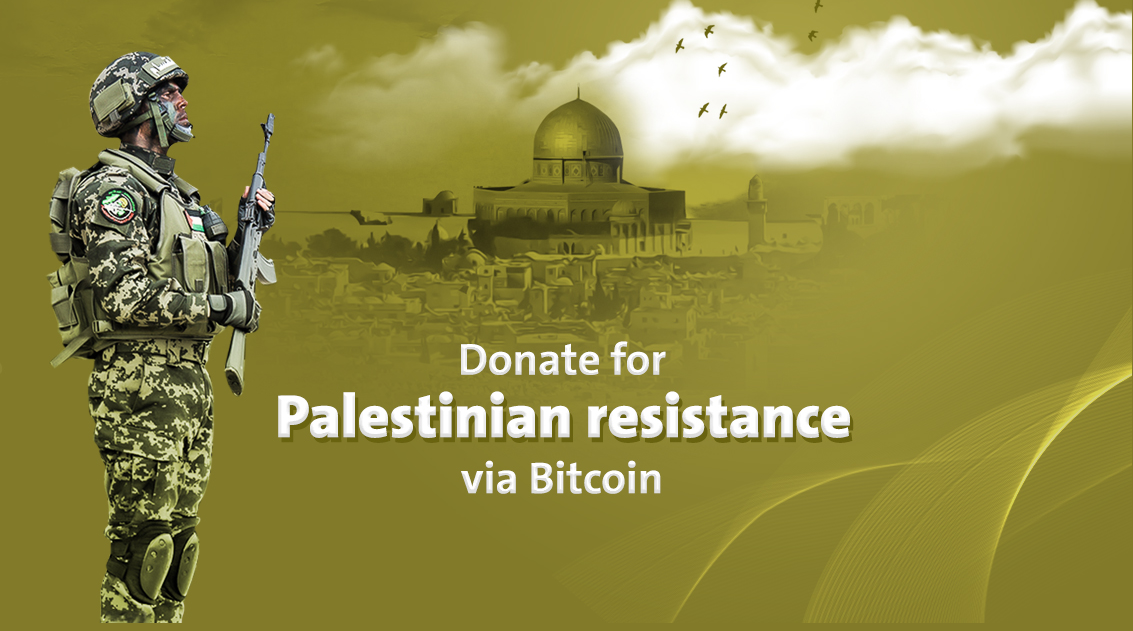
Screenshot of the Qassam Brigades website. August 20, 2019.
In 2019, the Qassam Brigades created a portal on its website to collect donations through the cryptocurrency Bitcoin.Ezzedeen AlQassam Brigades website, accessed August 20, 2019, https://www.qassam.ps/. In May 2019, U.S. authorities arrested a New Jersey man who had sent a donation of $20 in Bitcoin through the Qassam Brigades’ website in April 2019, two months after explaining how the site worked to an undercover FBI agent. The suspect had previously sent $100 to a Hamas member in Gaza via the wire transfer service Moneygram.“Somerset County Man Charged With Attempts To Provide Material Support To Hamas, Making False Statements, And Making Threat Against Pro-Israel Supporters,” U.S. Attorney’s Office, District of New Jersey, May 22, 2019, https://www.justice.gov/usao-nj/pr/somerset-county-man-charged-attempts-provide-material-support-hamas-making-false. According to terrorism experts and the U.S. Treasury, Bitcoin is a small but growing medium for terror financing.Nathaniel Popper, “Terrorists Turn to Bitcoin for Funding, and They’re Learning Fast,” New York Times, August 18, 2019, https://www.nytimes.com/2019/08/18/technology/terrorists-bitcoin.html. In August 2020, U.S. authorities seized more than $1 million in cryptocurrency assets linked to Hamas’s armed wing. Hamas allegedly saw a surge in bitcoin donations during and after its 11-day conflict with Israel in May 2021. Between May 10 and May 20 that year, the Qassam Brigades’ website, alqassam.ps, saw an increase in traffic and engagement. During the same period, the Qassam Brigades’ Telegram channel increased by 261,000 followers. Following the May 2021 conflict, one Hamas senior official claimed a continuous rise in the proportion of cryptocurrency in Hamas’s finances.Benoit Faucon, Ian Talley, and Summer Said, “Israel-Gaza Conflict Spurs Bitcoin Donations to Hamas,” Wallstreet Journal, June 2, 2021, https://www.wsj.com/articles/israel-gaza-conflict-spurs-bitcoin-donations-to-hamas-11622633400; Dylan Tokar, “U.S. Seizes Fake Website, Cryptocurrency Assets From Terrorist Groups,” Wall Street Journal, August 13, 2020, https://www.wsj.com/articles/u-s-seizes-fake-website-cryptocurrency-assets-from-terrorist-groups-11597343549. Israel began seizing digital cryptocurrency wallets belonging to Hamas in July 2021.“Israel says it’s targeting Hamas’ cryptocurrency accounts,” Associated Press, July 8, 2021, https://apnews.com/article/hamas-middle-east-israel-cryptocurrency-business-5fe4e70d357545ffd22a152eb4358980.
Foreign investors
Iran
Iran has provided hundreds of millions of dollars to Hamas since the 1990s. In the U.S. case Weinstein v. Iran, the court noted that 1995-1996 “was a peak period for Iranian economic support of Hamas because Iran typically paid for results, and Hamas was providing results by committing numerous bus bombings such as the one on February 25, 1996.”Matthew Levitt, “Hezbollah Finances: Funding the Party of God,” Washington Institute for Near East Policy February 2005, http://www.washingtoninstitute.org/policy-analysis/view/hezbollah-finances-funding-the-party-of-god.
After Hamas’s victory in the 2006 Palestinian legislative elections, Iran provided Hamas an estimated £13-15 million a month for governing expenses.Robert Tait, “Iran Cuts Hamas Funding over Syria,” Telegraph [U.K.], May 31, 2013, http://www.telegraph.co.uk/news/worldnews/middleeast/palestinianauthority/10091629/Iran-cuts-Hamas-funding-over-Syria.html. However, Iranian aid to Hamas has decreased since the outbreak of the Syrian civil war. While Iran has sided with the embattled Assad regime, Hamas has supported Syrian rebels seeking to overthrow Assad. As a result, Iran cut as much as £15 million a month to Hamas. In May 2013, Hamas’s deputy foreign minister Ghazi Hamad acknowledged that Iran had financially supported Hamas since 2006, but was sending the group only a “tiny amount” of money to maintain ties to the Palestinian cause.Robert Tait, “Iran Cuts Hamas Funding over Syria,” Telegraph [U.K.], May 31, 2013, http://www.telegraph.co.uk/news/worldnews/middleeast/palestinianauthority/10091629/Iran-cuts-Hamas-funding-over-Syria.html. By March 2014, Iranian parliament speaker Ali Larijani said that relations between Hamas and Iran had returned to normal and that Iran continued to support Hamas as a “resistance organization.”Elhanan Miller, “Hamas and Iran Admit Increased Cooperation,” Times of Israel, March 12, 2014, http://www.timesofisrael.com/hamas-and-iran-admit-increased-cooperation/.
Senior Hamas leader Moussa Abu Marzouk said in July 2015, however, that all Iranian aid to Hamas “has stopped—both civilian aid to the Gaza Strip and military assistance to Hamas.”Jack Moore, “Iran Ceases Financial Aid to Hamas in Gaza, Officials Claim,” Newsweek, July 28, 2015, http://europe.newsweek.com/iran-ceases-financial-aid-hamas-gaza-official-claims-330889?rx=us. Marzouk said that relations between Hamas and Iran had not advanced in a direction that “interested” Hamas and accused Iranian officials later that month of lying about their support.“Iran has stopped giving money to Hamas, top official says,” Times of Israel, July 28, 2015, http://www.timesofisrael.com/iran-has-stopped-giving-us-money-top-hamas-official-says/. According to Marzouk, Hamas had not received any Iranian money since 2009.“Hamas slams Iranian ‘lies’ of financial, military support,” i24News, January 31, 2016, http://www.i24news.tv/en/news/international/middle-east/101236-160131-hamas-slams-iranian-lies-about-financial-military-support.
Hamas and Iran reportedly renewed their financial ties in 2017. That August, Hamas’s political leader in Gaza, Yahya Sinwar, deemed the restored relationship as “excellent, or very excellent.”Fares Akram and Josef Federman, “New Hamas leader says it is getting aid again from Iran,” Associated Press, August 28, 2017, https://apnews.com/0427f88fe857479caa633fad5683aa96/New-Hamas-leader-says-it-is-getting-aid-again-from-Iran. Sinwar also called Iran the “largest backer financially and militarily” of Hamas.“Hamas leader in Gaza: Ties with Iran now ‘fantastic’; we’re preparing battle for Palestine,” Times of Israel, August 28, 2017, http://www.timesofisrael.com/hamas-leader-in-gaza-ties-with-iran-now-fantastic-were-preparing-battle-for-palestine/.
As of August 2018, Iran reportedly transferred $70 million annually to Hamas.Elior Levy, “Iran's $100 million aid to Hamas and Islamic Jihad,” Ynet News, August 3, 2018, https://www.ynetnews.com/articles/0,7340,L-5321985,00.html. Israeli authorities reported in August 2019 that Iran was increasing its funding to Hamas to $30 million per month in order to obtain more intelligence on Israel’s missile stockpiles.Michael Bachner and staff, “Iran said increasing Hamas funding to $30m per month, wants intel on Israel,” Times of Israel, August 5, 2019, https://www.timesofisrael.com/iran-agrees-to-increase-hamas-funding-to-30-million-per-month-report/. In November 2018, U.S. Special Envoy on Iran Brian Hook announced U.S. intentions to target Iran’s funding of Hamas and Hezbollah as part of a series of renewed sanctions on Iran.Herb Keinon, “U.S. Envoy: Iran Sanctions Help Cut Streams to Hamas and Hezbollah,” Jerusalem Post, November 15, 2018, https://www.jpost.com/Arab-Israeli-Conflict/US-envoy-Iran-sanctions-help-to-cut-fund-streams-to-Hamas-and-Hezbollah-571980.
Iran’s support of Hamas has since continued. Ahead of Hamas’s 11-day conflict with Israel in May 2021, Hamas leader Ismail Haniyeh wrote to Iranian Supreme Leader Ali Khamenei asking the Muslim world to support Hamas.Tzvi Joffre, “Jerusalem Day festivities shaken by rockets, violent riots,” Jerusalem Post, May 10, 2021, https://www.jpost.com/breaking-news/jerusalem-day-riots-break-out-on-temple-mount-667735; “Palestinians say nine killed in Israeli strikes in the Gaza Strip,” Jerusalem Post, May 10, 2021, https://www.jpost.com/israel-news/israel-striking-gaza-in-response-to-rocket-barrage-directed-at-jerusalem-667776; “Hamas chief writes to Leader, asks Muslim world to support al-Quds,” Tehran Times, May 9, 2021, https://www.tehrantimes.com/news/460758/Hamas-chief-writes-to-Leader-asks-Muslim-world-to-support-al-Quds. During a July 2021 speech to Christians United For Israel, former U.S. Ambassador to the United Nations Nikki Haley declared that during that conflict Israel not only fought against Hamas, but “against Iranian weapons, Iranian money and Iranian trained terrorists.”Jacob Kornbluh, “Nikki Haley: ‘Iran is the sugar daddy of Hamas,’” Forward, July 18, 2021, https://forward.com/fast-forward/473134/nikki-haley-iran-is-the-sugar-daddy-of-hamas/. As such, Haley referred to Iran as “the sugar daddy of Hamas.”Jacob Kornbluh, “Nikki Haley: ‘Iran is the sugar daddy of Hamas,’” Forward, July 18, 2021, https://forward.com/fast-forward/473134/nikki-haley-iran-is-the-sugar-daddy-of-hamas/.
On July 12, 2021, the U.S. District Court for the District of Columbia found Iran, Syria, the IRGC, the Iranian Ministry of Intelligence and Security, and three Iranian banks—Markazi, Melli, and Saderat—liable for an October 1, 2015, Hamas terror attack that killed Israeli-American Eitam Henkin and his wife, Naama, in the West Bank. The orphaned Henkin children and the Henkins’ estate filed the lawsuit in 2019 under the terrorism exception to the U.S. Foreign Sovereign Immunities Act. The ruling was the first time a U.S. court found Markazi, Melli, or Saderat liable for a terror attack by a foreign terrorist organization against a U.S. national.Globe Newswire, “In Historic Ruling, Court Finds Iran, Syria and Iranian Banks Responsible for Murder of American Citizen in Israel,” Yahoo News, July 13, 2021, https://finance.yahoo.com/news/historic-ruling-court-finds-iran-182600941.html; “US court: Iran, Syria liable for deaths of Israeli couple in 2015 terror attack,” Times of Israel, July 15, 2021, https://www.timesofisrael.com/us-court-rules-iran-syria-liable-for-deaths-of-israeli-couple-in-2015-attack/.
Qatar
Qatar has invested heavily in the Gazan economy. In October 2012, the country launched a $254 million plan to modernize Gaza.“Qatar Funds Major Project to Rebuild Gaza,” Reuters, October 16, 2012, http://www.haaretz.com/news/middle-east/qatar-funds-major-project-to-rebuild-gaza-1.470405. The country later upped its investment to $400 million.“Qatar Ups Gaza Investment to $400 Million,” Agence France-Presse, October 23, 2012, http://tribune.com.pk/story/455921/hamas-qatar-ups-gaza-investment-to-400-million/. After Hamas and Fatah signed a reconciliation agreement in April 2014, the PA refused to pay the salaries of Hamas civil servants in Gaza. In June, Qatar stepped in and attempted to transfer hundreds of millions of dollars to Hamas through Arab Bank to pay the salaries of 44,000 civil servants, but the United States reportedly blocked the transfers.Elhanan Miller, “US Blocked Qatari Funds Intended for Hamas Employees,” Times of Israel, July 15, 2014, http://www.timesofisrael.com/us-blocked-qatari-funds-intended-for-hamas-employees/. In November 2018, Qatar transferred $15 million to the Hamas government to pay civil servants. Israel reportedly approved the payment on condition it did not go directly to Hamas. Qatari monitors oversaw the direct distribution of the funds to civil servants. Qatar promised to pay $90 million over a six-month period.Nidal al-Mughrabi, “Qatar pays Gaza salaries to ease tensions; Israel says money's not for Hamas,” Reuters, November 9, 2018, https://www.reuters.com/article/us-israel-palestinians-gaza/qatar-pays-gaza-salaries-to-ease-tensions-israel-says-moneys-not-for-hamas-idUSKCN1NE1ET. A U.S. lawsuit filed in June 2020 alleged Qatar provided funding to Hamas and Palestinian Islamic Jihad (PIJ) through three Qatari financial institutions, the Qatar Charity, Masraf Al Rayan, and Qatar National Bank. The Qatar Charity is a member of the U.S.-sanctioned Union of Good charity network. All three institutions have links to members of the Qatari royal family. The plaintiffs are friends and family members of 10 U.S. citizens who died in terror attacks in Israel carried out by Hamas and PIJ. The lawsuit accuses Qatar of coopting “several institutions that it dominates and controls to funnel coveted U.S. dollars (the chosen currency of Middle East terrorist networks) to Hamas and PIJ under the false guise of charitable donations.”Ray Hanania, “Lawsuit names Qatar’s royal family in killings of 10 Americans in Israel,” Arab News, June 11, 2020, https://www.arabnews.com/node/1688051/middle-east; Adam Kredo, “Lawsuit Alleges Qatar Secretly Financed Terror Attacks that Killed Americans,” Washington Free Beacon, June 10, 2020, https://freebeacon.com/national-security/lawsuit-alleges-qatar-secretly-financed-terror-attacks-that-killed-americans/. On June 26, 2020, Qatar transferred $30 million to Hamas. The terror group claimed one-third of the amount would be distributed to 100,000 needy families.Agence France-Presse, “Gaza families receive Qatari financial aid,” Yahoo! News, June 27, 2020, https://news.yahoo.com/gaza-families-receive-qatari-financial-aid-104017621.html.
Further, Qatar has provided a safe haven for Hamas’s political leadership since 2012. In January 2015, then-Qatari Foreign Minister referred to then-Hamas politburo chief Khaled Meshaal as the country’s “dear guest.”Peter Kovessy, “Qatar FM: Hamas leader to remain in Dohas as ‘dear guest,’” Doha News, January 13, 2015, https://dohanews.co/qatar-fm-hamas-leader-remain-doha-dear-guest/. Hamas has utilized Qatari hotels and business centers for meetings and press conferences, such its May 1, 2017, press conference at Doha’s Sheraton hotel to announce the group’s new political document.Patrick Wintour, “Hamas presents new charter presenting a Palestine based on 1967 borders,” Guardian, May 1, 2017, https://www.theguardian.com/world/2017/may/01/hamas-new-charter-palestine-israel-1967-borders.
In April 2017, Yousef al-Ghariz, adviser to Qatar's ambassador to the Palestinian territories and head of the Qatari Committee for Reconstruction of the Gaza Strip told Al-Monitor that Qatar works with both Hamas and the Palestinian Authority. He also said that Qatar “doesn’t get involved in any internal Palestinian political disputes.”Khaled Abu Amer, “ Qatar’s lifeline to Gaza,” Al-Monitor, April 3, 2017, http://www.al-monitor.com/pulse/originals/2017/03/palestine-qatar-reconstruction-committee-gaza-consensus.html.
“Qatar can’t continue to be an American ally on Monday that sends money to Hamas on Tuesday,” then-Senator John Kerry said in 2009.Jonathan Schanzer, “Opinion: Confronting Qatar’s Hamas Ties,” Politico, July 10, 2014, http://www.politico.com/story/2013/07/congress-qatar-stop-funding-hamas-93965.html. In July 2014, Congressmen Peter Roskam (R-IL) and John Barrow (D-GA) collected signatures from 22 of their colleagues on a letter to Qatar’s ambassador to the United States, Mohammed Bin Abdullah al-Rumaihi, demanding Qatar end its support of Hamas.“Roskam, Barrow Lead Effort Urging Qatar to Abandon Support for Hamas,” Office of U.S. Representative Peter Roskam, August 2, 2013, https://roskam.house.gov/media-center/press-releases/roskam-barrow-lead-effort-urging-qatar-to-abandon-support-for-hamas; “End Hamas support, 24 U.S. Reps tell Qatar,” Jewish News Service, August 7, 2013, https://www.jns.org/news-briefs/2013/8/7/us-house-letter-calling-on-qatar-to-sever-hamas-ties-gets-24-signatures#.WfDzgFtSy70=. Qatar has continued to provide financial support to the Gaza Strip and provide shelter for Hamas’s leaders in the country.
As of 2023, Qatar reportedly provided $30 million per month in stipends for families, fuel for electricity, and aid in paying municipal salaries. As of May 2023, Qatar had provided half of a $5 million grant to Hamas to pay municipal salaries. Qatar reportedly suspended payments that June. By July, Hamas reportedly was unable to pay its 50,000 municipal employees because of delays in a monthly payroll grant from Qatar. Hamas had not paid salaries since May and faced a new economic crisis, Hamas financial sources told international media. Hamas called on Qatar to increase its payroll grant from $5 to $7 million to cover increased spending and debt repayment.Nidal Al-Mughrabi, “Hamas unable to pay salaries in Gaza after Qatari aid delay, officials say,” Reuters, July 16, 2023, https://www.reuters.com/world/middle-east/hamas-unable-pay-salaries-gaza-after-qatari-aid-delay-officials-say-2023-07-16/. Talks between Hamas and Qatar to resume the funding were reportedly frozen as of mid-September 2023. Gaza media reported Qatari envoy Mohammed al-Emadi had “conveyed a clear message” to Hamas, explaining that “Qatar cannot always” transfer funds to the Strip, and a “permanent and better solution” was required.“Palestinians left without aid as Hamas, Qatar squabble over delays,” Jerusalem Post, last updated September 17, 2023, https://www.jpost.com/middle-east/article-759366.
Saudi Arabia
During the Second Intifada Saudi Arabia passed millions of dollars to Hamas terrorists under the guise of charity. The Saudi Committee in Support of the Intifada al Quds transferred hundreds of millions of dollars to the families of suicide bombers, prisoners, and those wounded in the intifada as a financial incentive for terrorism. According to a de-classified U.S. State Department memoranda, “the United States provided evidence to Saudi authorities in 2003 that Saudi Arabia’s al Quds Intifadah Committee was “forwarding millions of dollars in funds to the families of Palestinians engaged in terrorist activities, including those of suicide bombers.”Yonah Jeremy Bob and Frank G. Runyeon, “Arab Bank found liable over Hamas attacks, US jury says,” Jerusalem Post, September 22, 2014, http://www.jpost.com/Middle-East/Arab-Bank-found-liable-over-Hamas-attacks-US-jury-says-376094.
Saudi Arabia has also invested in Gaza, pledging $1 billion to rebuild infrastructure after Hamas’s 2008 war with Israel.“Saudi Arabia to Donate $1B to Gaza,” Washingtion Times, January 19, 2009, http://www.washingtontimes.com/news/2009/jan/19/saudi-arabia-donate-1-billion-rebuild-gaza/.
Turkey
Turkey reportedly planned to donate $300 million to Gaza’s Hamas government in 2011,Saed Bannoura, “Turkey to Grant Hamas $300 Million,” International Middle East Media Center, December 3, 2011, http://www.imemc.org/article/62607. while other reports cited that this would become an annual donation to Hamas.Zvi Bar’el, “Turkey May Provide Hamas with $300 Million in Annual Aid,” Haaretz, January 28, 2012, http://www.haaretz.com/news/diplomacy-defense/turkey-may-provide-hamas-with-300-million-in-annual-aid-1.409708. Turkey has reportedly limited its financial investments in Gaza to non-governmental bodies to avoid directly providing aid to Hamas. After Israel and Turkey reestablished normalized ties in 2016, Turkey announced an investment of about $3.5 billion for Gaza. In October 2018, the Palestinian Authority (PA) reached an agreement with Turkey for the country to boost is investments in both the PA-administered West Bank and the Hamas-run Gaza Strip.Adnan Abu Amer, “Turkey steps up ties with Palestinian Authority,” Al-Monitor, October 3, 2018, https://www.al-monitor.com/originals/2018/10/turkey-balancing-ties-hamas-palestinian-authority-agreements.html.
Foreign Investment
Despite international sanctions, Hamas has invested in multiple foreign businesses and front companies. Hamas’s Shura Council and Executive Committee maintain oversight and control of Hamas’s international investment portfolio, but the group’s Investment Office oversees the day-to-day operations of Hamas’s investment portfolio. As of May 2022, Hamas’s Investment Office held assets estimated to be worth more than $500 million, including companies operating in Sudan, Turkey, Saudi Arabia, Algeria, and the United Arab Emirates.“Treasury Targets Covert Hamas Investment Network and Finance Official,” U.S. Department of the Treasury, May 24, 2022, https://home.treasury.gov/news/press-releases/jy0798.
In September 2019, the United States sanctioned Turkey-based Zaher Jabarin, a Hamas official overseeing Hamas’s financial office. According to the U.S. Treasury Department, Jabarin developed a financial network in Turkey to allow Hamas to raise, invest, and launder money prior to transferring it to Gaza and the West Bank. The United States also sanctioned Turkey-based Redin Exchange, which was involved in transferring $10 million to the Qassam Brigades earlier that March and had aided in the transfer of tens of millions of dollars to Hamas through Iran’s IRGC and Hezbollah since 2017. “Treasury Targets Wide Range of Terrorists and Their Supporters Using Enhanced Counterterrorism Sanctions Authorities,” U.S. Department of the Treasury, September 10, 2019, https://home.treasury.gov/news/press-releases/sm772. Redin’s leadership dissolved the company shortly after the designation.Abdullah Bozkurt, “Hamas shell company in Turkey had funneled Quds Force funds to Qassam Brigades for years,” Nordic Monitor, March 16, 2021, https://nordicmonitor.com/2021/03/hamas-shell-company-in-turkey-had-funneled-quds-force-funds-to-qassam-brigades-for-years/.
In May 2021, an unnamed Iranian diplomat told Reuters Hamas has investment portfolios worth hundreds of millions of dollars in companies across the Middle East. According to this source, Hamas “controls about 40 companies in Turkey, UAE, Sudan, Saudi Arabia and Algeria which deal mainly in real estate and infrastructure.”Arshad Mohammed, Jonathan Saul, John Irish, and Parisa Hafezi, “Israel’s Gaza challenge: stopping metal tubes turning into rockets,” Reuters, May 23, 2021, https://www.reuters.com/world/middle-east/israels-gaza-challenge-stopping-metal-tubes-turning-into-rockets-2021-05-23/. Hamas conceals approximately $500 million in assets through these companies.Arshad Mohammed, Jonathan Saul, John Irish, and Parisa Hafezi, “Israel’s Gaza challenge: stopping metal tubes turning into rockets,” Reuters, May 23, 2021, https://www.reuters.com/world/middle-east/israels-gaza-challenge-stopping-metal-tubes-turning-into-rockets-2021-05-23/. Based off this Reuters report, the Double Cheque website determined most of Hamas’s investments are managed from within Turkey.“The Double Cheque investigation: Hamas manages a covert investment portfolio using 40 global companies and assets worth hundreds of millions of dollars,” Double Cheque, accessed November 19, 2021, https://www.doublecheque.online/financial-institutions/hamas-money-laundry-systtem/hamas-manages-a-covert-investment-portfolio-using-40-global-companies. Double Cheque identified Turkish investment company Trend GYO, which has five Turkish subsidiaries run by members of Hamas.“Hamas Secret Investment Portfolio: Trend Gyo subsidiaries in Turkey,” Double Cheque, accessed November 19, 2021, https://www.doublecheque.online/financial-institutions/hamas-money-laundry-systtem/trend-gyo-subsidiaries-in-turkey.
On May 24, 2022, the U.S. Department of Treasury’s Office of Foreign Assets Control (OFAC) sanctioned Trend GYO for being owned, controlled, or directed by, directly or indirectly, Hamas. According to OFAC, as of 2018 Hamas elements held about 75 percent of Trend GYO’s issued capital. The Treasury Department further charged that Hamas intended to privately issue more than $15 million of Trend GYO’s shares to senior officials in the investment portfolio. OFAC also designated senior Investment Office officials Ahmed Sharif Abdallah Odeh and Usama Ali, as well as Turkey-based Hisham Younis Yahia Qafisheh, who aided the transfer of funds on behalf of various companies linked to Hamas’s investment portfolio. Qafisheh served as the deputy chairman of the board of Trend GYO. OFAC also sanctioned ‘Abdallah Yusuf Faisal Sabri, a Kuwait-based Jordanian national who has worked as a longtime accountant in the Hamas Finance Ministry. Additionally, OFAC designated five other companies affiliated with those designated individuals.“Treasury Targets Covert Hamas Investment Network and Finance Official,” U.S. Department of the Treasury, May 24, 2022, https://home.treasury.gov/news/press-releases/jy0798.
Chief of Political Bureau, former deputy leader of Hamas, Hamas’s former prime minister of Gaza, former prime minister of the Palestinian Authority (deceased)
Head of Hamas’s Diaspora Office; Deputy Leader; Former Chief of Hamas’s Political Bureau
Leader of the Gaza Strip Political Bureau of Hamas
Deputy chair of Hamas’s political bureau; West Bank leader

Leader of Hamas's Prisons bureau
Member of Hamas’s Political Bureau; deputy leader of Diaspora Office
Spokesperson
Chief of Hamas's military wing, the Izz ad-Din al-Qassam Brigades
Deputy commander of the Izz ad-Din al-Qassam Brigades (deceased)
Deputy leader of Gazan politburo

Co-founder of Hamas - deceased
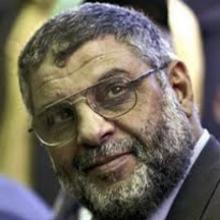
Co-founder of Hamas - deceased
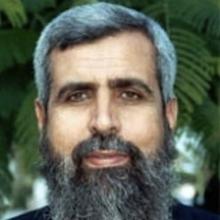
Founder of the Qassam Brigades - deceased

Bombmaker and former leader of the Izz ad-Din al-Qassam Brigades - deceased
Hamas maintains that “all types of legitimate resistance are practiced to end the oppressions and injustices imposed by Israel” and that it is Hamas’s right to “resist with all means, including armed resistance, guaranteed by divine and international laws,” according to its English-language website.“About Hamas,” Hamas website, accessed November 7, 2016, http://hamas.ps/en/page/2/. Hamas has employed various violent tactics against Israeli military and civilian targets.
In May 2017, Hamas unveiled a new political platform that continued to call for “armed resistance” as Hamas’s primary strategy to liberate all of Palestine from the river to the sea.“Document of General Principles & Policies,” Hamas, May 1, 2017, http://hamas.ps/en/post/678/a-document-of-general-principles-and-policies; Patrick Wintour, “Hamas presents new charter accepting a Palestine based on 1967 borders,” Guardian (London), May 1, 2017, https://www.theguardian.com/world/2017/may/01/hamas-new-charter-palestine-israel-1967-borders.
Al-Aqsa Storm—the October 7, 2023, attacks
On October 7, 2023, a day after the 50th anniversary of the Yom Kippur War and as Israel was marking the Jewish holidays of Simchat Torah and Shabbat, Hamas launched a massive attack on Israel, killing at least 1,200 and wounding almost 4,000. Hamas and Palestinian Islamic Jihad (PIJ) also took hostage at least 240 people, mostly civilians.Ammar Awad and Maayan Lubell, “Gunmen in homes, captives abducted leave Israelis in shock,” Reuters, October 7, 2023, https://www.reuters.com/world/middle-east/gunmen-homes-captives-abducted-gaza-leave-israelis-shock-2023-10-07/; Lauren Frayer, “Israel revises down its death toll from the Oct. 7 Hamas attacks to about 1,200,” NPR, November 11, 2023, https://www.npr.org/2023/11/11/1212458974/israel-revises-death-toll-hamas-attacks-oct-7. During the attack, Hamas fighters blew up part of the border fence and then used bulldozers to widen the gap before sending hundreds of fighters into Israel on motorbikes. At the same time, Hamas launched thousands of rockets as far north as Tel Aviv. The Hamas fighters spread into more than a dozen Israeli communities and military bases within 15 miles of the Gaza border. An Israeli military spokesman called the attack Israel’s 9/11 and admitted that Hamas caught Israel by surprise.Samia Nakhoul and Jonathan Saul, “How Israel was duped as Hamas planned devastating assault,” Reuters, October 8, 2023, https://www.reuters.com/world/middle-east/how-israel-was-duped-hamas-planned-devastating-assault-2023-10-08/. A December 2023 IDF investigation found that Hamas had used an unspecified but toxic flammable substance in its attack on the Nahal Oz IDF base, which surveilled the Gaza border. According to the investigation, Hamas attackers threw the substance through the entrance of the building that housed the surveillance soldiers’ command center, causing suffocation and loss of consciousness within a few minutes.“Hamas used toxic substance to kill Nahal Oz troops on Oct. 7, IDF probe said to show,” Times of Israel, December 13, 2023, https://www.timesofisrael.com/nahal-oz-troops-killed-by-toxic-gas-during-oct-7-hamas-attack-idf-probe-said-to-show/. Hamas claimed it had launched 5,000 rockets toward Israel on the first day of the war. Hamas designated its attack “Al-Aqsa Storm,” though it has also been labeled “Al-Aqsa Flood.”Ibrahim Dahman and Abeer Salman, “Hamas announces ‘Al-Aqsa Storm,’ claims to have fired 5,000 rockets,” CNN, October 7, 2023, https://www.cnn.com/middleeast/live-news/al-aqsa-storm-militants-infiltrate-israel-after-gaza-rockets-10-07-intl-hnk/h_644aa5e5d02286051f5cc307e229566a; “Al-Aqsa Flood was a ‘fully Palestinian operation’, Iran’s IRGC says,” New Arab, December 28, 2023, https://www.newarab.com/news/al-aqsa-flood-fully-palestinian-operation-irans-irgc. Beginning on October 7, Hamas launched more than 12,000 rockets toward Israel during the war.“Hamas rockets target Tel Aviv area for first time in a week,” Jewish News Service, December 19, 2023, https://www.jns.org/hamas-rockets-target-tel-aviv-area-for-first-time-in-a-week/.
Hamas leader Ismail Haniyeh and other top Hamas leaders watched the attack unfold from Haniyeh’s office in Doha, Qatar. The Hamas leaders cheered the attack and prostrated themselves before God.Matt Drake, “How Hamas leader Ismail Haniyeh watched attack on Israel on TV from his office in Qatar as he celebrated with other officials,” Daily Mail (London), October 8, 2023, https://www.dailymail.co.uk/news/article-12608271/How-Hamas-leader-Ismail-Haniyeh-watched-attack-Israel-TV-office-Qatar-celebrated-officials.html. Qatar-based senior Hamas leader Moussa Abu Marzouk claimed the group’s military wing had kept details of the impending attack secret from the political leadership, but they were aware of general plans for the attack. Marzouk told New Yorker magazine, “We were surprised by the date but not by the actions.”Adam Rasgon and David D. Kirkpatrick, “What Was Hamas Thinking?,” New Yorker, October 13, 2023, https://www.newyorker.com/news/news-desk/what-was-hamas-thinking. Sources close to Hamas told Reuters that the group had prepared for the operation for two years by constructing and training in mock settlements in Gaza. According to those sources, Hamas refrained from large-scale attacks on Israel during this time in order to convince Israeli intelligence it was not seeking a wider conflict, and to give Israel the impression that the group was unprepared for a larger fight.Samia Nakhoul and Jonathan Saul, “How Israel was duped as Hamas planned devastating assault,” Reuters, October 8, 2023, https://www.reuters.com/world/middle-east/how-israel-was-duped-hamas-planned-devastating-assault-2023-10-08/. According to a Wall Street Journal report, several senior Hamas and Hezbollah sources confirmed the participation of IRGC officials in planning the attack in meetings in Beirut in August 2023. According to those officials, the IRGC had provided a greenlight for the attack in September.Summer Said, Benoit Faucon, and Stephen Kalin, “Iran Helped Plot Attack on Israel Over Several Weeks,” Wall Street Journal, October 8, 2023, https://www.wsj.com/world/middle-east/iran-israel-hamas-strike-planning-bbe07b25. A December 27 Al Jazeera report cited an IRGC statement confirming that the October 7 attack was part of a retaliation strategy for the 2020 assassination of IRGC Quds Force leader Qasem Soleimani in a U.S. airstrike. Hamas denied the report, stating the “foremost” reasons for October 7 were “the dangers that threaten al-Aqsa Mosque.”Jerusalem Post staff and Reuters, “October 7 massacre was retaliation for Soleimani killing, Iran says – report,” Jerusalem Post, December 27, 2023, https://www.jpost.com/breaking-news/article-779705. Meanwhile, IRGC commander-in-chief Hossein Salami labeled the October 7 attack a “fully Palestinian operation.”“Al-Aqsa Flood was a ‘fully Palestinian operation’, Iran’s IRGC says,” New Arab, December 28, 2023, https://www.newarab.com/news/al-aqsa-flood-fully-palestinian-operation-irans-irgc. According to Salami, the IRGC spokesman who called the attack a retaliation for Soleimani’s death had clarified that he meant that the ensuing battles in Gaza—not the October 7 attack itself—were revenge for Soleimani’s death.“Al-Aqsa Flood was a ‘fully Palestinian operation’, Iran’s IRGC says,” New Arab, December 28, 2023, https://www.newarab.com/news/al-aqsa-flood-fully-palestinian-operation-irans-irgc.
On October 27, Israel launched a ground invasion of Gaza while vowing to eliminate Hamas’s leadership and infrastructure there.James Mackenzie and Maayan Lubell, “Israel launches Gaza war’s second phase with ground operation, Netanyahu says,” Reuters, October 28, 2023, https://www.reuters.com/world/middle-east/eu-calls-humanitarian-pauses-gaza-aid-israel-raids-enclave-2023-10-26/. On November 24, a four-day ceasefire went into effect. Under the agreement, negotiated by Qatar and Egypt, Hamas would release 50 hostages in exchange for 150 Palestinian security prisoners held in Israel.Jason Burke, “Hamas releases 24 hostages on first day of Gaza ceasefire,” Guardian (London), November 24, 2023, https://www.theguardian.com/world/2023/nov/24/israel-hamas-war-gaza-ceasefire-begins-hostage-release-palestinian. On November 27, Hamas and Israel agreed to a two-day ceasefire extension. Israel pledged to extend the ceasefire by one day for every 10 hostages Hamas released.“Hamas says it has agreed with Qatar and Egypt to a two-day extension of truce,” Reuters, November 27, 2023, https://www.reuters.com/world/middle-east/hamas-says-it-has-agreed-with-qatar-egypt-two-day-extension-truce-2023-11-27/; “Truce extension will go into effect after the release of hostages on Monday, Israeli senior adviser says,” CNN, November 27, 2023, https://www.cnn.com/middleeast/live-news/israel-hamas-war-gaza-news-11-27-23/h_7d147083d5b55e545becd4691042c509. On November 30, two Hamas gunmen killed three people and wounded five others in Jerusalem.Ibrahim Dahman and Eyad Kourdi, “Hamas says its militants killed three people at Jerusalem bus stop,” CNN, November 30, 2023, https://www.cnn.com/2023/11/30/middleeast/hamas-jerusalem-bus-stop-shooting-intl/index.html; Emanuel Fabian, “Four killed, 5 injured in Hamas-claimed terror shooting at Jerusalem bus stop,” Times of Israel, November 30, 2023, https://www.timesofisrael.com/three-killed-6-injured-in-terror-shooting-at-jerusalem-entrance-bus-stop/. The ceasefire officially ended on December 1 following a breakdown in negotiations over Hamas’s release of hostages. Hamas reportedly continued to hold 137 hostages in Gaza, including 115 men, 20 women, and two children. Israel accused Hamas of failing to release all female hostages. A Palestinian official claimed female Israeli soldiers caused the breakdown. Hamas launched at least 50 rockets toward southern Israeli towns that day.Nidal Al-Mughrabi and Suhaib Salem, “Scores reported killed in Gaza after Israel-Hamas truce collapses,” Reuters, December 1, 2023, https://www.reuters.com/world/middle-east/gaza-negotiators-try-get-israel-hamas-agree-extend-truce-again-2023-12-01/; Emanuel Fabian, “IDF: We hit 200 Gaza targets since Hamas ceasefire violation; 50 rockets fired at Israel,” Times of Israel, December 1, 2023, https://www.timesofisrael.com/liveblog_entry/idf-says-it-carried-out-200-airstrikes-throughout-gaza-since-hamas-ceasefire-violation/; “Live updates | Israel and Hamas trade blame for cease-fire’s end as combat resumes,” Associated Press, December 1, 2023, https://apnews.com/article/israel-hamas-war-live-updates-12-1-2023-0c225e35008879ea7574aabb077596f2.
Approximately 3,000 Hamas fighters participated in the October 7 attack. About 1,500 of those terrorists were killed in the initial fighting. Israel seized phones, cameras, notebooks, and documents from the gunmen, as well as from Hamas fighters in Gaza. Documents included a detailed map of an Israeli military base, guides to hostage-taking, and Arabic-to-Hebrew phrasebooks. One phrase included “put your hands up and spread your legs.” According to information collected, Hamas had planned the October 7 attack for several years.Dan Sabbagh, “Hamas drew detailed attack plans for years with help of spies, documents suggest,” Guardian (London), December 4, 2023, https://www.theguardian.com/world/2023/dec/04/hamas-drew-detailed-attack-plans-for-years-with-help-of-spies-idf-says. The New York Times reported that Israel had obtained Hamas’s plans for the October 7 attack more than a year beforehand, but labeled the plan as aspirational because Israeli military officials thought it would be too difficult for Hamas to execute. The Times also reviewed a Hamas plan called “Jericho Wall,” which included a methodical assault designed to overwhelm the fortifications around the Gaza Strip, take over Israeli cities, and raid key military bases. The plans also included details on Israeli communications and military installations.Ronen Bergman and Adam Goldman, “Israel Knew Hamas’s Attack Plan More Than a Year Ago,” New York Times, November 30, 2023, https://www.nytimes.com/2023/11/30/world/middleeast/israel-hamas-attack-intelligence.html.
The New York Times and the United Nations both conducted investigations that confirmed that Hamas carried out sexual violence on October 7, including rape, gang rape, and sexual torture. The December 2023 New York Times investigation detailed Hamas sexual violence against women during its October 7 attack.Jeffrey Gettleman, Anat Schwartz, and Adam Sella, “‘Screams Without Words’: How Hamas Weaponized Sexual Violence on Oct. 7,” New York Times, December 28, 2023, https://www.nytimes.com/2023/12/28/world/middleeast/oct-7-attacks-hamas-israel-sexual-violence.html. According to a March 4, 2024, U.N. report, there are “reasonable grounds” to conclude that Hamas carried out sexual violence, including rape and gang rape, during the October 7 attack. The report also found “clear and convincing information” based on firsthand accounts of released hostages that sexual violence, including rape, sexualized torture, and cruel, inhumane and degrading treatment, was inflicted against some women and children while held in Gaza. The report also found “reasonable grounds” to believe that such violence against remaining hostages may be continuing.“Mission report Official visit of the Office of the SRSG-SVC to Israel and the occupied West Bank 29 January – 14 February 2024,” United Nations, March 4, 2024, https://news.un.org/en/sites/news.un.org.en/files/atoms/files/Mission_report_of_SRSG_SVC_to_Israel-oWB_29Jan_14_feb_2024.pdf. The report is based on an investigation and interviews by a team of experts in Israel and the West Bank led by Pramila Patten, the U.N. secretary-general’s special representative on sexual violence in conflict.Farnaz Fassihi and Isabel Kershner, “U.N. Team Finds Grounds to Support Reports of Sexual Violence in Hamas Attack,” New York Times, last updated March 5, 2024, https://www.nytimes.com/2024/03/04/world/middleeast/israel-hamas-un-report-sexual-violence.html.
Hamas has denied both reports and dismissed allegations it intentionally targeted civilians or committed sexual crimes. In a January 1 statement on Telegram Hamas labeled the New York Times report “part of the Israeli attempt to demonize and dehumanize the Palestinian people and resistance, and to justify the Israeli army war crimes and crimes of genocide against the Palestinian people.”“Response to the New York Times misleading report against the Palestinian resistance on Oct. 7,” Hamas Online Telegram Channel, January 1, 2024. On January 21, 2024, Hamas released a document in English and Arabic entitled, “Our Narrative... Operation Al-Aqsa Flood.” The document provided Hamas’s reasoning to justify the October 7 attack, as well as assertions that Hamas behaved morally and did not intentionally harm civilians, despite video footage and testimonials to the contrary. The document justified Hamas’s use of all forms of “resistance” against Israel. Hamas claimed its fighters targeted only Israeli soldiers on October 7 and “sought to arrest the enemy’s soldiers.”“Our Narrative… Operation Al-Aqsa Flood,” Hamas Online Telegram Channel, January 21, 2024. Hamas claimed it is religiously obligated to avoid harming civilians, particularly children, women, and the elderly. Hamas denies it intentionally targeted any civilians and claims its fighters were “fully disciplined and committed to Islamic values” and targeting only soldiers.“Our Narrative… Operation Al-Aqsa Flood,” Hamas Online Telegram Channel, January 21, 2024. Hamas further claimed the injury of any civilians was accidental and the result of confrontation with Israeli forces.“Our Narrative… Operation Al-Aqsa Flood,” Hamas Online Telegram Channel, January 21, 2024.
The October 7 attack was planned and executed solely by Hamas leaders in Gaza without input from the Hamas political leadership abroad, according to multiple media reports interviewing Palestinians close to the Hamas leadership. In January 2024, the British newspaper Asharq al-Awsat reported that five individuals coordinated the October 7 attack: Yahya Sinwar, his brother Mohammed Sinwar, Qassam Brigades leader Mohammed Deif, Rouhi Mushtaha, and Ayman Nofal. They reportedly chose the date of October 7 because of the reports of calm along the border. They confirmed their plans on October 6 and waited until midnight that night to begin the attack with 70 fighters from elite Hamas units who were trained in infiltrating Israeli settlements. Palestinian sources told the newspaper that Hamas’s political leaders in Qatar were not informed of the attack until hours beforehand when they received a briefing and instructions to go into hiding. The political leaders were reportedly not given details of the pending attack. After the first hour and a half, Hamas mobilized elite units within the Qassam Brigades to support the initial attackers.“‘Al-Aqsa Flood’ : Initiated by 70 Elite Fighters, Crafted by 5 Hamas Leaders,” Asharq al-Awsat (London), January 10, 2024, https://english.aawsat.com/arab-world/4780421-%E2%80%98al-aqsa-flood%E2%80%99-initiated-70-elite-fighters-crafted-5-hamas-leaders.
Some sources within Hamas have criticized Sinwar for his decisions surrounding October 7, particularly in relation to the devastation wrought on Gaza in response. On November 5, the United Kingdom’s Daily Mail newspaper published an interview with a senior Hamas commander who accused Sinwar and Haniyeh of changing the plan for October 7 at the last minute and inviting a devastating Israeli retaliation. According to the battalion commander, who identified himself only as Abu Mohammed, Hamas had originally planned only to kill Israeli soldiers and take some soldiers hostage. They had not planned to kill civilians. Abu Mohammed said he was one of the planners of October 7, but Haniyeh and Sinwar changed the plan and told fighters to “do what they like.”Summer Goodkind, “Top Hamas military commander claims October 7 attacks were never meant to target Israeli civilians as he breaks ranks to criticise terror group’s leaders ‘who changed the plan last-minute’ in extraordinary intervention,” Daily Mail (London), November 5, 2023, https://www.dailymail.co.uk/news/article-12712397/Top-Hamas-military-commander-claims-October-7-attacks-never-meant-target-Israeli-civilians-breaks-ranks-criticise-terror-groups-exiled-leaders-changed-plan-minute-extraordinary-intervention.html. Abu Mohammed accused Sinwar of acting like a “street fighter,” while the Hamas leadership abroad did not bear the consequences for October 7 like the people of Gaza did.Summer Goodkind, “Top Hamas military commander claims October 7 attacks were never meant to target Israeli civilians as he breaks ranks to criticise terror group’s leaders ‘who changed the plan last-minute’ in extraordinary intervention,” Daily Mail (London), November 5, 2023, https://www.dailymail.co.uk/news/article-12712397/Top-Hamas-military-commander-claims-October-7-attacks-never-meant-target-Israeli-civilians-breaks-ranks-criticise-terror-groups-exiled-leaders-changed-plan-minute-extraordinary-intervention.html. During interrogation in Israeli custody in December 2023, former Hamas communications minister Yousef al-Mansi accused Sinwar and the Hamas leadership of setting Gaza back 200 years. In footage of the interrogation released by Israel’s Shin Bet security service on December 10, Mansi said, “People in the Gaza Strip say that Sinwar and his group destroyed us, we must get rid of them.”Emanuel Fabian and Michael Horovitz, “Ex-Hamas minister in interrogation: ‘Crazy people’ led by Sinwar ‘destroyed Gaza,’” Times of Israel, December 10, 2023, https://www.timesofisrael.com/ex-hamas-minister-in-interrogation-crazy-people-led-by-sinwar-destroyed-gaza/.
Citing Palestinian sources, a March 2024 report by Sky News Arabia claimed the Hamas leadership had criticized Sinwar for launching the October 7 attack without prior consultation with Hamas’s political leaders. Sinwar reportedly consulted with his brother Muhammad Sinwar, Deif, and deputy military leader Marwan Issa. The four had not consulted the rest of the Hamas leadership and its political bureau, who were ignorant of the decision.“Yahya Sinwar decided to launch October 7 attack alone, angering Hamas leaders – report,” Jerusalem Post, March 5, 2024, https://www.jpost.com/israel-hamas-war/article-790331.
Hamas and Israel resumed indirect ceasefire negotiations in February 2024 under the auspices of Egypt, Qatar, and the United States with a goal of reaching an agreement before the start of the Muslim holy month of Ramadan on March 10. The mediators created a framework agreement for a six-week ceasefire, during which Hamas would release up to 40 hostages. In exchange, Israel would release some Palestinian security prisoners and allow increased aid into Gaza.Samy Magdy, Tia Goldenberg, and Wafaa Shurafa, “Gaza cease-fire talks fail to achieve a breakthrough with Ramadan just days away, Egypt says,” Associated Press, March 6, 2024, https://apnews.com/article/israel-hamas-war-news-03-05-2024-a13c5fa6e23fedbda42e3028a96ca14e. On March 2, Israel reportedly agreed to the framework, according to a U.S. official. The proposal would see Hamas release vulnerable hostages, including the sick, the wounded, the elderly, and women. According to the U.S. official, the “ball is in the court of Hamas.”Wafaa Shurafa and Samy Magdy, “US says Israel has agreed to the framework for a Gaza cease-fire. Hamas must now decide,” Associated Press, March 2, 2024, https://apnews.com/article/israel-hamas-war-news-03-02-2024-531593c27931a2764357b6f7b11ce394; “US Vice President Calls for ‘Immediate Cease-Fire’ in Gaza,” Voice of America, March 3, 2024, https://www.voanews.com/a/us-vice-president-calls-for-immediate-cease-fire-in-gaza-/7512507.html. On March 3, Hamas representatives reportedly met with Egyptian and Qatari officials in Cairo to discuss the proposal.Wafaa Shurafa and Samy Magdy, “US says Israel has agreed to the framework for a Gaza cease-fire. Hamas must now decide,” Associated Press, March 2, 2024, https://apnews.com/article/israel-hamas-war-news-03-02-2024-531593c27931a2764357b6f7b11ce394; “US Vice President Calls for ‘Immediate Cease-Fire’ in Gaza,” Voice of America, March 3, 2024, https://www.voanews.com/a/us-vice-president-calls-for-immediate-cease-fire-in-gaza-/7512507.html. The talks reportedly ended on March 6 without an agreement. Hamas refused to provide a list of Israeli hostages who were still alive, claiming Israel needed to implement a ceasefire before Hamas could verify the status of hostages.Samy Magdy, Tia Goldenberg, and Wafaa Shurafa, “Gaza cease-fire talks fail to achieve a breakthrough with Ramadan just days away, Egypt says,” Associated Press, March 6, 2024, https://apnews.com/article/israel-hamas-war-news-03-05-2024-a13c5fa6e23fedbda42e3028a96ca14e; Lazar Berman and staff, “Hamas claims it needs a truce to meet Israel’s demand for list of living hostages,” Times of Israel, March 5, 2024, https://www.timesofisrael.com/as-israel-seeks-list-of-living-hostages-hamas-official-claims-ceasefire-needed-first/. According to a Jordanian newspaper report, Hamas demanded the ceasefire begin a week before it would release any hostages. Hamas also sought the release from Israeli prisons of prisoners who had been re-arrested since their release under the 2011 Shalit prisoner exchange, as well as 160 prisoners convicted of violent crimes and Fatah Tanzim leader Marwan Barghouti, who is serving multiple life sentences for coordinating suicide bombings during the Second Intifada.“Hamas submits final demands in potential ceasefire agreement,” Jerusalem Post, March 6, 2024, https://www.jpost.com/breaking-news/article-790522.
Suicide Bombings
Hamas began using suicide bombings as a tactic against Israeli citizens on April 6, 1994, when a suicide bomber operating on behalf of Hamas drove alongside a bus in Afula, Israel, and blew up his car, killing eight people.Clyde Haberman, “Arab Car Bomber Kills 8 in Israel, 44 Are Wounded,” New York Times, April 7, 1994, http://www.nytimes.com/1994/04/07/world/arab-car-bomber-kills-8-in-israel-44-are-wounded.html. Hamas claimed at the time that the new tactic was in response to the February 25 massacre of 29 Palestinians at Hebron’s Ibrahimi Mosque by radical Israeli settler Baruch Goldstein.Clyde Haberman, “Arab Car Bomber Kills 8 in Israel, 44 Are Wounded,” New York Times, April 7, 1994, http://www.nytimes.com/1994/04/07/world/arab-car-bomber-kills-8-in-israel-44-are-wounded.html.
Throughout the 1990s and early 2000s, Hamas has continued to dispatch suicide bombers to kill Israeli civilian and military targets, collectively killing hundreds of people. A 2007 study in the Journal of Economic Perspectives found that Hamas was responsible for roughly 40 percent of suicide attacks during the Second Intifada, which collectively killed more than 1,000 people.Efraim Benmelech and Claude Berrebbi, “Human Capital and the Productivity of Suicide Bombers,” Journal of Economic Perspectives 21, no. 3 (Summer 2007): 223–38, http://www.kellogg.northwestern.edu/faculty/benmelech/html/BenmelechPapers/Human_Capital_Suicide_Bombers.pdf;
“Victims of Palestinian Violence and Terrorism since September 2000,” Israel Ministry of Foreign Affairs, accessed June 14, 2017, http://www.mfa.gov.il/mfa/foreignpolicy/terrorism/palestinian/pages/victims%20of%20palestinian%20violence%20and%20terrorism%20sinc.aspx. Hamas leader Khaled Meshaal reportedly banned the tactic in 2005, but a music video imploring the return of suicide bombings reportedly aired on Hamas television in February 2016.Patrick Martin, “Hamas’s new leadership may return to suicide bombings, Globe and Mail (London), February 12, 2016, http://www.theglobeandmail.com/news/world/hamass-new-leadership-may-return-to-suicide-bombings/article28751340/.
Second Intifada
Between September 2000 and March 2004, Hamas carried out 425 terrorist attacks in Israel, the Gaza Strip, and the West Bank. This included 52 suicide bombings, which killed 377 people and wounded 2,076 civilians and soldiers.“Hamas terrorist attacks,” Israel Ministry of Foreign Affairs, March 22, 2004, http://embassies.gov.il/MFA/FOREIGNPOLICY/Terrorism/Palestinian/Pages/Hamas%20terror%20attacks%2022-Mar-2004.aspx. Other attacks included shootings, stabbings, mortars, and bombings.“Victims of Palestinian Violence and Terrorism since September 2000,” Israel Ministry of Foreign Affairs, accessed November 7, 2016, http://mfa.gov.il/MFA/ForeignPolicy/Terrorism/Palestinian/Pages/Victims%20of%20Palestinian%20Violence%20and%20Terrorism%20sinc.aspx.
Beneath the Gaza-Egypt border
Hamas has built a network of tunnels beneath the Gaza-Israel border for use in cross-border attacks, such as the June 2006 raid that resulted in the deaths of two soldiers and the abduction of Israeli soldier Gilad Shalit.Tim Butcher, “Soldier Kidnapped and Two Killed in Gaza Tunnel Attack,” Telegraph [U.K.], June 26, 2006, http://www.telegraph.co.uk/news/worldnews/middleeast/israel/1522370/Soldier-kidnapped-and-two-killed-in-Gaza-tunnel-attack.html. Israel claimed to have destroyed 32 of these tunnels during its 2014 war with Hamas. The tunnels reportedly cost Hamas $100 million to build.Yasmine Saleh and Lin Noueihed, “Israel, Hamas Militants Begin 72-Hour Truce,” Chicago Tribune, August 5, 2014, http://www.chicagotribune.com/news/nationworld/chi-israel-hamas-gaza-truce-20140804-story.html;
Yardena Schwartz, “Israel Is Building a Secret Tunnel-Destroying Weapon,” Foreign Policy, March 10, 2016, http://foreignpolicy.com/2016/03/10/israel-is-building-a-secret-tunnel-destroying-weapon-hamas-us-gaza/.
In August 2015, Hamas released a propaganda video of its members digging underground tunnels beneath Gaza, fighting Israeli soldiers, and a simulated takeover of an IDF base.“Watch: Hamas reveals ‘commando tunnel unit’ in new propaganda clip,” Jerusalem Post, August 27, 2015, http://www.jpost.com/Arab-Israeli-Conflict/WATCH-Hamas-reveals-commando-tunnel-unit-in-new-propaganda-clip-413421. In April 2016, Israeli media reported that Hamas had employed over 1,000 people to rebuild the tunnel infrastructure. Hamas was reportedly spending hundreds of thousands of dollars per month to rebuild the tunnels.“Report: Hamas taps over 1,000 terror operatives to dig Gaza tunnels,” Jerusalem Post, April 7, 2016, http://www.jpost.com/Arab-Israeli-Conflict/Report-Hamas-taps-over-1000-terror-operatives-to-dig-Gaza-tunnels-450556. According to Ismail Haniyeh in January 2016, Hamas fighters “are digging twice as much as the number of tunnels dug in Vietnam.”Yardena Schwartz, “Israel Is Building a Secret Tunnel-Destroying Weapon,” Foreign Policy, March 10, 2016, http://foreignpolicy.com/2016/03/10/israel-is-building-a-secret-tunnel-destroying-weapon-hamas-us-gaza/. A series of tunnel collapses in early 2016 killed several Hamas workers. Some Hamas operatives have blamed Israel for the collapses.Noam Rotenberg, “Exclusive: Hamas operatives fear entering tunnels, believe Israel behind collapses,” Jerusalem Post, March 3, 3016, http://www.jpost.com/Arab-Israeli-Conflict/Exclusive-Hamas-operatives-fear-entering-tunnels-believe-Israel-behind-collapses-446836. Israel is reportedly working with the United States to develop a system dubbed the “Underground Iron Dome” to detect and destroy the underground tunnels.Yardena Schwartz, “Israel Is Building a Secret Tunnel-Destroying Weapon,” Foreign Policy, March 10, 2016, http://foreignpolicy.com/2016/03/10/israel-is-building-a-secret-tunnel-destroying-weapon-hamas-us-gaza/.
In early April 2016, Israel blocked private cement transfers to Gaza after claiming that Hamas had been diverting shipments for its own use, likely the reconstruction of its underground tunnel network. Hamas threatened the situation will “explode” if Israel doesn’t lift the ban. The United Nations’ Middle East envoy condemned “those who seek to gain through the deviation of materials” as “stealing from their own people and adding to the suffering of Palestinians in Gaza.”Michael Kaplan, “Hamas Threatens Gaza Could ‘Explode’ Under Israel’s Cement Ban,” International Business Times, April 5, 2016, http://www.ibtimes.com/hamas-threatens-gaza-could-explode-under-israels-cement-ban-2348691;
“Israel halts cement deliveries into Gaza following allegations of diversion; UN envoy urges rapid resolution,” UN News Centre, April 4, 2016, http://www.un.org/apps/news/story.asp?NewsID=53603#.Vw_3efkrKM8.
Prior to 1996, Hamas’s arsenal included only a few AK-47 rifles and a single rocket-propelled grenade. That year, Ahmed Jaabari began to overhaul Hamas’s artillery, according to Reuters. Jaabari took command of Hamas’s armed wing in 2002. Israel assassinated Jaabari in 2012.Nidal al-Mughrabi, “Analysis-Hamas homemade rocket industry bypasses crumbling supply lines,” Reuters, July 15, 2014, http://uk.reuters.com/article/2014/07/15/uk-palestinians-israel-hamas-analysis-idUKKBN0FK23220140715. In September 2013, the Qassam Brigades held a military parade displaying machine guns, sniper rifles, anti-tank RPGs, and revealing for the first time Hamas’s possession of SA-7 anti-aircraft missiles.Adnan Abu Amer, “Hamas Tests Anti-Aircraft Missiles,” Al-Monitor, February 19, 2014, http://www.al-monitor.com/pulseen/originals/2014/02/gaza-hamas-qassam-aircraft-missiles-israel-strela.html. In July 2015, the group created a military training camp for 25,000 new recruits, some as young as 15.Agence France-Presse, “Hamas opens military camp for 25,000 Gazans aged 15 and up,” Times of Israel, July 25, 2015, https://www.timesofisrael.com/hamas-gives-25000-gazans-combat-training/.
The Israel Defense Forces (IDF) estimated that Hamas had approximately 10,000 rockets in its arsenal at the beginning of July 2014.Jim Michaels, “Israel: Hamas Still Has 5,000 Rockets in Its Arsenal,” USA Today, July 29, 2014, http://www.usatoday.com/story/news/world/2014/07/29/israel-hamas-rockets-gaza-tunnels/13316973/. By the end of that month, Hamas had fired more than 2,600 rockets at Israel, while the Israeli military estimated it destroyed an additional 3,000 rockets.Jim Michaels, “Israel: Hamas Still Has 5,000 Rockets in Its Arsenal,” USA Today, July 29, 2014, http://www.usatoday.com/story/news/world/2014/07/29/israel-hamas-rockets-gaza-tunnels/13316973/. The IDF estimated Hamas still had approximately 5,000 rockets left.Jim Michaels, “Israel: Hamas Still Has 5,000 Rockets in Its Arsenal,” USA Today, July 29, 2014, http://www.usatoday.com/story/news/world/2014/07/29/israel-hamas-rockets-gaza-tunnels/13316973/. By the end of the 2014 war, Hamas had fired approximately 4,600 rockets into Israel. Israeli intelligence estimated in March 2016 that Hamas had restored its rocket arsenal to its pre-2014 war levels of approximately 12,000.Avi Issacharoff, “Hamas has replenished its rocket arsenals, Israeli officials say,” Times of Israel, March 4, 2016, http://www.timesofisrael.com/hamas-has-replenished-its-rocket-arsenals-israeli-officials-say/.
Hamas has relied on underground tunnels beneath Gaza’s borders with Egypt and Israel. During Hamas’s 50-day war with Israel during the summer of 2014, Hamas used these tunnels to stage raids inside Israel. Many of the tunnels into Israel were destroyed during the war, but Hamas has since sought to rebuild them. The Israeli military revealed in February 2016 that Hamas was “investing considerable resources” into rebuilding the tunnels.Shira Rubin, “Hamas tunnels: 'We can hear them digging beneath our feet,' say Israelis on Gaza border,” International Business Times, February 11, 2016, http://www.ibtimes.co.uk/hamas-tunnels-we-can-hear-them-digging-beneath-our-feet-say-israelis-gaza-border-1543205. By March 2016, Israeli authorities estimated that Hamas had rebuilt at least 10 tunnels into Israel. Almost a dozen of these tunnels collapsed on the Hamas fighters digging them in early 2016, killing at least 10 Hamas members.Mahmud Hams, “Hamas is Tunneling its Way Into Israel Again,” Newsweek, March 8, 2016, http://www.newsweek.com/hamas-tunnels-israel-palestine-gaza-434428.
Hamas also has as many as 1,200 tunnels beneath the Gaza-Egypt border. The tunnels are used to smuggle commodities as well as weapons into Gaza.Shira Rubin, “Hamas tunnels: 'We can hear them digging beneath our feet,' say Israelis on Gaza border,” International Business Times, February 11, 2016, http://www.ibtimes.co.uk/hamas-tunnels-we-can-hear-them-digging-beneath-our-feet-say-israelis-gaza-border-1543205. In September 2015, Egypt began flooding many of these tunnels to cut off Hamas smuggling.“Egypt floods Gaza tunnels used for smuggling,” Al Jazeera, September 18, 2015, http://www.aljazeera.com/news/2015/09/egypt-floods-gaza-tunnels-150918193805896.html. Israeli Energy Minister Yuval Steinitz confirmed in February 2016 that Israel had requested Egypt act against the tunnels.“Steinitz: 'Egypt floods Hamas tunnels, in part due to Israel's request,’” Jerusalem Post, February 6, 2016, http://www.jpost.com/Middle-East/Steinitz-Egypt-floods-Hamas-tunnels-in-part-due-to-Israels-request-444040. Hamas has also reportedly used the Egyptian tunnels to transport aid to ISIS’s Sinai Province group.Avi Issacharoff, “Under Egypt’s nose, Hamas boosts cooperation with IS in Sinai,” Times of Israel, March 6, 2016, http://www.timesofisrael.com/under-egypts-nose-hamas-boosts-cooperation-with-is-in-sinai/.
As of October 2017, Hamas reportedly maintained an armed force of 25,000.Nidal al-Mughrabi and Omar Fahmy, “Palestinian rivals Fatah, Hamas sign reconciliation accord,” Reuters, October 12, 2017, https://ca.reuters.com/article/topNews/idCAKBN1CH0F5-OCATP. Hamas’s armed faction remained a point of contention in reconciliation negotiations with Fatah, which has demanded that Hamas disarm. Hamas agreed to halt all violence against Israel as part of the October agreement, but Hamas and Fatah delayed further discussion of Hamas’s armed faction.Dov Lieber, “Veneer of positivity fades in Palestinian unity talks as tough issues surface,” Times of Israel, October 16, 2017, https://www.timesofisrael.com/veneer-of-positivity-fades-in-palestinian-unity-talks-as-tough-issues-surface/; Dov Lieber, “In deal with Fatah, Hamas said to agree to halt attacks from West Bank,” Times of Israel, October 15, 2017, https://www.timesofisrael.com/in-deal-with-fatah-hamas-said-to-agree-to-halt-attacks-from-west-bank/.
In 2020, Gaza militants began utilizing a new tactic called balloon bombs, sending clusters of balloons floating over the Gaza-Israel border with rudimentary explosives attached. Some of the balloons carry signs such as “Happy birthday” or “I Love You” to draw onlookers. Approximately one-third of the balloons crossing the border carry explosives while the rest act as decoys, according to Israeli officials. Balloons have included homemade explosives, grenades, and RPG warheads. Gaza militants have praised the balloons because they are inexpensive and regional winds will carry them farther into Israel.Steve Hendrix, Hazem Balousha, and Ruth Eglash, “Gaza militants target Israel with party balloons bearing bombs,” Washington Post, March 8, 2020, https://www.washingtonpost.com/world/middle_east/gaza-palestinian-balloon-bombs-israel/2020/03/08/d2069346-54d5-11ea-80ce-37a8d4266c09_story.html. The balloons reportedly have the support of all Palestinian factions in the Gaza Strip, including Hamas. As of September 2020, the balloons had not caused any casualties but had resulted in multiple fires in Israeli communities near the Gaza border.Mohammad Habosh, “Gaza’s balloon bombs spark new cycle of violence,” Al-Monitor, August 14, 2020, https://www.al-monitor.com/pulse/originals/2020/08/hamas-gaza-balloons-israel-truce-understandings.html. In addition to the balloons, Hamas has continued to expand its rocket arsenal. In September 2020, Hamas leader Ismail Haniyeh announced Hamas had rockets capable of striking Tel Aviv and beyond from the Gaza Strip.“Hamas and Hezbollah leaders meet in Lebanon,” Middle East Eye, September 6, 2020, https://www.middleeasteye.net/news/lebanon-palestine-hezbollah-hamas-nasrallah-haniyeh-meeting.
2014: Hamas continues to call for violence against Israelis, while firing—or allowing others to fire—rockets into Israel from Gaza. Hamas members also continue trying to carry out terror attacks in Israel.

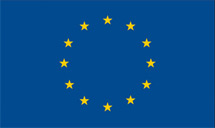




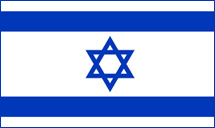
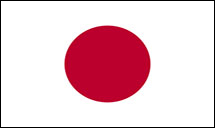
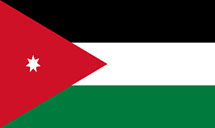




Hamas and Hezbollah have at times cooperated, though the groups have split somewhat over competing allegiances in the Syrian civil war. Despite tensions between Hamas and Hezbollah over the Syrian civil war, relations between the two groups are reportedly still good, a Hezbollah source told Al-Monitor in 2013.Haytham Mouzahem, “Hezbollah-Hamas Relations ‘Good’ Despite Beirut Bombing Accusations,” Al-Monitor, August 27, 2013, http://www.al-monitor.com/pulseen/originals/2013/08/hezbollah-hamas-relations-beirut-bombing-accusations.html. During the July 2014 conflict between Israel and Hamas, Hamas reportedly invited Hezbollah to join in its rocket campaign against Israel.Ariel Ben Solomon, “Hamas Invites Hezbollah to Join in Fighting against Israel,” Jerusalem Post, July 30, 2014, http://www.jpost.com/Operation-Protective-Edge/Hamas-invites-Hezbollah-to-join-in-fighting-against-Israel-369379. In November 2015, leaders of Hamas and Hezbollah met in Beirut to discuss paramilitary coordination against Israel and ISIS.Khaled Abu Toameh, “Hamas and Hezbollah leaders meet in Beirut to discuss Palestinian ‘intifada,’” Jerusalem Post, November 22, 2015, http://www.jpost.com/Arab-Israeli-Conflict/Hamas-and-Hezbollah-leaders-meet-in-Beirut-to-discuss-Palestinian-Intifada-434948. In January 2015, Hamas military leader Mohammed Deif reportedly called for Hezbollah and Hamas to unite in battling Israel.“Hamas calls on Hezbollah to unite fight against Israel,” Reuters, January 22, 2015, http://www.reuters.com/article/2015/01/22/us-israel-palestinians-hezbollah-idUSKBN0KV1O920150122. After the Gulf Cooperation Council designated Hezbollah a terrorist organization in March 2016, Hamas signed an Iranian statement of support for Hezbollah.Maayan Groisman, “PA envoy to Iran signs statement of support for Hezbollah,” Jerusalem Post, March 10, 2016, http://www.jpost.com/Middle-East/Palestinian-Authoritys-envoy-to-Iran-signs-statement-of-support-for-Hezbollah-447476.
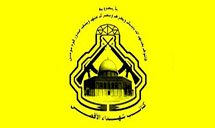
Hamas and the Al-Aqsa Martyrs’ Brigade carried out several joint terrorist operations during the Second Intifada, including a March 2004 attack at the port of Ashdod that killed 10 Israelis,“Timeline: The Evolution of Hamas,” CNN, December 30, 2008, http://www.cnn.com/2008/WORLD/meast/12/30/hamas.profile/. and a suicide bombing the following month at Gaza’s Erez Crossing that killed a border guard and wounded three others.Conal Urquhart, “Israeli Missile Attack Kills New Hamas Chief,” Guardian [U.K.], April 18, 2004, http://www.theguardian.com/world/2004/apr/18/israel. The Brigade has also joined Hamas in launching rockets at Israel over the years, most recently during the July 2014 conflict.Elhanan Miller, “Fatah Joins Hamas and Islamic Jihad in Missile Launches,” Times of Israel, July 10, 2014, http://www.timesofisrael.com/moderate-fatah-joins-hamas-and-islamic-jihad-in-missile-launches/.

On June 25, 2006, a group of Palestinian terrorists from multiple groups, including Hamas, crossed the Gaza border into Israel using an underground tunnel and attacked an IDF military outpost, killing two soldiers and taking 19-year-old Corporal Gilad Shalit hostage.Tim Butcher, “Soldier Kidnapped and Two Killed in Gaza Tunnel Attack,” Telegraph [U.K.], June 26, 2006, http://www.telegraph.co.uk/news/worldnews/middleeast/israel/1522370/Soldier-kidnapped-and-two-killed-in-Gaza-tunnel-attack.html. Hamas denied any participation, but it was later revealed that the group—as well as members of Palestinian Islamic Jihad—were involved in the operation.Steven Erlanger, “Tensions Rise After Israeli Is Kidnapped,” New York Times, June 26, 2006, http://www.nytimes.com/2006/06/26/world/middleeast/26cnd-mideast.html; “Q&A: Gilad Shalit Capture,” BBC News, June 24, 2010, http://news.bbc.co.uk/2/hi/middle_east/6238858.stm. Hamas and PIJ announced a formal agreement in 2012 to combine forces in their fight against Israel.Elhanan Miller, “Gaza’s Hamas and Islamic Jihad Formally Join Forces to Fight Israel,” Times of Israel, October 10, 2012, http://www.timesofisrael.com/gazas-hamas-and-islamic-jihad-formally-join-forces-to-fight-israel/. The following year, the two groups announced plans to create a joint command and a new political vision for Gaza.Elhanan Miller, “Hamas and Islamic Jihad to Form Joint Command,” Times of Israel, September 17, 2013, http://www.timesofisrael.com/hamas-and-islamic-jihad-to-form-joint-command/. PIJ and Hamas have since continued to coordinate politically and militarily.Yaniv Kubovich, “Analysis Iran's Fighting Force in Gaza, Calling and Firing the Shots: This Is Islamic Jihad in Palestine,” Haaretz, June 17, 2018, https://www.haaretz.com/middle-east-news/iran/.premium-what-is-islamic-jihad-in-palestine-iran-s-fighting-force-in-gaza-calling-and-firing-the-shots-1.6158730; “Hamas meets with Islamic Jihad’s leadership, concludes with unified stances,” Hamas, November 2, 2018, http://hamas.ps/en/post/1660/hamas-meets-with-islamic-jihad%E2%80%99s-leadership-concludes-with-unified-stances. The two groups announced in December 2019 they would join forces against Israel in the next round of conflict with the Jewish state.Khaled Abu Toameh, “Hamas, Islamic Jihad agree to stand together in future fight with Israel,” Jerusalem Post, December 20, 2019, https://www.jpost.com/Arab-Israeli-Conflict/Hamas-PIJ-agree-to-stand-together-in-future-confrontation-with-Israel-611458.
In May 2021, Hamas and PIJ jointly launched more than 4,000 rockets toward Israel during an 11-day conflict that left 13 dead in Israel and more than 230 dead in Gaza. Israel claimed at least 120 of those people killed in Gaza belonged to Hamas and 25 belonged to PIJ. Both Hamas and PIJ claimed victory in the conflict, which ended with an Egypt-negotiated ceasefire.Aaron Boxerman and staff, “Hamas chief says war foils Israel’s attempts at Arab coexistence, normalization,” Times of Israel, May 21, 2021, https://www.timesofisrael.com/hamas-chief-says-war-foils-israels-attempts-at-arab-coexistence-normalization/.
Hamas and PIJ continued to elevate their coordination in 2022. On March 16 that year, Hamas’s Saleh al-Arouri met in Beirut with PIJ Secretary-General Ziad al-Nakhalah. The two leaders jointly called for escalating “resistance operations” against Israel in the West Bank and Jerusalem until “the liberation of Palestine.” With increased Jewish visitations to the Temple Mount expected during the coming Passover holiday, Hamas and PIJ called on Palestinians to “thwart” the planned “incursions.”Khaled Abu Toameh, “Hamas, Islamic Jihad call to step up attacks in West Bank, Jerusalem,” Jerusalem Post, March 16, 2022, https://www.jpost.com/arab-israeli-conflict/article-701471. Later that year, on October 20, a Hamas delegation met with Nakhalah in Beirut. The officials reaffirmed their stance that Jerusalem is the eternal capital of Palestine, and it will remain the core of the Palestinian struggle against Israel. They also reiterate their opposition to Israeli attempts to “Judaise” or divide the Al-Aqsa Mosque. Hamas and PIJ jointly call on the Palestinian people to escalate their “resistance” against Israel until “liberation and return.”“Hamas official concludes visit to Beirut,” Hamas, October 20, 2022, https://hamas.ps/en/post/4353/Hamas-official-concludes-visit-to-Beirut.
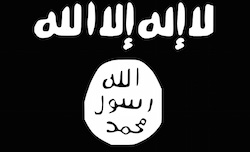
Hamas has reportedly used its underground tunnel system beneath the Gaza-Egypt border to transport aid to ISIS’s Sinai-based affiliate, Wilayat Sinai.Avi Issacharoff, “Under Egypt’s nose, Hamas boosts cooperation with IS in Sinai,” Times of Israel, March 6, 2016, http://www.timesofisrael.com/under-egypts-nose-hamas-boosts-cooperation-with-is-in-sinai/. Hamas has also reportedly provided military training and medical aid to ISIS militants in the Sinai. In 2016, Hamas leader Khaled Meshaal called for a suspension of contacts with Wilayat Sinai as Hamas has moved to reconcile with Egypt. Despite this, the al-Qassam Brigades have continued their coordination with the ISIS affiliate.Avi Issacharoff, “Inside Hamas, a bitter and very personal battle for control,” Times of Israel, March 19, 2016, http://www.timesofisrael.com/inside-hamas-a-bitter-and-very-personal-battle-for-control/; Avi Issacharoff, “Rising new Hamas leader is all too familiar to Israel,” Times of Israel, December 18, 2015, http://www.timesofisrael.com/rising-new-hamas-leader-is-all-too-familiar-to-israel/. Israeli media reported in January 2017 that Wilayat Sinai had opened a media propaganda office in the Gaza Strip. Hamas has also reportedly continued to provide medical aid to wounded ISIS fighters from the Sinai.Avi Issacharoff, “Hamas, Islamic State resume close cooperation despite pressure from Cairo,” Times of Israel, January 15, 2017, http://www.timesofisrael.com/hamas-islamic-state-resume-close-cooperation-despite-pressure-from-cairo/. The Times of Israel reported in February 2017 that “dozens” of top Hamas commanders had defected to Wilayat Sinai in the past three years.Avi Issacharoff, “Elite Hamas commanders defecting to Islamic State,” Times of Israel, February 7, 2017, http://www.timesofisrael.com/elite-hamas-fighters-defecting-to-islamic-state/.
Relations between Hamas and Wilayat Sinai deteriorated in early 2018. That January, Wilayat Sinai released a 22-minute execution video of an alleged Hamas collaborator. Also in the video, an ISIS agent identified as Abu Kazem al-Maqdisi called on ISIS supporters to attack Hamas in Gaza because the group failed to stop U.S. President Donald Trump’s recognition of Jerusalem as Israel’s capital in December 2017. Hamas spokesman Salah Bardawil dismissed the declaration of war as an Israeli plot “in which Arab tools participate to distort the resistance.”Vasudevan Sridharan, “Islamic State issues threats against Hamas with brutal execution video,” International Business Times, January 5, 2018, http://www.ibtimes.co.uk/islamic-state-issues-threats-against-hamas-brutal-execution-video-1653878.
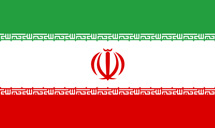
Iran has long been a benefactor of Hamas, providing weapons, training, and money. Though Hamas is a primarily Sunni organization, Iran’s support transcended the Shiite-Sunni divide based on a common enemy in Israel.“Palestinian Territories/Gaza,” United Against Nuclear Iran, accessed January 18, 2017, http://www.unitedagainstnucleariran.com/report/palestinian-territoriesgaza. During the 1990s, Iran was a key financier of Hamas terrorism, providing financial rewards for bombings and higher rewards for higher death tolls.Matthew Levitt, “Hezbollah Finances: Funding the Party of God,” Washington Institute for Near East Policy February 2005, http://www.washingtoninstitute.org/policy-analysis/view/hezbollah-finances-funding-the-party-of-god. In 1993, Iran pledged $30 million in annual support to Hamas. Iran also provided military training and weaponry such as improvised explosive devices, anti-tank munitions, and UAVs.“Palestinian Territories/Gaza,” United Against Nuclear Iran, accessed January 18, 2017, http://www.unitedagainstnucleariran.com/report/palestinian-territoriesgaza. Following Hamas’s electoral victory in the January 2006 Palestinian elections, Iran equipped Hamas with an estimated $23 million a month in financial and military aid, including for governing expenses.Rushdi Abu Alouf, “Gazans squeezed by triple taxes as Hamas replaces lost income,” BBC News, June 20, 2016, http://www.bbc.com/news/world-middle-east-36274631; Robert Tait, “Iran Cuts Hamas Funding over Syria,” Telegraph (London), May 31, 2013, http://www.telegraph.co.uk/news/worldnews/middleeast/palestinianauthority/10091629/Iran-cuts-Hamas-funding-over-Syria.html. In January 2022, Hamas leader Ismail Haniyeh revealed Iran had provided the group with $70 million to develop missiles and defense technology. Haniyeh declared that while multiple countries supported Hamas, Iran was the group’s biggest donor.“Iran Funded Hamas Missiles With $70 Million, Haniyeh Says,” Iran International, March 1, 2022, https://www.iranintl.com/en/202201038619. In April 2024, Israel’s military uncovered correspondence between Hamas deputy leader Yahya Sinwar and deceased Quds Force deputy leader Marwan Issa detailing almost $250 million in Iranian payments to Hamas between 2014 and 2020.Anshel Pfeffer, “Revealed: secret letters that show Iran’s £200m payments to Hamas,” Times (London), April 11, 2024, https://www.thetimes.co.uk/article/iran-hamas-israel-payments-letters-6l6mtpnbw.
The Syrian civil war drove a wedge between Hamas and Iran, as Hamas had voiced support for rebel forces while Iran supports Syrian President Bashar al-Assad. As a result, Iran reportedly cut approximately $10 million a month to Hamas,Rushdi Abu Alouf, “Gazans squeezed by triple taxes as Hamas replaces lost income,” BBC News, June 20, 2016, http://www.bbc.com/news/world-middle-east-36274631. reducing the group’s funding to a “tiny amount” to maintain ties and its support of the Palestinian cause.Robert Tait, “Iran Cuts Hamas Funding over Syria,” Telegraph (London), May 31, 2013, http://www.telegraph.co.uk/news/worldnews/middleeast/palestinianauthority/10091629/Iran-cuts-Hamas-funding-over-Syria.html. Ghazi Hamad, Hamas’s deputy foreign minister, remarked in May 2013: “I cannot deny that since 2006 Iran supported Hamas with money and many [other] things. But the situation is not like the past. I cannot say that everything is normal.”Robert Tait, “Iran Cuts Hamas Funding over Syria,” Telegraph [U.K.], May 31, 2013, http://www.telegraph.co.uk/news/worldnews/middleeast/palestinianauthority/10091629/Iran-cuts-Hamas-funding-over-Syria.html.
The overthrow of Egypt’s pro-Hamas, Brotherhood–controlled government in 2013 left Hamas without a major ally, leading the group to restore its relationship with Iran out of necessity. In 2014, Hamas and Iranian officials began to repair ties. In January 2014, senior Hamas official Bassem Naim claimed that ties between the two “had never been conclusively severed” and that several recent meetings had led to “a marked improvement and progression in the relationship.”Harriet Sherwood, “Hamas and Iran Rebuild Ties Three Years after Falling out over Syria,” Guardian (London), January 9, 2014, http://www.theguardian.com/world/2014/jan/09/hamas-iran-rebuild-ties-falling-out-syria. Taher al-Nounou, an aide to Hamas Prime Minister Ismail Haniyeh, said relations were “almost back to how they were before.”Harriet Sherwood, “Hamas and Iran Rebuild Ties Three Years after Falling out over Syria,” Guardian (London), January 9, 2014, http://www.theguardian.com/world/2014/jan/09/hamas-iran-rebuild-ties-falling-out-syria. That March, Iranian parliament speaker Ali Larijani said that relations between Hamas and Iran had returned to normal and that Iran continues to support Hamas as a “resistance organization.”Elhanan Miller, “Hamas and Iran Admit Increased Cooperation,” Times of Israel, March 12, 2014, http://www.timesofisrael.com/hamas-and-iran-admit-increased-cooperation/.
During the July 2014 Hamas-Israel conflict, Iranian officials admitted that Iran had transferred technology to Hamas to allow the terror group to build its own rockets. “Once upon a time, they [Hamas] needed the arms manufacture know-how and we gave it to them” and Hamas can now “meet their own needs for weapons,” Larijani said.Agence France-Presse, “Iran gave Hamas its rocket know-how, official boasts”, Yahoo News, July 24, 2014, http://news.yahoo.com/iran-gave-hamas-rocket-know-official-boasts-190726914.html. Senior Hamas leader Moussa Abu Marzouk said in July 2015 that all Iranian aid to Hamas’s political and military wings had ceased.Jack Moore, “Iran Ceases Financial Aid to Hamas in Gaza, Officials Claim,” Newsweek, July 28, 2015, http://europe.newsweek.com/iran-ceases-financial-aid-hamas-gaza-official-claims-330889?rx=us. He further accused Iranian officials of lying about support for Hamas, which he said had not received any Iranian money since 2009.“Hamas slams Iranian ‘lies’ of financial, military support,” i24News, January 31, 2016, http://www.i24news.tv/en/news/international/middle-east/101236-160131-hamas-slams-iranian-lies-about-financial-military-support.
Despite this reported breakdown in relations, leaders of Hamas’s military wing have reportedly continued to receive funding from the Iranian government. British-Arab daily Asharq al-Awsat reported in April 2016 that Iran’s Islamic Revolutionary Guard Corps (IRGC) intended to send Hamas forces into Iraq to aid in the liberation of Mosul from ISIS.Maayan Groisman, “Report: Iran looks to deploy Hamas in the battle to liberate Mosul from ISIS,” Jerusalem Post, April 25, 2016, http://www.jpost.com/Middle-East/Iran-News/Report-Iran-to-deploy-Hamas-in-the-battle-for-the-liberation-of-Mosul-from-ISIS-452253. Ahmed Yousef, a Hamas leader and political adviser to former Hamas Prime Minister Ismail Haniyeh, confirmed in January 2016 that Iranian aid to the Qassam Brigades slowed but never stopped completely. According to Yousef, Iran publicly supports Palestinian “resistance forces” as a challenge to the United States and Israel.Ahmad Abu Amer, “Will Iran deal mean more money for Hamas?,” Al-Monitor, January 27, 2016, http://www.al-monitor.com/pulse/originals/2016/01/gaza-hamas-resistance-iran-support.html. After the slowdown in Iranian funding following the Syrian fallout, Hamas military leaders reportedly continued to receive more than $45 million annually from the IRGC, though the figure reportedly represents a decrease in funding. According to anonymous Palestinian leaders cited in Arab media, the relationship between Iran and Hamas’s military wing may have diminished somewhat, but it has never ended.Ariel Ben Solomon, “Palestinian sources say Hamas seeking to repair relations with Iran, report says,” Jerusalem Post, June 30, 2016, http://www.jpost.com/Arab-Israeli-Conflict/Palestinian-sources-say-Hamas-seeking-to-repair-relations-with-Iran-report-says-459228.
In August 2017, Hamas’s political leader in Gaza, Yahya Sinwar, announced that Iran and Hamas had renewed their ties. Sinwar told reporters that ties between Iran and Hamas were “excellent, or very excellent.”Fares Akram and Josef Federman, “New Hamas leader says it is getting aid again from Iran,” Associated Press, August 28, 2017, https://apnews.com/0427f88fe857479caa633fad5683aa96/New-Hamas-leader-says-it-is-getting-aid-again-from-Iran. Sinwar also called Iran the “largest backer financially and militarily” of Hamas.“Hamas leader in Gaza: Ties with Iran now ‘fantastic’; we’re preparing battle for Palestine,” Times of Israel, August 28, 2017, http://www.timesofisrael.com/hamas-leader-in-gaza-ties-with-iran-now-fantastic-were-preparing-battle-for-palestine/. Calling Iranian military support to Hamas “strategic,” Sinwar told reporters that Iran is aiding Hamas in building its “military strength in order to liberate Palestine.”“Hamas leader in Gaza: Ties with Iran now ‘fantastic’; we’re preparing battle for Palestine,” Times of Israel, August 28, 2017, http://www.timesofisrael.com/hamas-leader-in-gaza-ties-with-iran-now-fantastic-were-preparing-battle-for-palestine/.
Less than two weeks after Hamas and rival Fatah signed a reconciliation agreement on October 12, 2017, a Hamas delegation traveled to Tehran to meet with Iranian parliamentary speaker Ali Larijani and other government leaders. Hamas official Saleh Arouri told Iranian media that Hamas would neither give up its weapons nor sever its relationship with Iran.“Hamas deputy leader says to continue Iran ties, armed fight,” Reuters, October 22, 2017, https://www.reuters.com/article/us-israel-palestinians-hamas-iran/hamas-deputy-leader-says-to-continue-iran-ties-armed-fight-idUSKBN1CR0MP. According to Arouri, the visit to Tehran is “a sign of our strong will” for maintaining ties with Iran.“Hamas Never to Recognize Israel: Official,” Tasnim News Agency, October 24, 2017, https://www.tasnimnews.com/en/news/2017/10/24/1554570/hamas-never-to-recognize-israel-official.
Haniyeh traveled to Iran in January 2020 attend the funeral of Qasem Soleimani, the commander of the Quds Force of the Islamic Revolutionary Guard Corps who died in a U.S. airstrike on January 3, 2020. Haniyeh was only one of a handful of people to speak at the funeral. He praised Iran and pledged that the Palestinian resistance would continue. Haniyeh also stood close to Iranian Supreme Leader Ali Khamenei, signaling that Hamas was attempting to restore its relations with Iran. Prior to the funeral, Haniyeh made a condolence call to Iranian Foreign Minister Mohammad Javad Zarif, who pledged that Iran would continue to back “the Palestinian people’s rights and resistance in defense of its land and holy sites.”“Hamas leader praises Soleimani at Tehran funeral in show of support for Iran,” Times of Israel, January 6, 2020, https://www.timesofisrael.com/hamas-leader-praises-soleimani-at-tehran-funeral-in-show-of-support-for-iran/.
In April 2021, Iran reportedly agreed to pay Hamas $30 million per month for intelligence on Israeli missile capabilities, including their locations.“Iran Reportedly Agreed To Pay Hamas For Intelligence On Israeli Missiles,” Iran International, May 11, 2021, https://iranintl.com/en/iran-in-brief/iran-reportedly-agreed-pay-hamas-intelligence-israeli-missiles. On May 9, Haniyeh wrote to Khamenei asking for the Muslim world to continue its support of al-Quds as Hamas remains dedicated to achieving an independent Palestine with al-Quds as its capital.“Hamas chief writes to Leader, asks Muslim world to support al-Quds,” Tehran Times, May 9, 2021, https://www.tehrantimes.com/news/460758/Hamas-chief-writes-to-Leader-asks-Muslim-world-to-support-al-Quds. After Hamas and Israel engaged in an 11-day conflict in May 2021, Haniyeh praised Iran’s role in funding Hamas. According to Haniyeh, Iran “did not hold back with money, weapons and technical support” during the conflict.Press TV, Twitter post, May 22, 2021, 10:40 a.m., https://twitter.com/PressTV/status/1395751344535969794; Tobias Siegal, “Hamas' Haniyeh vows to destabilize Jerusalem, thanks Iran for support,” Jerusalem Post, May 22, 2021, https://www.jpost.com/middle-east/hamas-haniyeh-vows-to-destabilize-jerusalem-thanks-iran-for-support-668791. The following week, Sinwar declared Hamas has “sufficient financial resources… a large part of which are from Iran.”“Hamas Chief Says His Group Has ‘Sufficient’ Money Provided By Iran,” Iran International, May 27, 2021, https://iranintl.com/en/iran-in-brief/hamas-chief-says-his-group-has-sufficient-money-provided-iran.
In July 2023, representatives of Hamas met with a senior commander from the IRGC Quds Force and two Iranian security officials to discuss a response to widespread protests in Israel against the government’s judicial reform legislation. An Iranian diplomat told Reuters the participants concluded the protests had weakened Israel, but they agreed to refrain from “direct interference” to avoid allowing Israeli Prime Minister Benjamin Netanyahu to shift blame for the social upheaval to foreign adversaries. The Hamas source told Reuters there were ongoing discussions between Hamas, Iran, and the Quds Force on the situation and how to “uprade the work of resistance.”Parisa Hafezi, Laila Bassam, and Nidal Al-Mughrabi, “Israel's enemies see opportunity in its crisis,” Reuters, July 26, 2023, https://www.reuters.com/world/middle-east/israels-enemies-see-opportunity-its-crisis-2023-07-25/.
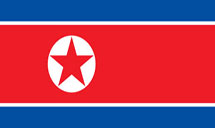
Hamas has allegedly received arms from North Korea. The link first became public after a cargo of North Korean weapons was seized in Bangkok airport in 2009. Investigators later confirmed that the cargo was destined for Iran, from where it was to be smuggled to Lebanon and Gaza. Western security sources also suspect that North Korea has offered Hamas advice on the building of tunnels, which has enabled Hamas to smuggle weapons and fighters in and out of Gaza. In July 2014, reports indicated that Hamas was attempting to buy arms and communication equipment from North Korea in order to continue attacks on Israel. The deal was reportedly worth hundreds of thousands of dollars.Con Coughlin, “Hamas and North Korea in Secret Arms Deal,” Telegraph (London), July 26, 2014, http://www.telegraph.co.uk/news/worldnews/middleeast/palestinianauthority/10992921/Hamas-and-North-Korea-in-secret-arms-deal.html.

Hamas’s leadership based itself in Jordan in the 1990s, and former Hamas leader Khaled Meshaal is himself a Jordanian citizen. In September 1997, Israel reportedly attempted to poison Meshaal, but supplied the antidote after Jordan threatened to reverse its 1994 peace treaty with Israel.“Netanyahu in Spotlight as Assassination Plot Unravels,” CNN, October 5, 1997, https://web.archive.org/web/20080308162315/http://www.cnn.com/WORLD/9710/05/israel/. In 1999, Jordan banned Hamas and arrested several of its leaders.Mike O’Connor, “Jordan Acts To Enforce Hamas Ban,” Washington Post, September 23, 1999, https://www.washingtonpost.com/archive/politics/1999/09/23/jordan-acts-to-enforce-hamas-ban/1742998a-7a9c-4e62-8eb1-25fedf4f7f3e/.Jordan expelled Meshaal and three other Hamas representatives that November.“Jordan Frees Four Jailed Hamas Leaders and Expels Them,” New York Times, November 22, 1999, http://www.nytimes.com/1999/11/22/world/jordan-frees-four-jailed-hamas-leaders-and-expels-them.html.
After a 10-day trip to Jordan in July 2012, Meshaal claimed that Hamas and the Jordanian government had reconciled, though Hamas had committed to not involve Jordan’s Palestinian population in its activities. According to Meshaal, the new relationship focused on four principles: “The safety and stability of Jordan; Hamas’s non-intervention in internal Jordanian affairs; Hamas’ non-intervention in affairs concerning the Muslim Brotherhood in Jordan; and finally on Palestinian-Jordanian relations.”Elhanan Miller, “13 years after king booted it out, Hamas leader says his group has reconciled with Jordan,” Times of Israel, July 9, 2012, http://www.timesofisrael.com/jordan-has-reconciled-with-hamas-khaled-mashaal-says/. In 2013, Jordan reportedly refused a Hamas request to reopen its offices in the kingdom.Khaled Abu Toameh, “King Abdullah Says No to Hamas,” Gatestone Institute, September 17, 2013, https://www.gatestoneinstitute.org/3978/king-abdullah-hamas
In October 2011, Israel released more than 1,000 Palestinian prisoners in an exchange with Hamas for captured IDF soldier Gilad Shalit. Among those released was Jordanian citizen Ahlam Ahmad al-Tamimi, who was serving 16 life sentences for her role in coordinating Hamas’s August 2001 suicide bombing of the Sbarro pizzeria in Jerusalem. The bombing killed 15 and wounded 130. Tamimi was deported to Jordan after her release.Jeffrey Heller and Nidal al-Mughrabi, “Israel and Hamas Agree Prisoner Swap to Free Shalit,” Reuters, October 11, 2011, http://www.reuters.com/article/2011/10/11/us-israel-palestinians-shalit-idUSTRE79A58R20111011; “Individual Charged in Connection With 2001 Terrorist Attack in Jerusalem That Resulted in Death of Americans,” U.S. Department of Justice, March 14, 2017, https://www.justice.gov/opa/pr/individual-charged-connection-2001-terrorist-attack-jerusalem-resulted-death-americans; Avi Issacharoff and Aimee Amiga, “Prisoners Deported Under Shalit Deal Arrive in Turkey, Syria, Jordan, and Qatar,” Haaretz (Tel Aviv), October 19, 2011, https://www.haaretz.com/1.5201410.

The emir of Qatar became the first head of state to visit Gaza after Hamas’s 2007 coup.“Emir of Qatar Become First Head of State to Visit Gaza since Hamas Took Control,” Huffington Post UK, October 23, 2012, http://www.huffingtonpost.co.uk/2012/10/23/emir-of-qatar-historic-visit-to-hamas-gaza_n_2004960.html. Since then, Qatar has invested hundreds of millions of dollars in Gaza, pledging $400 million to Gaza in 2012.“Qatar Ups Gaza Investment to $400 Million,” Agence France-Presse, October 23, 2012, http://tribune.com.pk/story/455921/hamas-qatar-ups-gaza-investment-to-400-million/. After Hamas and Fatah signed a reconciliation agreement in April 2014, the PA refused to pay the salaries of Hamas civil servants in Gaza, and in response Qatar attempted to transfer hundreds of millions of dollars to Hamas to pay the salaries of 44,000 civil servants. The United States reportedly blocked the transfers.Elhanan Miller, “US Blocked Qatari Funds Intended for Hamas Employees,” Times of Israel, July 15, 2014, http://www.timesofisrael.com/us-blocked-qatari-funds-intended-for-hamas-employees/.
Qatar has also hosted former Hamas politburo chief Khaled Meshaal since he left Syria in 2012.Abdullah Rebhy, “Qatar denies it plans to expel Hamas leader Khaled Meshaal,” Associated Press, January 12, 2015,http://bigstory.ap.org/article/04fc2928f3e04a77a1fdd45c24085397/qatar-denies-it-plans-expel-hamas-leader-khaled-mashaal. Qatari officials have referred to Meshaal as a “dear guest.”Peter Kovessy, “Qatar FM: Hamas leader to remain in Doha as ‘dear guest,’” Doha News, January 13, 2015, https://dohanews.co/qatar-fm-hamas-leader-remain-doha-dear-guest/. In June 2017, several Hamas leaders left Qatar amid rumors that the government had expelled them under international pressure. Hamas denied that the government had forced the Hamas leaders to leave.Sue Surkes and agencies, “Hamas commander involved in kidnap of Israeli teens expelled from Qatar,” Times of Israel, June 5, 2017, http://www.timesofisrael.com/hamas-chief-said-involved-in-kidnap-of-israeli-teens-faces-expulsion-from-qatar/;
“Press release issued by Hamas concerning the claims of media outlets regarding the Qatari list,” Hamas website, June 5, 2017, http://hamas.ps/en/post/771/press-release-issued-by-hamas-concerning-the-claims-of-media-outlets-regarding-the-qatari-list. Qatari Foreign Minister Sheikh Mohammed bin Abdulrahman Al Thani called Hamas a “legitimate resistance movement” and defended Hamas’s presence in the country as a “political representation of the Hamas movement” meant to promote Palestinian unity.“Qatari FM: For Arabs, Hamas is a resistance movement,” Al Jazeera, June 10, 2017, http://www.aljazeera.com/news/2017/06/qatari-fm-arabs-hamas-resistance-movement-170610224850422.html. Hamas leader Ismail Haniyeh met with Qatari Emir Sheikh Tamim bin Hamad Al-Thani in Doha on December 16, 2019. The Hamas delegation reported received a warm reception from Al-Thani.Seth J. Frantzman, “Turkey and Qatar give warm embrace to Hamas leaders,” Jerusalem Post, December 17, 2019, https://www.jpost.com/Middle-East/Turkey-and-Qatar-give-warm-embrace-to-Hamas-leaders-611219. In February 2020, Hamas announced Haniyeh would continue to run Hamas’s political bureau from Doha, for the immediate future in order to continue traveling freely through the end of 2020 or early 2021.Khaled Abu Toameh, “Hamas leader Haniyeh decides to settle in Qatar – report,” Jerusalem Post, February 2, 2020, https://www.jpost.com/Middle-East/Hamas-leader-Haniyeh-decides-to-settle-in-Qatar-report-616253l; Ahmed Fouad, “Egypt may find Gaza more appealing without Haniyeh,” Al-Monitor, February 25, 2020, https://www.al-monitor.com/pulse/originals/2020/02/egypt-ban-hamas-haniyeh-return-gaza-iran-qatar.html. Murtaja was sentenced to nine years in prison in 2018.Ami Rojkes Dombe, “Report: Turkish government agency providing funds to Hamas,” Israel Defense (Kfar Saba), February 10, 2021, https://www.israeldefense.co.il/en/node/48273.
During the July 2014 conflict between Hamas and Israel, Qatar and Turkey were considered Hamas’s closest international allies.Mirren Gidda, “Hamas Still Has Some Friends Left,” Time, July 25, 2014, http://time.com/3033681/hamas-gaza-palestine-israel-egypt/; Jonathan Schanzer, “Hamas’s BFFs,” Foreign Policy, August 4, 2014, http://www.foreignpolicy.com/articles/2014/08/04/hamas_s_bffs_turkey_qatar_israel_gaza?wp_login_redirect=0. Qatar drafted a ceasefire proposal in July 2014 that adopted most of Hamas’s demands, and without consideration of Israel’s.Avi Issacharoff, “Qatar’s Ceasefire Offer Adopts Most Hamas Demands,” Times of Israel, July 19, 2014, http://www.timesofisrael.com/qatars-ceasefire-offer-adopts-most-hamas-demands/. Because of their close ties to Hamas, the United States invited Turkey and Qatar to a Paris meeting in mid-July 2014 to discuss a ceasefire between Hamas and Israel. The move drew accusations from the Palestinian Authority and Egypt, suggesting that the United States was attempting to sideline them.Khaled Abu Toameh, “Palestinian Authority Blasts Kerry for ‘Appeasing’ Qatar, Turkey at Ramallah’s Expense,” Jerusalem Post, July 28, 2014, http://www.jpost.com/Operation-Protective-Edge/Palestinian-Authority-blasts-Kerry-for-appeasing-Qatar-Turkey-at-Ramallahs-expense-369091.
Following the October 2017 reconciliation agreement between Hamas and Fatah, rumors emerged that Hamas was dissatisfied with Qatar’s role in the reconciliation talks. Hamas released a statement denying the rumors and praising its relationship with Qatar, which Hamas said has played a “pioneering role” in Gaza that “contributed significantly to prevent the collapse of the Gaza Strip during the years of siege.”“Hamas: No rift with Qatar over Fatah reconciliation,” Al Jazeera, October 22, 2017, http://www.aljazeera.com/news/2017/10/hamas-rift-qatar-fatah-reconciliation-171022152847114.html.
A U.S. lawsuit filed in June 2020 alleged Qatar provided funding to PIJ and Hamas through three Qatari financial institutions, the Qatar Charity, Masraf Al Rayan, and Qatar National Bank. The Qatar Charity is a member of the U.S.-sanctioned Union of Good charity network. All three institutions have links to members of the Qatari royal family. The plaintiffs are friends and family members of 10 U.S. citizens who died in terror attacks in Israel carried out by PIJ and Hamas. The lawsuit alleges Qatar Charity allegedly worked with Masraf Al Rayan bank and Qatar National Bank to forward Hamas and PIJ millions of dollars. It further accuses the Qatari government of coopting “several institutions that it dominates and controls to funnel coveted U.S. dollars (the chosen currency of Middle East terrorist networks) to Hamas and PIJ under the false guise of charitable donations.”Ray Hanania, “Lawsuit names Qatar’s royal family in killings of 10 Americans in Israel,” Arab News, June 11, 2020, https://www.arabnews.com/node/1688051/middle-east; Adam Kredo, “Lawsuit Alleges Qatar Secretly Financed Terror Attacks that Killed Americans,” Washington Free Beacon, June 10, 2020, https://freebeacon.com/national-security/lawsuit-alleges-qatar-secretly-financed-terror-attacks-that-killed-americans/. On June 26, 2020, Qatar transferred $30 million to Hamas. The terror group claimed one-third of the amount would be distributed to 100,000 needy families.Agence France-Presse, “Gaza families receive Qatari financial aid,” Yahoo! News, June 27, 2020, https://news.yahoo.com/gaza-families-receive-qatari-financial-aid-104017621.html.
Since 2018, Qatar has provided $20 million per month—or $240,000,000 a year—in aid to the Gaza Strip. The aid has helped Hamas pay salaries of its civil servants, as well as pay for electricity costs and food assistance programs. On January 31, 2021, the Qatari government announced it would increase its annual assistance to $360 million in the coming year. Despite concerns that Hamas would misuse the money, Israel has agreed to the Qatari aid to stem a humanitarian crisis in Gaza.“Qatar pledges $360 million in aid to Hamas-ruled Gaza,” Associated Press, January 31, 2021, https://apnews.com/article/world-news-israel-qatar-militant-groups-gaza-strip-49a1591f50b183920b5d4310c2098683. After an 11-day conflict between Israel and Hamas in May 2021, Qatar’s emir met with Haniyeh in Doha and pledged continued support for the Palestinian people.Serdar Bitmez and Halime Afra Aksoy, “Qatar ruler, Hamas chief discuss reconstruction of Gaza,” Anadolu Agency, May 23, 2021, https://www.aa.com.tr/en/middle-east/qatar-ruler-hamas-chief-discuss-reconstruction-of-gaza/2251871. After Hamas’s 11-day war with Israel that month, Qatar pledged $500 million in aid toward Gaza’s reconstruction.“Qatar pledges $500m for Gaza reconstruction,” Al Jazeera, May 26, 2021, https://www.aljazeera.com/news/2021/5/26/qatar-pledges-500-million-to-gaza-reconstruction. Hamas’s Gaza leader, Yahya Sinwar, pledged Hamas would not touch any international aid pledged toward Gaza’s reconstruction.“Hamas leader says group won’t touch Gaza reconstruction aid,” Al Jazeera, May 26, 2021, https://www.aljazeera.com/news/2021/5/26/hamas-leader-says-group-wont-touch-gaza-aid. On November 30, 2021, Hamas, Qatar, and Egypt announced a new deal for Qatar to pay the salaries of Hamas’s public servants in Gaza. Under the plan, Qatar will send up to $10 million worth of fuel each month to Egypt, which will transfer the fuel to Gaza for Hamas to resell to Palestinian gas stations and use the proceeds to pay its civil servants.“Hamas announces deal for Qatar to subsidize Gaza public employees,” Times of Israel, November 30, 2021, https://www.timesofisrael.com/hamas-announces-deal-for-qatar-to-subsidize-gaza-public-employees/; Fares Akram, “Hamas: Qatar paying public salaries by sending fuel to Gaza,” Associated Press, November 30, 2021, https://apnews.com/article/business-africa-israel-egypt-qatar-167abbe0cf82ab374e3fc1c0c84ca1fa; Nidal Al-Mughrabi, “Hamas official says Qatar enables fuel-to-cash scheme for Gaza civil servants,” Reuters, November 22, 2021, https://www.reuters.com/world/middle-east/hamas-official-says-qatar-enables-fuel-to-cash-scheme-gaza-civil-servants-2021-11-22/.
On October 7, 2023, Hamas launched a surprise attack on Israel that resulted in the deaths of at least 1,200 people and the kidnapping of at least 240 men, women, and children.Josef Federman and Issam Adwan, “Hamas surprise attack out of Gaza stuns Israel and leaves hundreds dead in fighting, retaliation,” Associated Press, October 7, 2023, https://apnews.com/article/israel-palestinians-gaza-hamas-rockets-airstrikes-tel-aviv-11fb98655c256d54ecb5329284fc37d2; Nidal Al-Mughrabi and Maytaal Angel, “Israel says its forces operating in ‘heart of Gaza City,’” Reuters, November 8, 2023, https://www.reuters.com/world/middle-east/israel-says-it-is-open-gaza-fighting-pauses-aid-hostages-2023-11-07/; Lauren Frayer, “Israel revises down its death toll from the Oct. 7 Hamas attacks to about 1,200,” NPR, November 11, 2023, https://www.npr.org/2023/11/11/1212458974/israel-revises-death-toll-hamas-attacks-oct-7. Haniyeh and other Hamas leaders watched the attack unfold from Haniyeh’s office in Doha. Haniyeh then issued a press statement calling the attack a response to Israeli crimes after several warnings by Hamas. While watching the news reports, Haniyeh and other leaders reportedly cheered with joy and then prostrated themselves in gratitude before God. Haniyeh praised the attack as the start of a new era in the Israeli-Palestinian conflict.Matt Drake, “How Hamas leader Ismail Haniyeh watched attack on Israel on TV from his office in Qatar as he celebrated with other officials,” Daily Mail (London), October 8, 2023, https://www.dailymail.co.uk/news/article-12608271/How-Hamas-leader-Ismail-Haniyeh-watched-attack-Israel-TV-office-Qatar-celebrated-officials.html; Hamas Online, Telegram, October 7, 2023. The initial October 7 attack killed at least 250 people in Israel. Qatar joined with Saudi Arabia and Iran in blaming Israel for the October 7 Hamas attack. According to a Qatari government statement, Qatar’s Ministry of Foreign Affairs held Israel “solely responsible for the ongoing escalation due to its ongoing violations of the rights of the Palestinian people, the latest of which was the repeated incursions into Al-Aqsa Mosque under the protection of the Israeli police.”“Qatar Expresses Concern over the Developments in Gaza Strip and Calls for De-escalation,” Qatari Ministry of Foreign Affairs, October 7, 2023, https://www.mofa.gov.qa/en/statements/qatar-expresses-concern-over-the-developments-in-gaza-strip-and-calls-for-de-escalation; Nick Robertson, “Saudi Arabia, Qatar, Iran say Israel has only itself to blame for Hamas attacks,” Hill, October 7, 2023, https://thehill.com/policy/international/4243388-saudi-arabia-qatar-iran-blame-israel-hamas-attacks/. That night, Qatari officials claimed they had begun mediation talks to convince Hamas to release captive women and children for Palestinian security prisoners in Israel. Israel denied negotiations were underway.Andrew Mills and Nidal Al-Mughrabi, “Qatar in talks with Hamas, Israel to swap hostages for prisoners,” Reuters, October 9, 2023, https://www.reuters.com/world/middle-east/qatar-leads-talks-swap-hamas-held-hostages-palestinians-israeli-jails-2023-10-09/. On October 20, Hamas freed two hostages—an American mother and daughter—after Qatari intervention. Hamas said it released the hostages for “humanitarian reasons.”“Hamas releases two American hostages from Gaza after Qatari mediation,” Al Jazeera, October 20, 2023, https://www.aljazeera.com/news/2023/10/20/hamas-releases-two-american-hostages-from-gaza. On October 24, Qatari Emir Sheikh Tamim Bin Hamad Al-Thani accused Israel of receiving an “unconditional green light and free license to kill.”“Qatar’s ruling emir says Israel shouldn’t have a ‘green light’ to kill,” Associated Press, October 24, 2023, https://apnews.com/israel-hamas-war-live-updates-10-21-23#0000018b-612b-db46-afaf-ed7fce6d0000. As of November 8, Hamas had released four hostages—two Americans and two Israelis—because of Qatari mediation.Daniel Estrin, Samantha Balaban, and Jaclyn Diaz, “What will it take to free the hostages in Gaza? Many Israelis support a prisoner swap,” NPR, November 7, 2023, https://www.npr.org/2023/11/07/1210775385/israel-hamas-gaza-hostages-prisoner-exchange#:~:text=Hamas%20has%20so%20far%20released,deal%20is%20on%20the%20table.
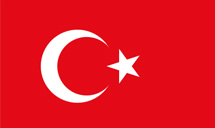
Turkey and Hamas maintain close political and financial ties. According to a December 2019 report in British media, Hamas has continued to use Istanbul as a planning base for terrorist activities. At least a dozen Hamas members moved to Istanbul in 2019, according to Israeli and Egyptian intelligence. This includes U.S.-designated financiers such as Kamal Awad, and military leaders who planned spats of suicide bombings in Israel in the 1990s. Turkey has continued to deny that Hamas is a terrorist organization. Turkish intelligence agents reportedly maintain close contact with Hamas operatives in Istanbul.Raf Sanchez, “Exclusive: Hamas plots attacks on Israel from Turkey as Erdogan turns blind eye,” Telegraph (London), December 17, 2019, https://www.telegraph.co.uk/news/2019/12/17/hamas-plots-attacks-israel-turkey-erdogan-turns-blind-eye/.
The Turkish government has welcomed Hamas’s leadership in the country for high-level meetings with Turkish officials, including Turkish President Recep Tayyip Erdoğan. The meeting included Hamas political leader Ismail Haniyeh, who left the Gaza Strip for the first time in three years.“Hamas leader Ismail Haniyeh visits Turkey, meets with Erdogan,” Jerusalem Post, December 15, 2019, https://www.jpost.com/Middle-East/Hamas-leader-Ismail-Haniyeh-visits-Turkey-meets-Erdogan-610942. The meeting also included Hamas deputy leader Saleh al-Arouri. Both Arouri and Haniyeh are under U.S sanctions and have rewards for their arrest. Nonetheless, they moved about freely in Turkey. Following the meeting, Erdoğan told media that Turkey “will keep on supporting our brothers in Palestine.”Raf Sanchez, “Exclusive: Hamas plots attacks on Israel from Turkey as Erdogan turns blind eye,” Telegraph (London), December 17, 2019, https://www.telegraph.co.uk/news/2019/12/17/hamas-plots-attacks-israel-turkey-erdogan-turns-blind-eye/.
Turkey has also provided Hamas with financial support. The country reportedly planned to donate $300 million to Gaza’s Hamas government in 2011,Saed Bannoura, “Turkey to Grant Hamas $300 Million,” International Middle East Media Center, December 3, 2011, http://www.imemc.org/article/62607. while other reports cited that this would become an annual donation to Hamas.Zvi Bar’el, “Turkey May Provide Hamas with $300 Million in Annual Aid,” Haaretz, January 28, 2012, http://www.haaretz.com/news/diplomacy-defense/turkey-may-provide-hamas-with-300-million-in-annual-aid-1.409708. In February 2017, Israel arrested Muhammad Murtaja, the Gaza coordinator of the Turkish Cooperation and Development Agency (TIKA), on charges of fundraising for Hamas’s military wing.Yona Jeremy Bob and staff, “Israel arrests head of Turkish humanitarian group in Gaza for financing Hamas,” Jerusalem Post, March 21, 2017, https://www.jpost.com/Arab-Israeli-Conflict/Head-of-Turkish-aid-group-in-Gaza-arrested-by-Israel-funneled-humanitarian-funds-to-Hamas-484771. A year later in February 2018, Israeli authorities arrested a Turkish citizen and an Arab-Israeli suspected of fundraising and laundering money on behalf of Hamas.Judah Ari Gross, “Shin Bet accuses Turkey of allowing Hamas to raise, launder money,” Times of Israel, February 12, 2018, https://www.timesofisrael.com/arab-israeli-man-turkish-citizen-arrested-for-helping-to-fund-hamas/. Following that arrest, a Hamas official in Lebanon praised Turkey’s “loyalty” to the Palestinian people.Mahmut Geldi, “Hamas spokesman hails Turkish ‘loyalty’ to Palestine,” Anadolu Agency, March 1, 2019, https://www.aa.com.tr/en/middle-east/hamas-spokesman-hails-turkish-loyalty-to-palestine/1406697.
During the July 2014 conflict between Hamas and Israel, Qatar and Turkey were considered Hamas’s closest international allies.Mirren Gidda, “Hamas Still Has Some Friends Left,” Time, July 25, 2014, http://time.com/3033681/hamas-gaza-palestine-israel-egypt/; Jonathan Schanzer, “Hamas’s BFFs,” Foreign Policy, August 4, 2014, http://www.foreignpolicy.com/articles/2014/08/04/hamas_s_bffs_turkey_qatar_israel_gaza?wp_login_redirect=0. Qatar drafted a ceasefire proposal in July 2014 that adopted most of Hamas’s demands, and without consideration of Israel’s.Avi Issacharoff, “Qatar’s Ceasefire Offer Adopts Most Hamas Demands,” Times of Israel, July 19, 2014, http://www.timesofisrael.com/qatars-ceasefire-offer-adopts-most-hamas-demands/. Because of their close ties to Hamas, the United States invited Turkey and Qatar to a Paris meeting in mid July 2014 to discuss a ceasefire between Hamas and Israel. The move drew accusations from the Palestinian Authority and Egypt that the United States was attempting to sideline them.Khaled Abu Toameh, “Palestinian Authority Blasts Kerry for ‘Appeasing’ Qatar, Turkey at Ramallah’s Expense,” Jerusalem Post, July 28, 2014, http://www.jpost.com/Operation-Protective-Edge/Palestinian-Authority-blasts-Kerry-for-appeasing-Qatar-Turkey-at-Ramallahs-expense-369091.
On August 12, 2015, then-political chief Khaled Meshaal met with Turkish leaders in Ankara, Turkey. The specifics of the meeting were not publicly revealed.“Hamas chief meets Turkish leaders in Ankara,” Middle East Eye, August 13, 2015, http://www.middleeasteye.net/news/hamas-chief-meets-turkish-leaders-ankara-458667089. Arab media reported in December 2015 that Hamas’s top leader in Turkey had been expelled under U.S. and Israeli pressure as the Turkish and Israeli governments moved toward reconciliation. Hamas denied the reports.Khaled Abu Toameh, “Source: Top Hamas operative has left Turkey following heavy US, Israeli pressure,” Jerusalem Post, December 21, 2015, http://www.jpost.com/Middle-East/Source-Top-Hamas-operative-has-left-Turkey-following-heavy-US-Israeli-pressure-437969. Later that month, Hamas denied rumors that Turkey intended to take control of Gaza.Lee Gancman, “Hamas denies rumors of Turkish designs on Gaza,” Times of Israel, December 29, 2015, http://www.timesofisrael.com/hamas-denies-rumors-of-turkish-designs-on-gaza/. In the June 2016 reconciliation agreement between Israel and Turkey, the Turkish government agreed not to allow fundraising for Hamas within its territory.Herb Keinon, “Israel, Turkey officially reconcile: Netanyahu says Gaza blockade to remain,” Jerusalem Post, June 27, 2016, http://www.jpost.com/Israel-News/Politics-And-Diplomacy/Netanyahu-Israel-to-uphold-Gaza-blockade-after-Turkey-deal-457868. Hamas rejected the reconciliation agreement, but reportedly acceded to Turkish demands that it not react.Stuart Winer, “Hamas rejects Israel-Turkey deal, but heeds Turkish call not to make a fuss,” Times of Israel, June 28, 2016, http://www.timesofisrael.com/behind-the-scenes-hamas-rejects-israel-turkey-reconciliation/.
Despite Turkey’s agreements to curb Hamas activities in the country, senior Hamas leaders based in Istanbul have reportedly continued to direct terror operations in Jerusalem and the West Bank from the Turkish city. A Hamas official in Istanbul, Zacharia Najib, reportedly ordered failed assassination attempts on Israeli government officials in February 2019. Najib provided weapons, training, and funding to a Hamas member in Jerusalem who was arrested before he could carry out the plot. A Turkish diplomat at the time called Hamas a legitimate political party and denied it had any links to terrorism.Raf Sanchez, “Exclusive: Hamas plots attacks on Israel from Turkey as Erdogan turns blind eye,” Telegraph (London), December 17, 2019, https://www.telegraph.co.uk/news/2019/12/17/hamas-plots-attacks-israel-turkey-erdogan-turns-blind-eye/. In 2018, Hamas reportedly created a secret cyberwarfare and counter-intelligence headquarters in Istanbul. The British Times newspaper revealed details of the network in October 2020. Reportedly, Gaza-based Hamas agent Samakh Saraj runs the network without the knowledge of Turkish officials and separately from Hamas’s offices in the city. According to the Times, the network coordinates cyber-operations against Hamas’s enemies in the Arab world, including the Palestinian Authority and Middle Eastern and European embassies of countries such as Saudi Arabia and the United Arab Emirates. The network also surveils and sometimes interrogates Hamas members suspected of disloyalty.Anshel Pfeffer, “Hamas uses secret cyberwar base in Turkey to target enemies,” Times (London), October 22, 2020, https://www.thetimes.co.uk/article/hamas-running-secret-cyberwar-hq-in-turkey-29mz50sxs.
In August 2020, Turkey reportedly began granting citizenship to a dozen high-ranking Hamas members in the country. According to the Telegraph, those receiving citizenship are “the most senior Hamas operatives outside of Gaza. [They] are actively raising funds and directing operatives to carry out attacks in the present day.” The Turkish government refused comment and called the accusations baseless.Tuvan Gumrukcu, “Turkey gave Hamas members passports, Israel says,” Reuters, August 26, 2020, https://www.reuters.com/article/us-turkey-israel-hamas/turkey-gave-hamas-members-passports-israel-says-idUSKBN25M1XW; Cody Levine, “Turkey gave citizenship to Hamas members planning terror attacks – report,” Jerusalem Post, August 15, 2020, https://www.jpost.com/middle-east/turkey-gave-citizenship-to-hamas-members-planning-terror-attacks-report-638731. In February and August of 2020, Turkey’s government hosted Hamas leader Ismail Haniyeh and other Hamas leaders. The United States condemned Turkey’s “continued outreach” to Hamas.“U.S. slams Turkey's Erdogan for hosting Hamas,” Reuters, August 25, 2020, https://www.reuters.com/article/us-usa-turkey-hamas/u-s-slams-turkeys-erdogan-for-hosting-hamas-idUSKBN25L29N. Turkey denies Hamas maintains an office in the country. In December 2020, Hamas leader Ismail Haniyeh wrote to Erdoğan and other regional leaders to warn against any normalization with Israel“Turkey’s ties to Hamas risk hindering normalization with Israel,” Arab News, January 19, 2021, https://www.arabnews.com/node/1795236/middle-east. In January 2021, Israel demanded Turkey close Hamas’s offices in the country as a condition of the two countries’ reconciliation. Turkish Foreign Minister Mevlut Cavusoglu responded Israel should halt its annexations of Palestinian land if it wants normalization.“Israel demands Turkey close Hamas office as condition for improving ties,” Middle East Monitor, January 19, 2021, https://www.middleeastmonitor.com/20210119-israel-demands-turkey-close-hamas-office-as-condition-for-improving-ties/.
Hamas has also used Turkey-based agents and Turkish companies to transfer money and goods to the West Bank and Gaza. In January 2021, Israeli authorities seized more than $120,000 from the bank accounts of four individuals and two companies allegedly part of a scheme to transfer money from Hamas operatives in Turkey to the West Bank using West Bank-based company Sense Sanitary Company and Turkish company Tikkno Plus Ic Ve Dis. The companies are jointly owned by Hamas operatives Abdallah Fuqaha in Turkey and Ayman al-Massri in the West Bank.Judah Ari Gross, “Israel seizes money, goods it says Hamas was sending from Turkey to West Bank,” Times of Israel, February 15, 2021, https://www.timesofisrael.com/israel-seizes-money-goods-it-says-hamas-was-sending-from-turkey-to-west-bank/; Ami Rojkes Dombe, “Once again, funds illegally transferred from Turkey to Hamas in Gaza,” Israel Defense (Kfar Saba), February 15, 2021, https://www.israeldefense.co.il/en/node/48341. That month, Israel demanded Turkey end Hamas’s military activities in Istanbul before the two could countries fully restore diplomatic ties.“Turkey’s ties to Hamas risk hindering normalization with Israel,” Arab News, January 19, 2021, https://www.arabnews.com/node/1795236/middle-east.
During Hamas’s 21-day conflict with Israel in May 2021, Turkish officials issued statements seemingly in support of Hamas. Erdoğan referred to Israel as a “terror state,” while Vice President Fuat Oktay called on Muslim nations to “take a clear stance” against Israel’s strikes on the Gaza Strip.“Turkey calls on Muslims to take clear stance over Gaza,” Reuters, May 13, 2021, https://www.reuters.com/world/middle-east/turkey-calls-muslims-take-clear-stance-over-gaza-2021-05-13/. Though Turkey was not a party to ceasefire talks during that conflict, Erdoğan maintained open communications with Hamas’s leaders and reassured Haniyeh of Turkey’s continued support for the Palestinian people.Mehmet Tosun, “Turkey’s Erdogan speaks over phone with Palestinian president, Hamas chief,” Anadolu Agency, May 10, 2021, https://www.aa.com.tr/en/middle-east/turkey-s-erdogan-speaks-over-phone-with-palestinian-president-hamas-chief/2235820.
On November 20, 2021, Haniyeh praised Turkey for its “critical” role providing political support for Hamas and the Palestinian cause.“Turkey's role ‘critical’ for Palestinian cause at political level,” Daily Sabah (Istanbul), November 21, 2021, https://www.dailysabah.com/politics/turkeys-role-critical-for-palestinian-cause-at-political-level/news. On November 21, Hamas member Sheikh Fadi Abu Shkhaydam killed one and wounded four during a shooting attack in Jerusalem’s Old City. According to Israeli security, Shkhaydam had visited Turkey prior to the attack and allegedly received instructions from Hamas leaders in that country. Shkhaydam’s family denied he had met with Hamas in Turkey, instead claiming he had gone to visit his son who is studying in the country.Khaled Abu Toameh, “Who was the Islamic ‘scholar’ who carried out the Jerusalem attack?,” Jerusalem Post, November 22, 2021, https://www.jpost.com/israel-news/who-was-the-islamic-scholar-who-carried-out-the-jerusalem-attack-685588?_ga=2.208174480.369480656.1636311589-1969581575.1579377799&utm_source=ActiveCampaign&utm_medium=email&utm_content=Who+was+the+Islamic++scholar++who+carried+out+the+Jerusalem+attack%3F&utm_campaign=November+21%2C+2021+Night; Rina Bassist, “Israel calls on Ankara to close Hamas offices in Turkey,” Al-Monitor, November 23, 2021, https://www.al-monitor.com/originals/2021/11/israel-calls-ankara-close-hamas-offices-turkey. On November 22, Israel’s Shin Bet security organization announced it had broken up a Hamas cell in the West Bank and seized explosive belts, weapons, and an undisclosed amount of money. The Shin Bet accused Arouri and Zacharia Najib—released during the 2011 Gilad Shalit prisoner swap—of directing the cell from Turkey. Israeli Foreign Minister Yair Lapid called on the Turkish government to close Hamas’s offices in the country.Judah Ari Gross, “Shin Bet: Forces thwart major Hamas terror plans, nab more than 50 cell members,” Times of Israel, November 22, 2021, https://www.timesofisrael.com/shin-bet-forces-thwart-major-hamas-terror-plans-nab-dozens-of-members/; “After Jerusalem killing and 50 terror arrests, Lapid urges Turkey to shut down Hamas,” Times of Israel, November 23, 2021, https://www.timesofisrael.com/after-jerusalem-killing-and-50-terror-arrests-lapid-urges-turkey-to-shut-down-hamas/. In response, Erdoğan has sent mixed messages to Israel, with whom Turkey was earlier that month negotiating for the release of two Israeli tourists accused of espionage in Turkey. A November 24 statement from Erdoğan accused Israel of “oppressive” policies regarding the Palestinians and his government “must work with all our might to preserve the status and sanctity of Jerusalem, the capital of Palestine.”“In fresh broadside, Erdogan slams Israel’s ‘oppressive’ treatment of Palestinians,” Times of Israel, November 24, 2021, https://www.timesofisrael.com/in-fresh-broadside-erdogan-slams-israels-oppressive-treatment-of-palestinians/.
With new U.S. and Israeli governments taking office in 2021, Turkey began sending reconciliatory signals to Israel. On November 29, without referencing Hamas, Erdoğan announced Turkey would seek to improve its relations with Israel.“Erdogan says Turkey will move to improve ties with Egypt, Israel,” Al-Monitor, November 29, 2021, https://www.al-monitor.com/originals/2021/11/erdogan-says-turkey-will-move-improve-ties-egypt-israel. That December, a senior Turkish official told Al-Monitor that ending Hamas’s operations in Turkey “is not even an option open for negotiation for us.”Pinar Tremblay, “Turkey not yet ready to give up on Muslim Brotherhood,” Al-Monitor, December 12, 2021, https://www.al-monitor.com/originals/2021/12/turkey-not-yet-ready-give-muslim-brotherhood. In February 2022, Turkish Foreign Minister Mevlut Cavusoglu declared Turkey would not turn its back on the Palestinians to improve relations with Israel.“Turkey says it will not abandon Palestinian support for closer ties to Israel,” Reuters, February 8, 2022, https://www.reuters.com/world/middle-east/turkey-says-it-will-not-abandon-palestinian-support-closer-ties-israel-2022-02-08/. Nonetheless, the two countries exchanged high-level diplomatic delegations that month ahead of a planned March 2022 visit to Turkey by Israeli President Isaac Herzog. Israeli officials have continued to stress that any normalization between the countries must include limiting Hamas’s activities in Turkey.Barak Ravid, “Israeli president plans to accept invitation to visit Erdoğan,” Axios, January 26, 2022, https://www.axios.com/israeli-president-herzog-invitation-turkey-erdogan-237c4572-cb03-4b73-8d3f-dc3a4f6cffe1.html; “Turkey sending senior officials to Israel ahead of Herzog visit,” Reuters, February 15, 2022, https://www.reuters.com/world/middle-east/turkey-sending-senior-officials-israel-ahead-herzog-visit-2022-02-15/.
In late April 2022, a Palestinian official told Israel Hayom that Turkey had deported dozens of identified Hamas members at Israel’s request in recent months. According to the Palestinian official, the Turkish government told Hamas “economic interests” were at play and Hamas had violated its agreement not to conduct terrorist activities from Turkey. The Lebanese newspaper Al-Akhbar confirmed the report.“Turkey extradites Hamas members to Israel,” i24News, April 27, 2022, https://www.i24news.tv/en/news/middle-east/levant-turkey/1651051066-turkey-extradite-hamas-members-to-israel; Dana Ben-Shimon, “‘Turkey deporting Hamas members at Israel’s request,’” Israel Hayom (Tel Aviv), April 27, 2022, https://www.israelhayom.com/2022/04/27/turkey-deporting-hamas-members-at-israels-request/. In early November 2022, Turkish Foreign Minister Mevlut Cavusoglu rejected an October Israeli request to expel Hamas leaders living in Turkey. According to Cavusoglu, Turkey does not see Hamas “as a terrorist organization.”Media Line, “Turkey refuses Israel's request to deport Hamas terrorists,” Jerusalem Post, November 13, 2022, https://www.jpost.com/middle-east/article-722299; “Turkiye rejects Israel's request to deport Hamas leaders,” Middle East Monitor, November 10, 2022, https://www.middleeastmonitor.com/20221110-turkiye-rejects-israels-request-to-deport-hamas-leaders/.
On December 13, 2023, the United States sanctioned eight Hamas leaders “who perpetuate Hamas’s violent agenda by representing the group’s interests abroad and managing its finances.”“U.S. And UK Target Additional Hamas Finance Officials and Representatives,” U.S. Department of the Treasury, December 13, 2023, https://home.treasury.gov/news/press-releases/jy1981. The designations included Turkey-based financiers Haroun Nasser Al-Din and Mehmet Kaya. The United States also sanctioned Hamas’s representative to Turkey, Jihad Yaghmour.“U.S. And UK Target Additional Hamas Finance Officials and Representatives,” U.S. Department of the Treasury, December 13, 2023, https://home.treasury.gov/news/press-releases/jy1981. Hamas condemned the sanctions as “collusion” with Israel against the Palestinian people and “demonization of its legitimate resistance.”Hamas statement, Hamas Online Telegram Channel, December 13, 2023.
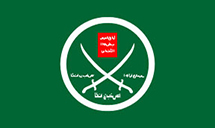
The Muslim Brotherhood has built grassroots support among Palestinians with the creation of charities in the Gaza Strip in 1960.Paola Caridi, Hamas: From Resistance to Government, (New York: Seven Stories Press, 2012), 53. Hamas was created in 1987 as the Palestinian branch of the Muslim Brotherhood in Gaza.“The Covenant of the Islamic Resistance Movement,” Avalon Project, Yale Law School, accessed August 13, 2014, http://avalon.law.yale.edu/20th_century/hamas.asp. More than two decades later, Hamas continues to enjoy close ties to the Brotherhood. Hamas members were suspected of aiding in a jailbreak of Brotherhood activists, including former Egyptian president Mohammed Morsi, in 2011.“Morsi Faces Court over Egypt Prison Break,” Al Jazeera, January 28, 2014, http://www.aljazeera.com/news/middleeast/2014/01/morsi-arrives-trial-over-egypt-jailbreak-20141287589134944.html. The Brotherhood-controlled Egyptian government in 2013 reportedly provided Hamas with support and turned a blind eye to illegal smuggling beneath the Egypt-Gaza border. After the downfall of the Brotherhood-controlled government that year, the Egyptian army closed off most of the tunnels, resulting in the loss of millions of dollars in revenue for the Hamas government and an economic crisis in Gaza.Karin Laub and Ibrahim Barzak, “Hamas in Worst Cash Crisis since Seizing Gaza,” Associated Press, March 13, 2014, http://news.yahoo.com/hamas-worst-cash-crisis-since-seizing-gaza-181239758.html.
In January 2014, Cairo publicly hosted the first conference of Tamarud (“Rebellion”), a new anti-Hamas youth group.Yasmine Saleh, “Court Bans Activities of Islamist Hamas in Egypt,” Reuters, March 4, 2014, http://www.reuters.com/article/2014/03/04/us-egypt-hamas-idUSBREA230F520140304. In March 2014, Egypt banned all activities by Hamas following a lawsuit against the group due to its connections to the Muslim Brotherhood.“Court in Egypt bans Palestinian group Hamas,” BBC News, March 4, 2014, http://www.bbc.com/news/world-middle-east-26432122.
In March 2016, Egypt’s Interior Ministry accused Hamas of conspiring with the Muslim Brotherhood and coordinating the June 2015 assassination of Hisham Barakat, Egypt’s chief prosecutor, in a Cairo car bombing. Later that month, Hamas removed all pictures of former Egyptian President Mohamed Morsi and any other signs of Muslim Brotherhood links from its Gaza offices. The move reportedly came after a meeting between Hamas leaders and Egypt officials who demanded Hamas renounce its links with the Brotherhood before Egypt would restore relations with Hamas.“Hamas removes picture of Morsi, Muslim Brotherhood in Gaza,” Middle East Monitor, March 22, 2016, https://www.middleeastmonitor.com/news/middle-east/24610-hamas-removes-picture-of-morsi-muslim-brotherhood-in-gaza. Hamas spokesman Sami Abu Zuhri later denied any links between his group and the Muslim Brotherhood.Jack Khoury, “Hamas Denies Links With Muslim Brotherhood in Egypt and Elsewhere,” Haaretz (, March 23, 2016, http://www.haaretz.com/middle-east-news/.premium-1.710423.
In May 2017, Hamas released a new guiding political document, which made no mention of the Muslim Brotherhood.“Document of General Principles & Policies,” Hamas, May 1, 2017, http://hamas.ps/en/post/678/a-document-of-general-principles-and-policies; Patrick Wintour, “Hamas presents new charter accepting a Palestine based on 1967 borders,” Guardian (London), May 1, 2017, https://www.theguardian.com/world/2017/may/01/hamas-new-charter-palestine-israel-1967-borders.
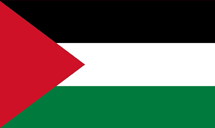
Hamas has remained separate from the PLO, emerging in the late 1980s when the PLO began to moderate its positions in order to launch a peace process with Israel. In 1996, Hamas contemplated joining the Palestinian Authority government but ultimately decided to remain apart.Jonathan Schanzer, “The Challenge of Hamas to Fatah,” Washington Institute for Near East Policy, Spring 2003, http://www.washingtoninstitute.org/policy-analysis/view/the-challenge-of-hamas-to-fatah.
In the power-vacuum that followed PLO leader Yasser Arafat’s death in 2004, Hamas ran in the January 2006 PA legislative elections and won a majority in the PA Legislative Council. After a year of clashes between Hamas and Fatah gunmen, Hamas expelled the PA’s forces from Gaza and took control of the coastal strip. In April 2014, the PLO and Hamas signed a reconciliation agreement and pledged to form a unity government.Jodi Rudoren and Michael R. Gordon, “Palestinian Rivals Announce Unity Pact, Drawing U.S. and Israeli Rebuke,” New York Times, April 23, 2014, http://www.nytimes.com/2014/04/24/world/middleeast/palestinian-factions-announce-deal-on-unity-government.html. The move helped derail U.S.-led peace talks between Israel and the PLO.
The sides failed to implement the reconciliation agreement, however, resulting in a continued split between the Palestinian Authority in the West Bank and Hamas in Gaza. At least five reconciliation agreements to date have failed. Hamas and the PA argue over who would retain control of Gaza’s border crossings and assume responsibility for paying the salaries of civil servants.Adnan Abu Amer, “Another Hamas-Fatah reconciliation agreement bites the dust,” Al-Monitor, March 1, 2016, http://www.al-monitor.com/pulse/originals/2016/03/palestinian-reconciliation-hamas-fatah-qatar-meeting.html.
Hamas agreed to join the PLO in 2011 and 2014 under failed reunification deals with the Fatah-led PA. On November 2, 2016, Khaled Meshaal called for Hamas to join the PLO. In response, a senior PLO member told Israeli media that the PLO wants to bring Hamas under its wings.Dov Lieber, “Hamas looks to join PLO, marking major unification step,” Times of Israel, November 2, 2016, http://www.timesofisrael.com/hamas-head-makes-unprecedented-call-for-group-to-join-plo/.
In January 2017, after unofficial talks in Moscow hosted by Russia, Hamas and Fatah announced an agreement to form a unity government.Agence France-Presse, “Hamas, Fatah announce deal to form Palestinian unity government,” Times of Israel, January 17, 2017, http://www.timesofisrael.com/hamas-fatah-agree-to-form-palestinian-unity-government/?utm_source=The+Times+of+Israel+Daily+Edition&utm_campaign=47ba7211d8-EMAIL_CAMPAIGN_2017_01_18&utm_medium=email&utm_term=0_adb46cec92-47ba7211d8-55118405. The parties agreed to form a new National Council that includes Palestinians in exile, and hold new elections. Palestinian Islamic Jihad (PIJ) and other violent Palestinian factions agreed to the reconciliation, but the parties did not set a timetable for moving forward.“Fatah and Hamas to form unity government,” Al Jazeera, January 18, 2017, http://www.aljazeera.com/news/2017/01/fatah-hamas-form-unity-government-170118031339203.html.
In June 2017, in a move to pressure Hamas to reconcile, the PA ended payments to Israel for the Gaza Strip’s electricity supply. The PA blamed Hamas for failing to reimburse it for paying for Gaza’s electricity. The PA called for Hamas to return Gaza’s governance back to the PA.Nidal al-Mughrabi and Jeffrey Heller, “Israel reduces power supply to Gaza, as Abbas pressures Hamas,” Reuters, June 12, 2017, https://www.reuters.com/article/us-israel-palestinians-power/israel-reduces-power-supply-to-gaza-as-abbas-pressures-hamas-idUSKBN1931XK. That September, Hamas announced its intention to dissolve its government in Gaza and called on the PA to immediately resume responsibility for the Gaza Strip. Hamas agreed to the PA’s demand to hold new parliamentary elections in the West Bank and Gaza for the first time since 2006. The move followed talks in Cairo between Hamas and the Egyptian government.Fares Akram, “Hamas invites Abbas to resume control of Gaza,” Associated Press, September 20, 2017, https://apnews.com/e8438c54e9384220a423bcd33ed7fa5c/Hamas-invites-Abbas-to-resume-control-of-Gaza;
Mohamed Daraghmeh, “Hamas says it accepts reconciliation demands,” Associated Press, September 17, 2017, https://apnews.com/aec26df1cc2740c791033b3637e82d27/Hamas-says-it-accepts-reconciliation-demands;
Dov Lieber, “Abbas talks reconciliation with Hamas leader, but is mum on ending sanctions,” Times of Israel, September 18, 2017, https://www.timesofisrael.com/abbas-talks-reconciliation-with-hamas-leader-but-is-mum-on-ending-sanctions/;
“Press Release issued by Hamas,” Hamas website, September 17, 2017, http://hamas.ps/en/post/965/press-release-issued-by-hamas.
In October 2017, Hamas and Fatah signed an Egyptian-brokered agreement to implement a 2011 reconciliation pact. Hamas and Fatah agreed to allow the PA to resume control of Gaza by December 1 and later take control of Gaza’s border crossings. The sides delayed negotiation on Hamas’s armed wing.Hamza Hendaqi and Fares Akram, “Palestinian rivals reach preliminary deal on governing Gaza,” Associated Press, October 12, 2017, https://apnews.com/28b183dff81c41cc9e2bbd1e62361b26/Palestinian-rivals-reach-preliminary-deal-on-governing-Gaza; Dov Lieber, “Translation of leaked Hamas-Fatah agreement,” Times of Israel, October 13, 2017, https://www.timesofisrael.com/translation-of-leaked-hamas-fatah-agreement/; Dov Lieber, “In deal with Fatah, Hamas said to agree to halt attacks from West Bank,” Times of Israel, October 15, 2017, https://www.timesofisrael.com/in-deal-with-fatah-hamas-said-to-agree-to-halt-attacks-from-west-bank/.
On October 13, 2022, Hamas, Fatah, and representatives of 12 other Palestinians factions signed a reconciliation agreement in Algeria recognizing the PLO as the sole representative of the Palestinian people. The factions also agreed to hold new presidential and legislative elections within a year. The agreement did not address the formation of a unity government. Haniyeh praised the Algeria-negotiated unity agreement, calling it a “day of joy” for the Palestinian people and a “day of sadness for the Zionist entity (Israel).”“Palestinian groups Fatah, Hamas meet in Algeria to heal rift,” Al Jazeera, October 11, 2022, https://www.aljazeera.com/news/2022/10/11/palestinian-groups-fatah-hamas-meet-in-algeria-to-heal-rift; “Palestinian factions sign reconciliation agreement in Algeria,” Al Jazeera, October 13, 2022, https://www.aljazeera.com/news/2022/10/13/palestinian-factions-sign-reconciliation-agreement-in-algeria; “Hamas chief hails Algeria’s invitation to heal Palestinian division,” Hamas, October 13, 2022, https://hamas.ps/en/post/4327/Hamas-chief-hails-Algeria-s-invitation-to-heal-Palestinian-division; Agence France-Presse, “Palestinian rivals Hamas and Fatah sign reconciliation deal in Algiers,” France 24, October 14, 2022, https://www.france24.com/en/middle-east/20221013-palestinian-rivals-hamas-and-fatah-sign-reconciliation-deal-in-algiers.
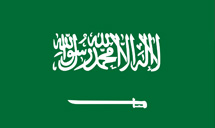
Hamas officials held meetings in July 2015 with the Saudi leadership in what some analysts suspect were attempts to sway Hamas away from Iran and built a Sunni coalition against the Persian country.David D. Kirkpatrick and Ben Hubbard, “King Salman of Saudi Arabia Meets With Hamas Leaders,” New York Times, July 17, 2015, http://www.nytimes.com/2015/07/18/world/middleeast/king-salman-of-saudi-arabia-meets-with-hamas-leaders.html. Also that summer, Saudi Arabia also reportedly attempted to mediate reconciliation between Hamas and Egypt.“Egypt rejects Saudi mediation to restore relations with Hamas,” Middle East Monitor, July 21, 2015, https://www.middleeastmonitor.com/news/africa/19932-egypt-rejects-saudi-mediation-to-restore-relations-with-hamas; “Hamas plans another visit to Saudi and improved relations with Egypt,” Middle East Monitor, July 27, 2015, https://www.middleeastmonitor.com/news/middle-east/20051-hamas-plans-another-visit-to-saudi-and-improved-relations-with-egypt. In August 2015, citing Hamas meetings with Saudi Arabia’s king and meetings with Egyptian leaders, Hamas officials told Israel’s Haaretz newspaper that the group had been successfully elevating its international status.Jack Khoury, “Hamas Considers Gaza War a Failure, Favors Diplomacy,” Haaretz (Tel Aviv), August 6, 2015, http://www.haaretz.com/beta/.premium-1.669751.

Syria has long acted as a conduit between Hamas and its Iranian benefactor, allowing weapons and money to cross its borders. Hamas’s political leadership was based in Damascus until 2012, when it relocated due to the ongoing Syrian civil war.“Hamas Political Chiefs Exit Syria,” BBC News, February 28, 2012, http://www.bbc.co.uk/news/world-middle-east-17192278. On June 21, 2022, Reuters reported unidentified Hamas officials confirmed the group had decided to restore its ties with Syria and the two sides had held high-level meetings.“Hamas to restore Syria ties after 10 years of dispute, sources say,” Reuters, June 21, 2022, https://www.reuters.com/world/middle-east/hamas-restore-syria-ties-after-10-years-dispute-sources-say-2022-06-21/. Those overtures resulted in an October 19, 2022, meeting in Damascus between a Hamas delegation and Syrian President Bashar al-Assad on restoring relations between Hamas and Syria. Hamas and Assad agreed to move past their previous disagreements while the Hamas delegation called the meeting a new start for joint Palestinian-Syrian work in a welcoming Syrian environment.“Hamas leaders meet Assad in Damascus to 'turn the page,’” Reuters, October 19, 2022, https://www.reuters.com/world/middle-east/hamas-leaders-meet-assad-damascus-turn-page-2022-10-19/; “Hamas concludes historic visit to Syria,” Hamas, October 19, 2022, https://hamas.ps/en/post/4351/Hamas-concludes-historic-visit-to-Syria; Agence France-Presse, “US Denounces Syria-Hamas Reconciliation,” Barron’s, October 20, 2022, https://www.barrons.com/news/us-denounces-syria-hamas-reconciliation-01666297206?refsec=topics_afp-news.

Hamas is designated as a terrorist organization by the U.S. government, which has refused to recognize the legitimacy of the Hamas government in Gaza. Since Hamas and the PLO signed a unity deal in April 2014, however, the U.S. State Department announced its willingness to work with a unity government, as the cabinet is made up of technocrats unaffiliated with Hamas.Lesley Wroughton and Patricia Zengerle, “U.S. Says to Work With, Fund Palestinian Unity Government,” Reuters, June 2, 2014, http://www.reuters.com/article/2014/06/02/us-palestinian-unity-usa-idUSKBN0ED1VQ20140602. Members of the U.S. Congress have since called for cutting U.S. aid to the Palestinian Authority because of the unity deal.Lesley Wroughton and Patricia Zengerle, “U.S. Says to Work With, Fund Palestinian Unity Government,” Reuters, June 2, 2014, http://www.reuters.com/article/2014/06/02/us-palestinian-unity-usa-idUSKBN0ED1VQ20140602.
Former U.S. President Jimmy Carter met with Hamas’s political chief Khaled Meshaal in 2008 in an attempt to broker peace. During a press conference, Meshaal said Hamas accepts a Palestinian state with the June 4, 1967, borders with east Jerusalem as its capital.“Hamas: No Plan to Recognize Israel,” CNN, April 21, 2008, http://edition.cnn.com/2008/WORLD/meast/04/21/carter.hamas/index.html. Meshaal also offered Israel a 10-year hudna, which he told Carter was proof of Hamas’s tacit recognition of Israel.“Hamas Offers Truce in Return for 1967 Borders,” Associated Press, April 21, 2008, http://www.nbcnews.com/id/24235665/ns/world_news-mideast_n_africa/t/hamas-offers-truce-return-borders/#.U-0eFYBdV5w. Meshaal and other Hamas leaders have since denied agreeing to the 1967 lines.

In March 2014, Iranian parliament speaker Ali Larijani announced the restoration of ties between Hamas and Iran and that Iran continues to support Hamas as a “resistance organization.”Elhanan Miller, “Hamas and Iran Admit Increased Cooperation,” Times of Israel, March 12, 2014, http://www.timesofisrael.com/hamas-and-iran-admit-increased-cooperation/. During the July 2014 Hamas-Israel conflict, Iranian officials admitted that Iran had transferred technology to Hamas to allow the terror group to build its own rockets. “Once upon a time, they [Hamas] needed the arms manufacture know-how and we gave it to them” and Hamas can now “meet their own needs for weapons,” Larijani said.Agence France-Presse, “Iran gave Hamas its rocket know-how, official boasts,” Yahoo News, July 24, 2014, http://news.yahoo.com/iran-gave-hamas-rocket-know-official-boasts-190726914.html.
On August 5, 2021, Hamas leader Ismail Haniyeh attended the inauguration of Iranian President Ebrahim Raisi in Tehran.Aaron Boxerman, “Hamas, Islamic Jihad leaders arrive in Tehran for Iran president’s inauguration,” Times of Israel, August 5, 2021, https://www.timesofisrael.com/liveblog_entry/hamas-islamic-jihad-leaders-arrive-in-tehran-for-iran-presidents-inauguration/. On May 12, 2023, Iranian Foreign Minister Hossein Amir-Abdollahian called Haniyeh to express Raisi’s continued solidarity with Hamas. Haniyeh thanked him for Iran’s ongoing support of Hamas. “Hamas head receives phone call from Iran's foreign affairs minister,” Hamas, May 12, 2023, https://hamas.ps/en/post/4724/Hamas-head-receives-phone-call-from-Iran-s-foreign-affairs-minister.

Russia is a member of the Quartet of Middle East Peacemakers and has signed on to the Quartet’s demands that Hamas recognize Israel, renounce terrorism, and accept past agreements before it receives international recognition. Russia has attempted to push Hamas toward these goals by inviting Hamas government representatives to Moscow for official meetings.
In March 2006, a Hamas delegation visited Moscow for three days of meetings with Russian officials, including Foreign Minister Sergey Lavrov.Steven Lee Myers and Greg Myre, “Hamas Delegation Visits Moscow for a Crash Course in Diplomacy,” New York Times, March 4, 2006, http://www.nytimes.com/2006/03/04/international/middleeast/04hamas.html. It was the first Hamas state visit outside of the Islamic world since Hamas joined the Palestinian Authority. Hamas viewed the invitation as a way to foil American and Israeli attempts to isolate it, while Russian officials used the visit to try to convince Hamas to accept the Quartet’s demands of recognizing Israel, renouncing violence, and accepting past agreements.Steven Lee Myers and Greg Myre, “Hamas Delegation Visits Moscow for a Crash Course in Diplomacy,” New York Times, March 4, 2006, http://www.nytimes.com/2006/03/04/international/middleeast/04hamas.html.
In May 2010, Russian President Dmitry Medvedev met with Hamas political chief Khaled Meshaal in Damascus. Israel condemned the meeting, during which Medvedev called for the release of captured Israeli soldier Gilad Shalit and for Hamas to reconcile with Fatah.“Israeli ‘Disappointment’ over Russia-Hamas Meeting,” CNN, May 13, 2010, http://www.cnn.com/2010/WORLD/meast/05/13/israel.russia.hamas/.
In response to Israeli criticism, Russian Foreign Ministry spokesman Andrei Nesterenko said his country has “regular” contacts with Hamas, and “all other members of the Quartet on the Middle East maintain contacts with Hamas leaders in one way or another, although they are reluctant to admit this publicly, for some reason.” During a November 2015 press conference, Russian Deputy Foreign Minister Mikhail Bogdanov called Hezbollah and Hamas “legitimate societal-political forces.”“Russia Says Hezbollah, Hamas Aren't Terrorist Groups,” Moscow Times, November 16, 2015, http://www.themoscowtimes.com/news/article/russia-says-hezbollah-hamas-arent-terrorist-groups/549136.html.

In 2012, the emir of Qatar became the first head of state to visit Gaza after Hamas’s 2007 coup.“Emir of Qatar Become First Head of State to Visit Gaza since Hamas Took Control,” Huffington Post UK, October 23, 2012, http://www.huffingtonpost.co.uk/2012/10/23/emir-of-qatar-historic-visit-to-hamas-gaza_n_2004960.html. Since then, Qatar has invested hundreds of millions of dollars into Gaza, pledging $400 million to Gaza in 2012.“Qatar Ups Gaza Investment to $400 Million,” Agence France-Presse, October 23, 2012, http://http://tribune.com.pk/story/455921/hamas-qatar-ups-gaza-investment-to-400-million/. After Hamas and Fatah signed a reconciliation agreement in April 2014, the PA refused to pay the salaries of Hamas civil servants in Gaza, and in response Qatar attempted to transfer hundreds of millions of dollars to Hamas to pay the salaries of 44,000 civil servants, but the United States reportedly blocked the transfers.Elhanan Miller, “US Blocked Qatari Funds Intended for Hamas Employees,” Times of Israel, July 15, 2014, http://www.timesofisrael.com/us-blocked-qatari-funds-intended-for-hamas-employees/.

During the summer of 2015, Hamas officials held meetings with King Salman and other Saudi leaders.Elhanan Miller, “In Hamas’s embrace of Sunni Saudi Arabia, a slap to Iran,” Times of Israel, July 21, 2015, https://www.timesofisrael.com/in-hamass-embrace-of-sunni-saudi-arabia-a-slap-to-iran/. Observers viewed Salman’s meetings with Hamas an attempt to sway the terror group away from Iran’s influence.David D. Kirkpatrick and Ben Hubbard, “King Salman of Saudi Arabia Meets with Hamas Leaders,” New York Times, July 17, 2015, https://www.nytimes.com/2015/07/18/world/middleeast/king-salman-of-saudi-arabia-meets-with-hamas-leaders.html.

Turkish Prime Minister Recep Tayyip Erdoğan’s ruling Justice and Development Party supports what analysts call “other neo-Islamist allies.”Mirren Gidda, “Hamas Still Has Some Friends Left,” Time, July 25, 2014, http://time.com/3033681/hamas-gaza-palestine-israel-egypt/. This has resulted in Turkey investing millions of dollars into Gaza’s Hamas government, (detailed in the financial support section). Turkey reportedly planned to donate $300 million to Gaza’s Hamas government in 2011,Saed Bannoura, “Turkey to Grant Hamas $300 Million,” International Middle East Media Center, December 3, 2011, http://www.imemc.org/article/62607. while other reports cited that this would become an annual donation to Hamas.Zvi Bar’el, “Turkey May Provide Hamas with $300 Million in Annual Aid,” Haaretz, January 28, 2012, http://www.haaretz.com/news/diplomacy-defense/turkey-may-provide-hamas-with-300-million-in-annual-aid-1.409708. During the July 2014 conflict between Hamas and Israel, Qatar and Turkey were considered Hamas’s closest international allies. Mirren Gidda, “Hamas Still Has Some Friends Left,” Time, July 25, 2014, http://time.com/3033681/hamas-gaza-palestine-israel-egypt/; Jonathan Schanzer, “Hamas’s BFFs,” Foreign Policy, August 4, 2014, http://www.foreignpolicy.com/articles/2014/08/04/hamas_s_bffs_turkey_qatar_israel_gaza?wp_login_redirect=0.
In May 2006, after Hamas won Palestinian Authority legislative elections, Sweden granted a visa to PA Refugee Minister Atef Adawan, a Hamas member, to attend a conference in Sweden. After the conference, Adawan allegedly traveled to Norway where he met with Kaare Eltervaag, the head of the Norwegian Foreign Ministry's Middle Eastern affairs. Afterward, he traveled to Germany where he met with Bundestag representative Detlef Dzembritzki, a member of the Social Democratic Party.“Hamas Minister meets German MEP thanks to Swedish visa,” European Jewish Congress, May 18, 2006, http://www.eurojewcong.org/20/480-hamas-minister-meets-german-mep-thanks-to-swedish-visa.html.
Extremists: Their Words. Their Actions.
Fact:
On May 8, 2019, Taliban insurgents detonated an explosive-laden vehicle and then broke into American NGO Counterpart International’s offices in Kabul. At least seven people were killed and 24 were injured.
Get the latest news on extremism and counter-extremism delivered to your inbox.